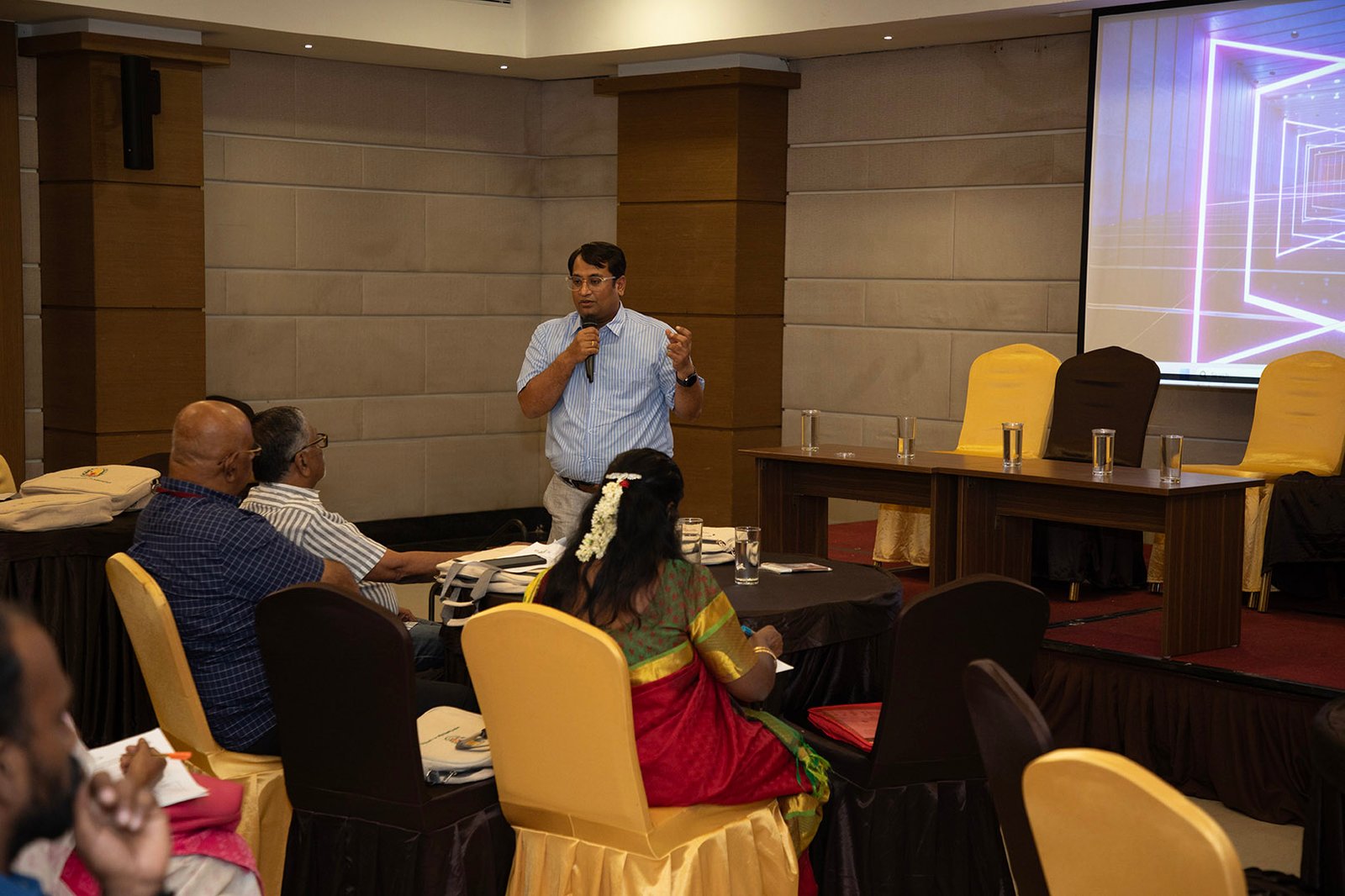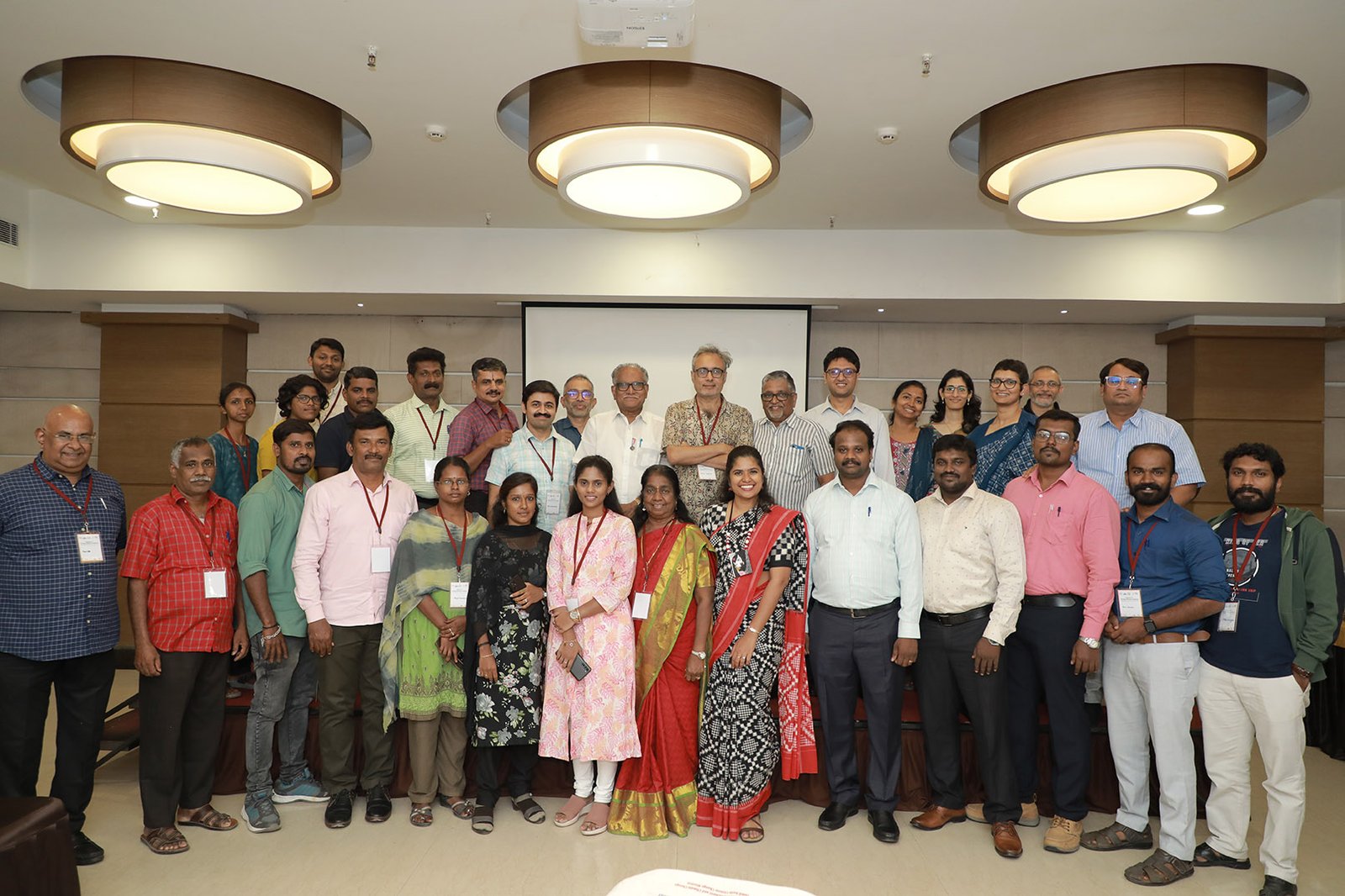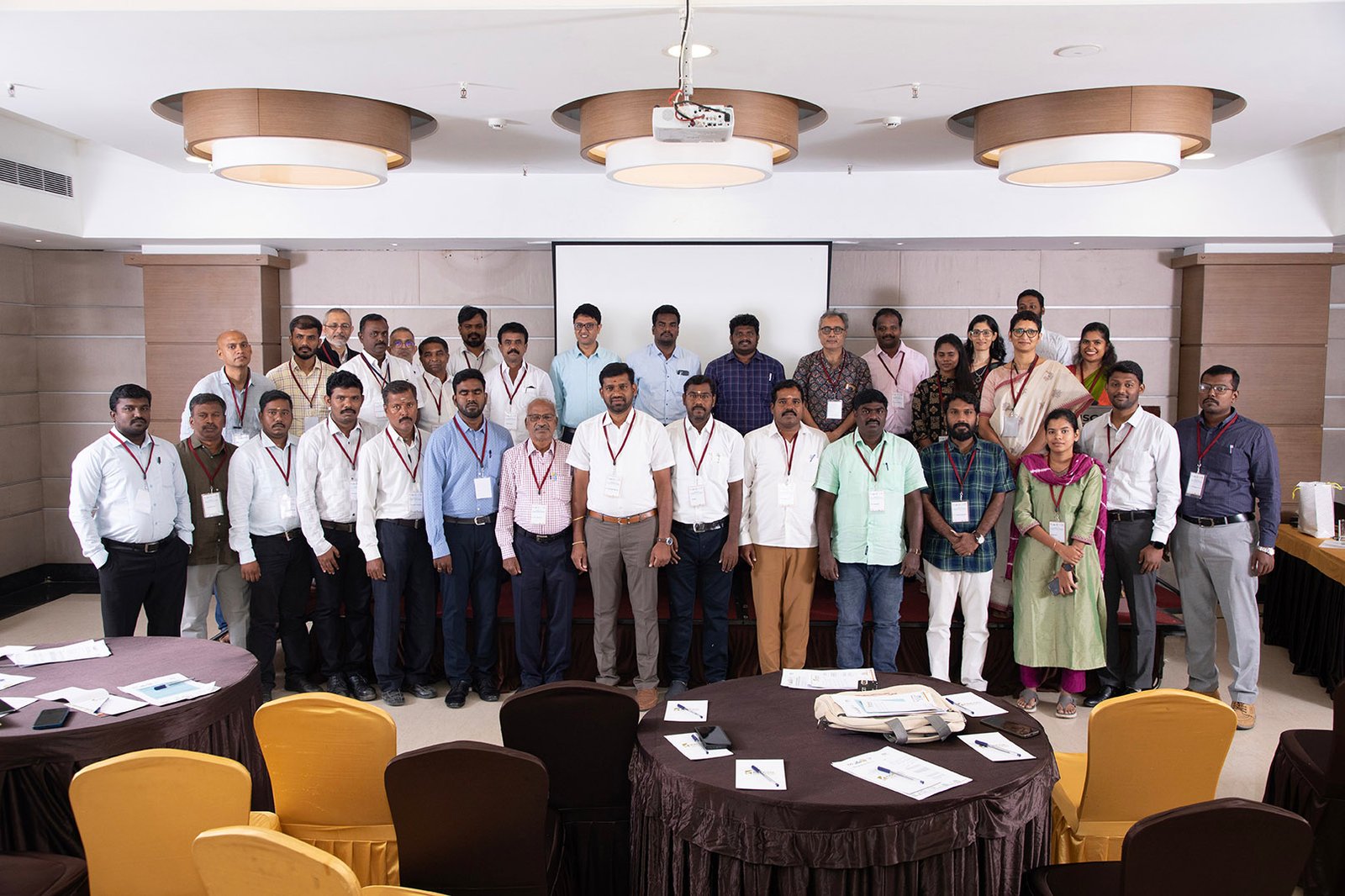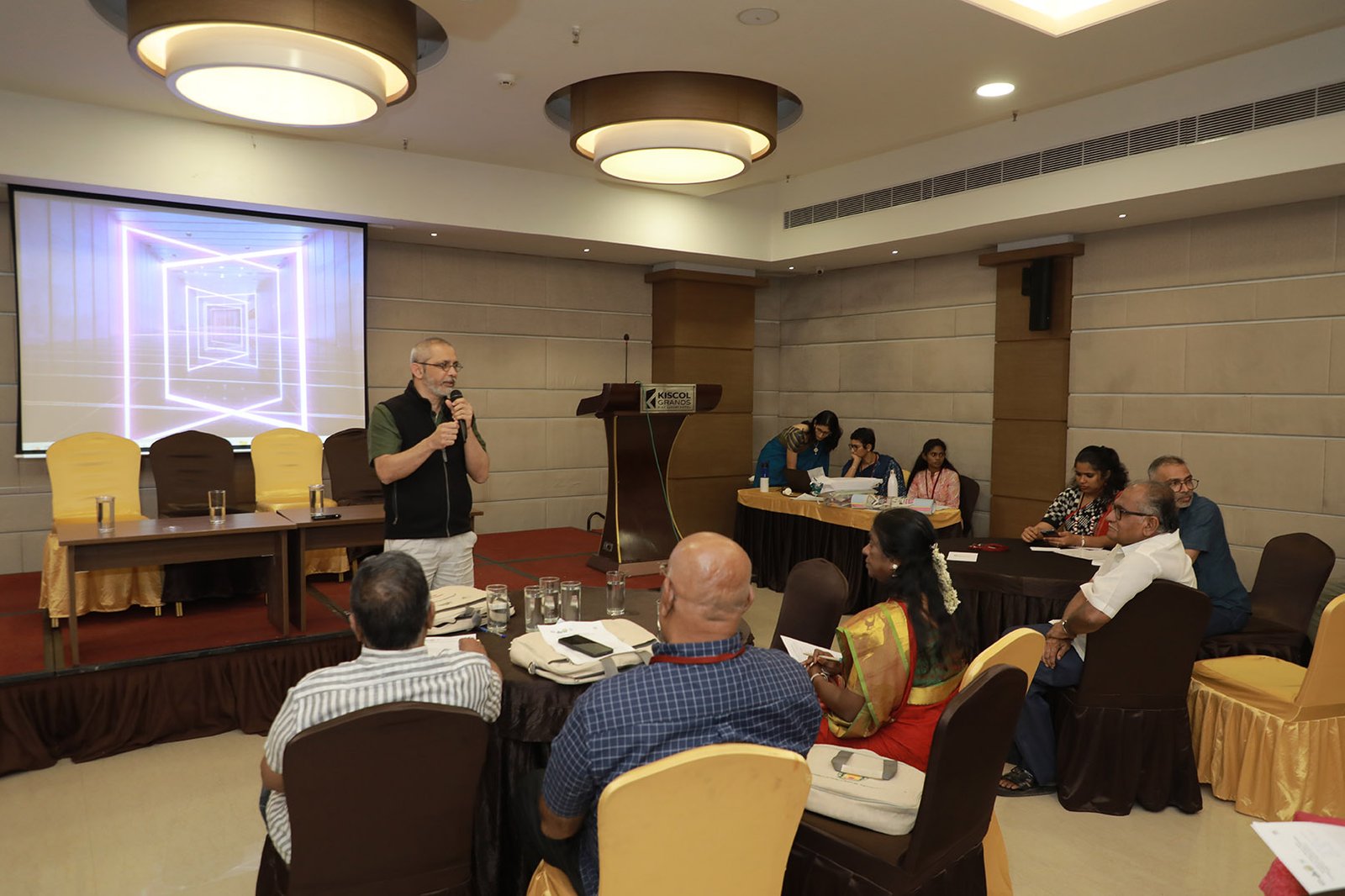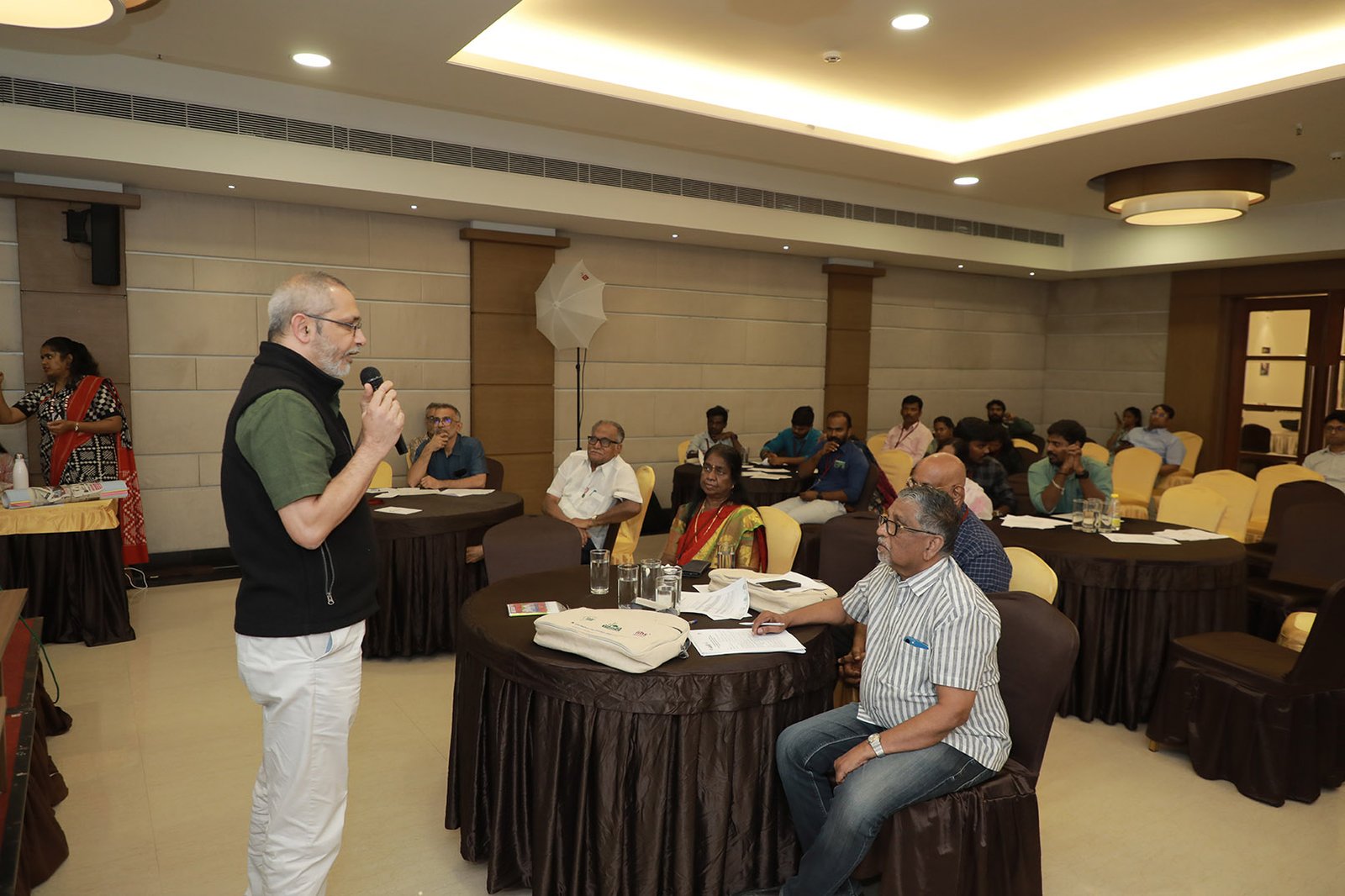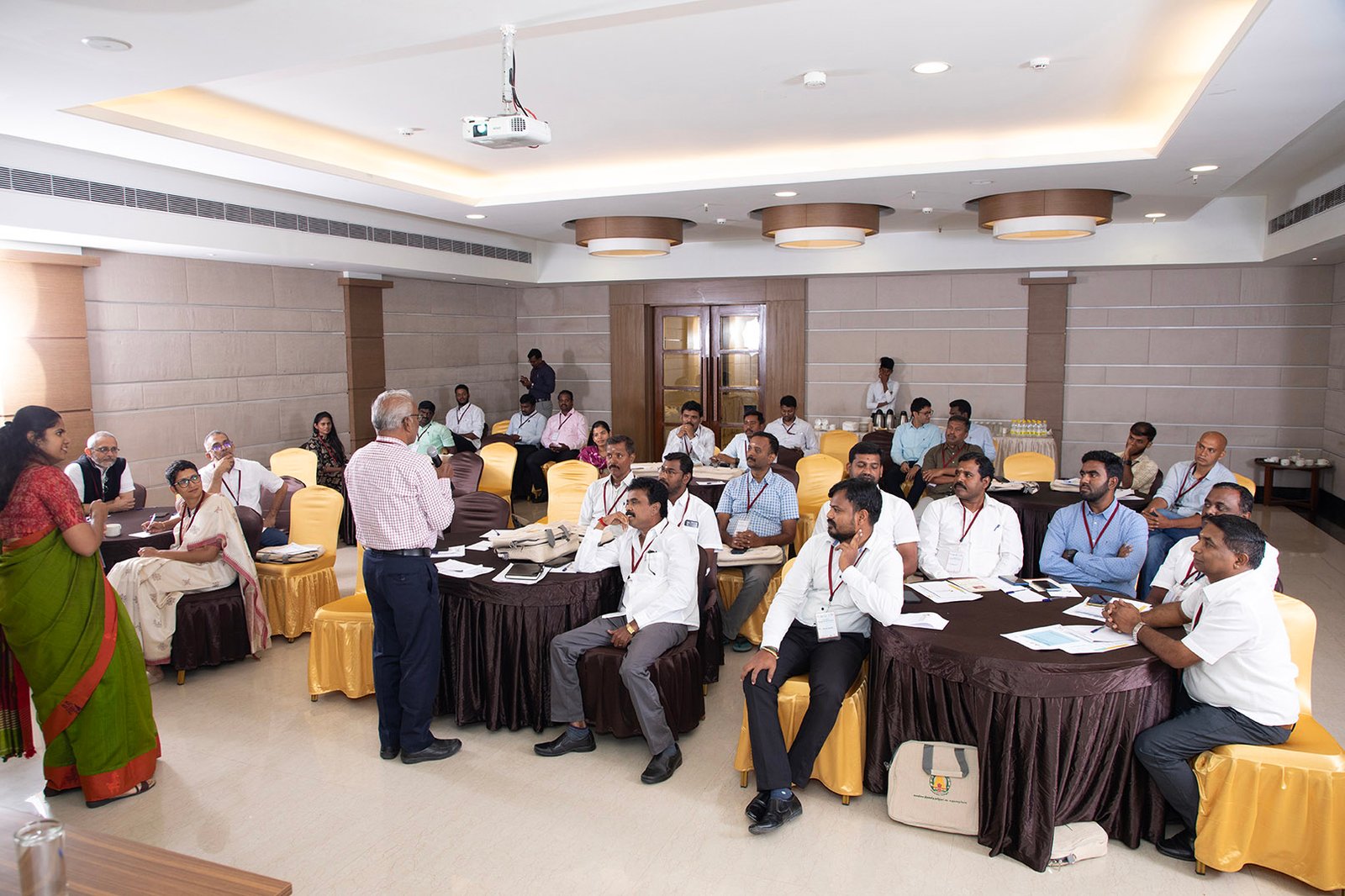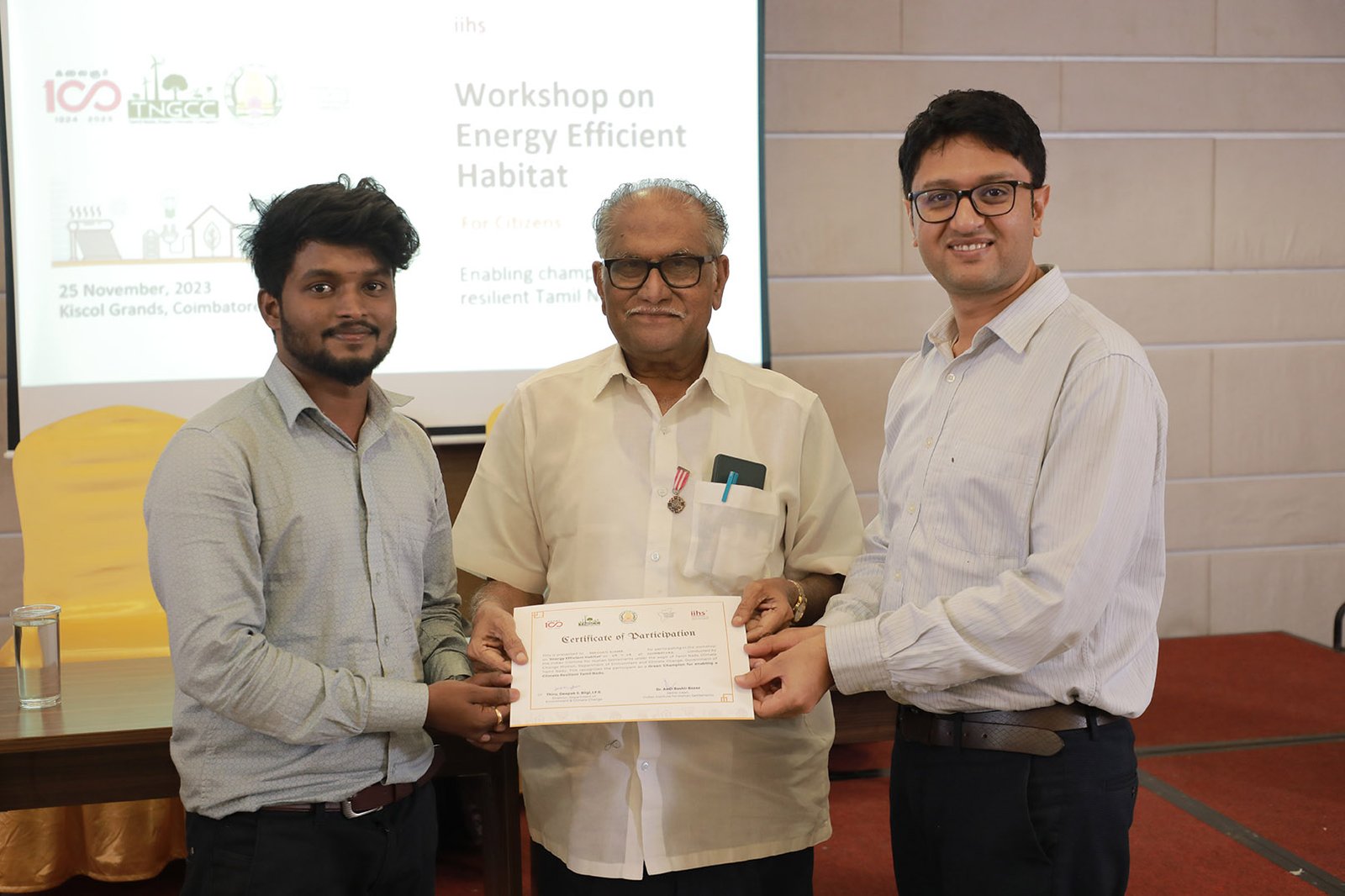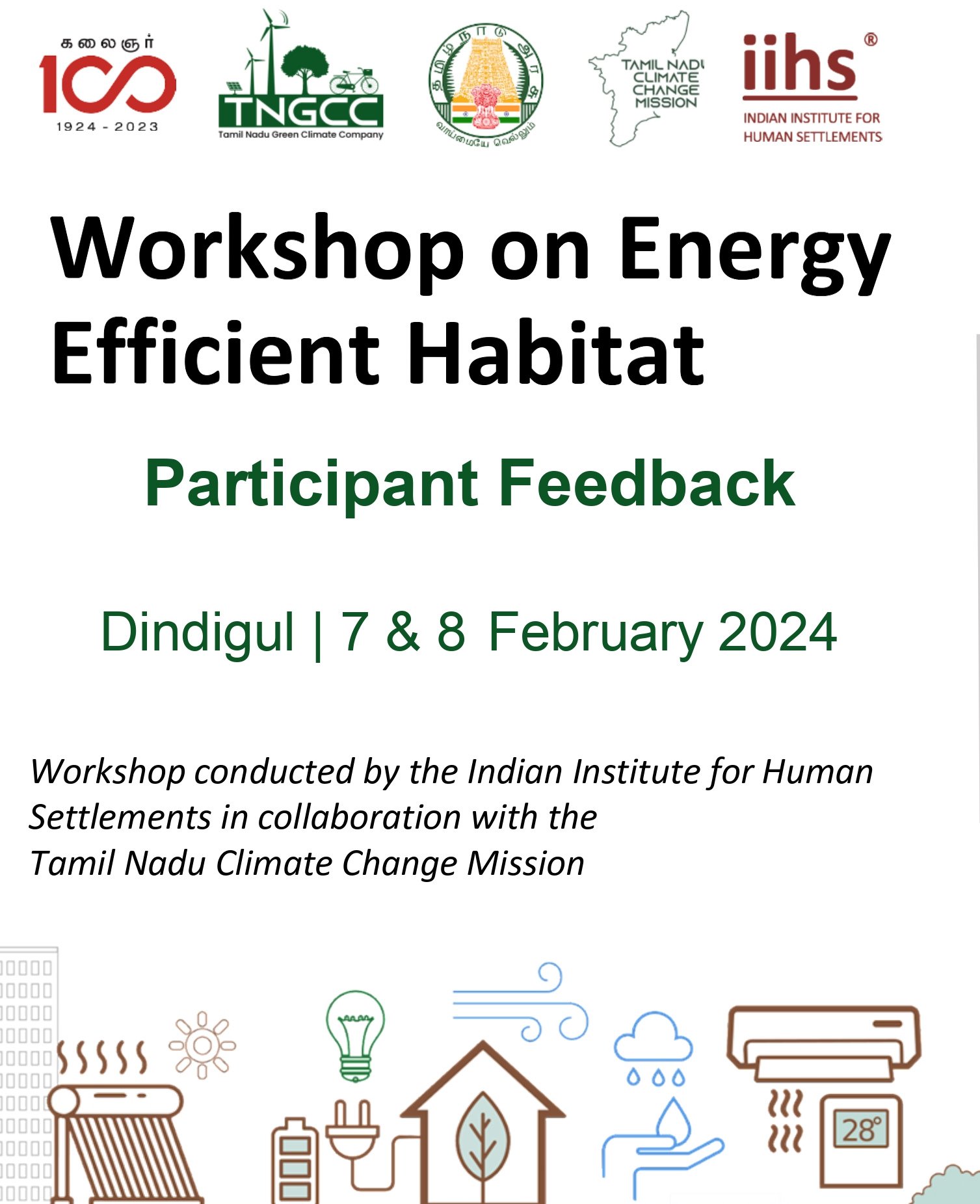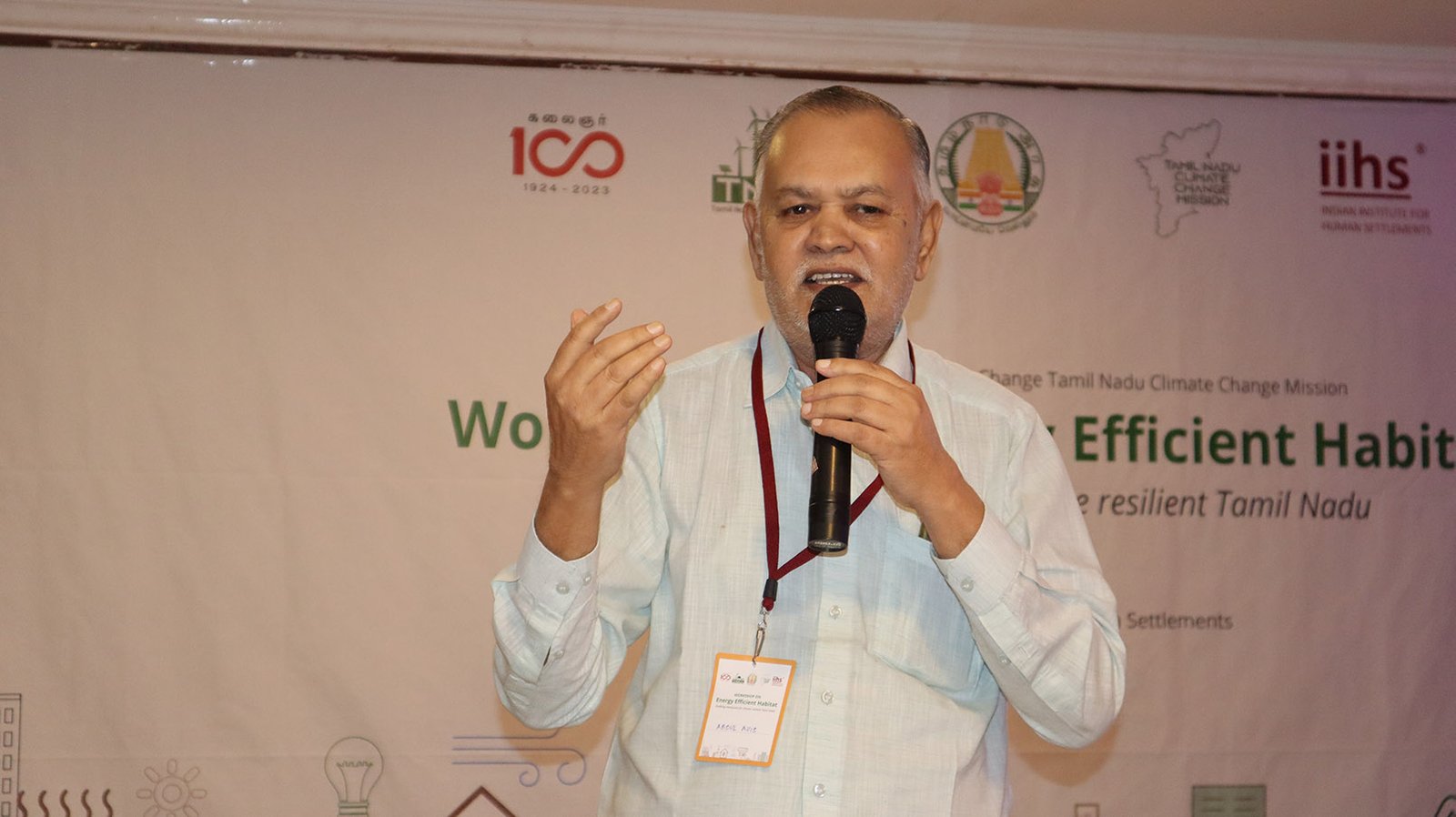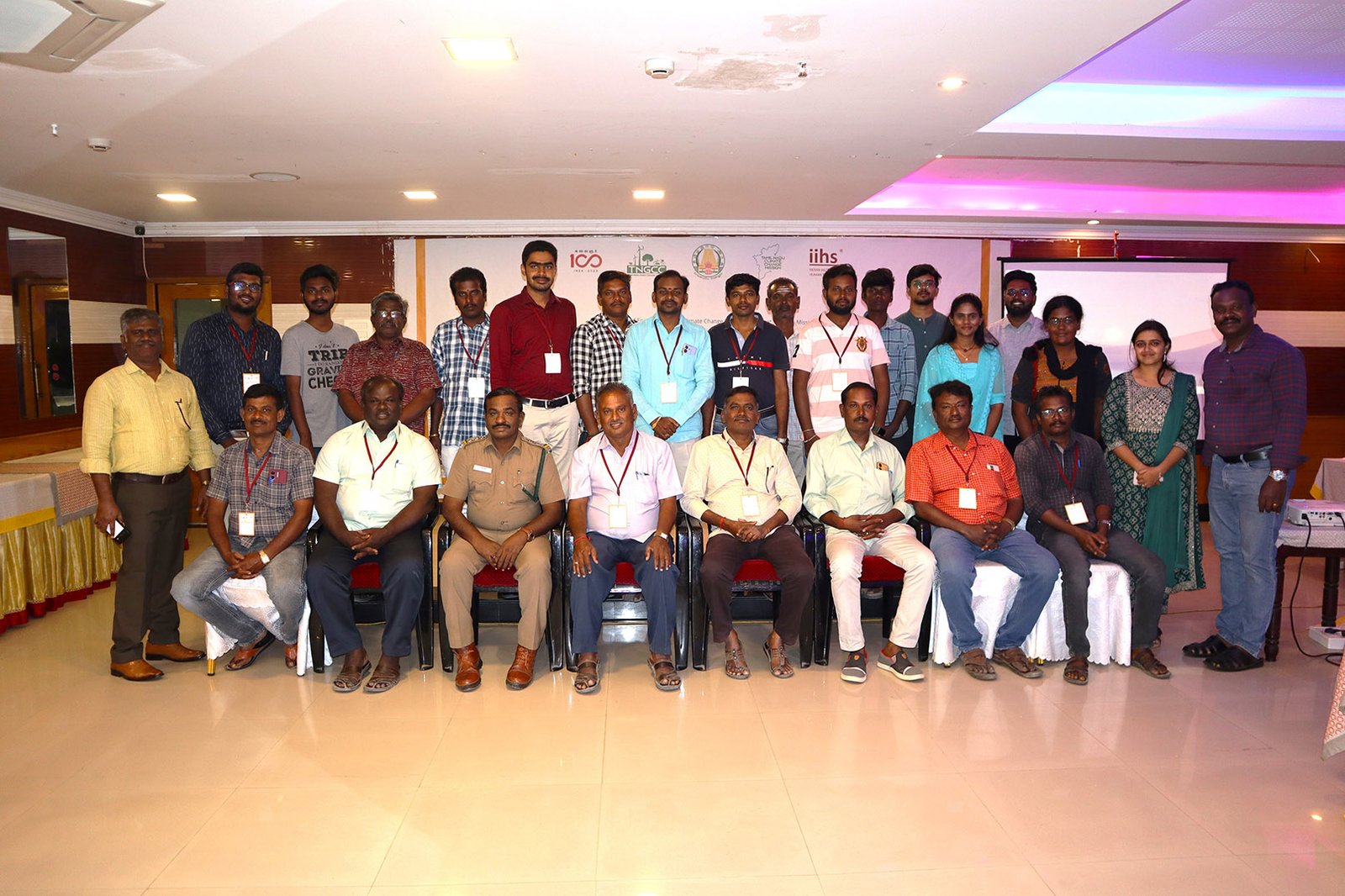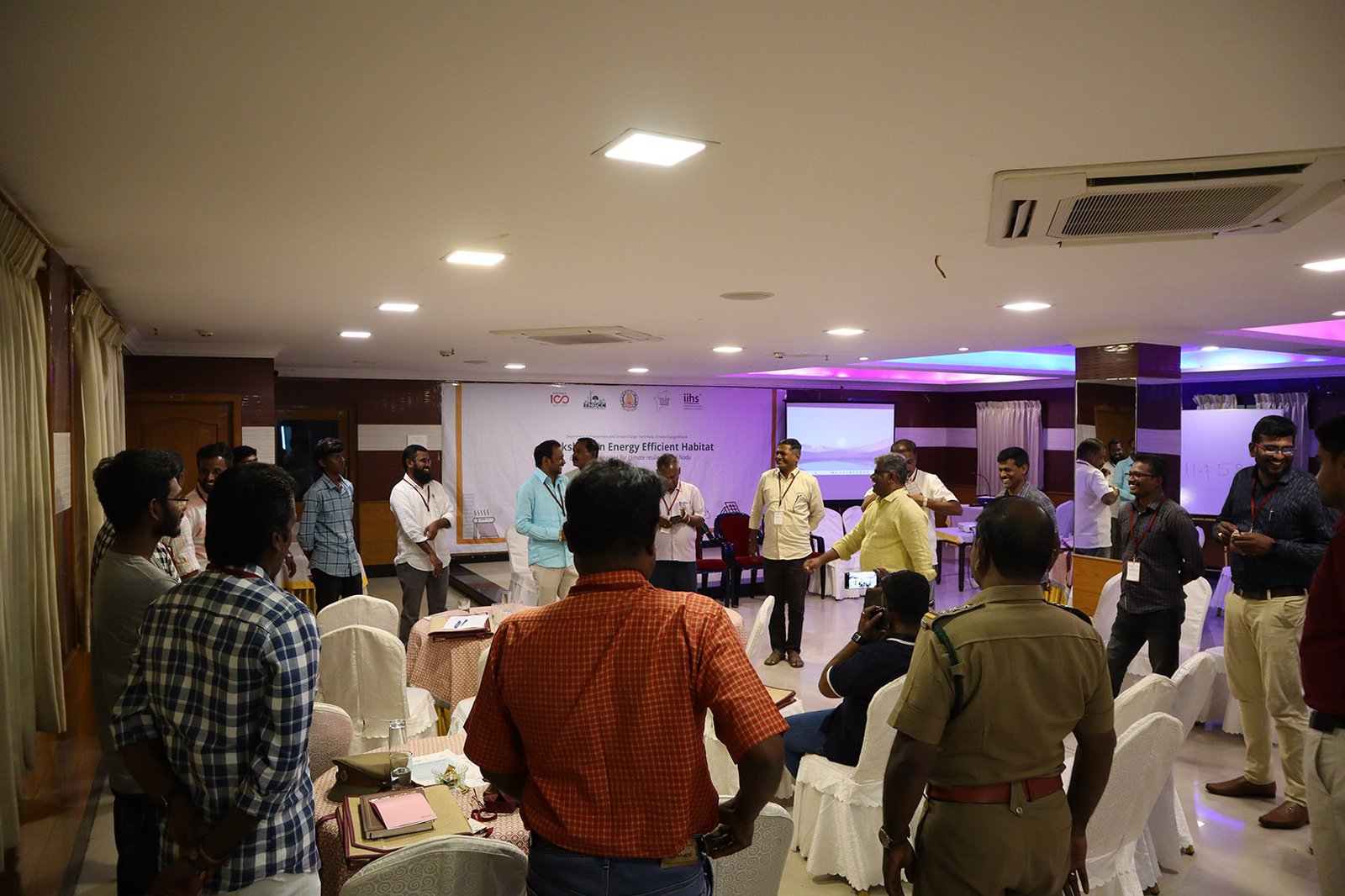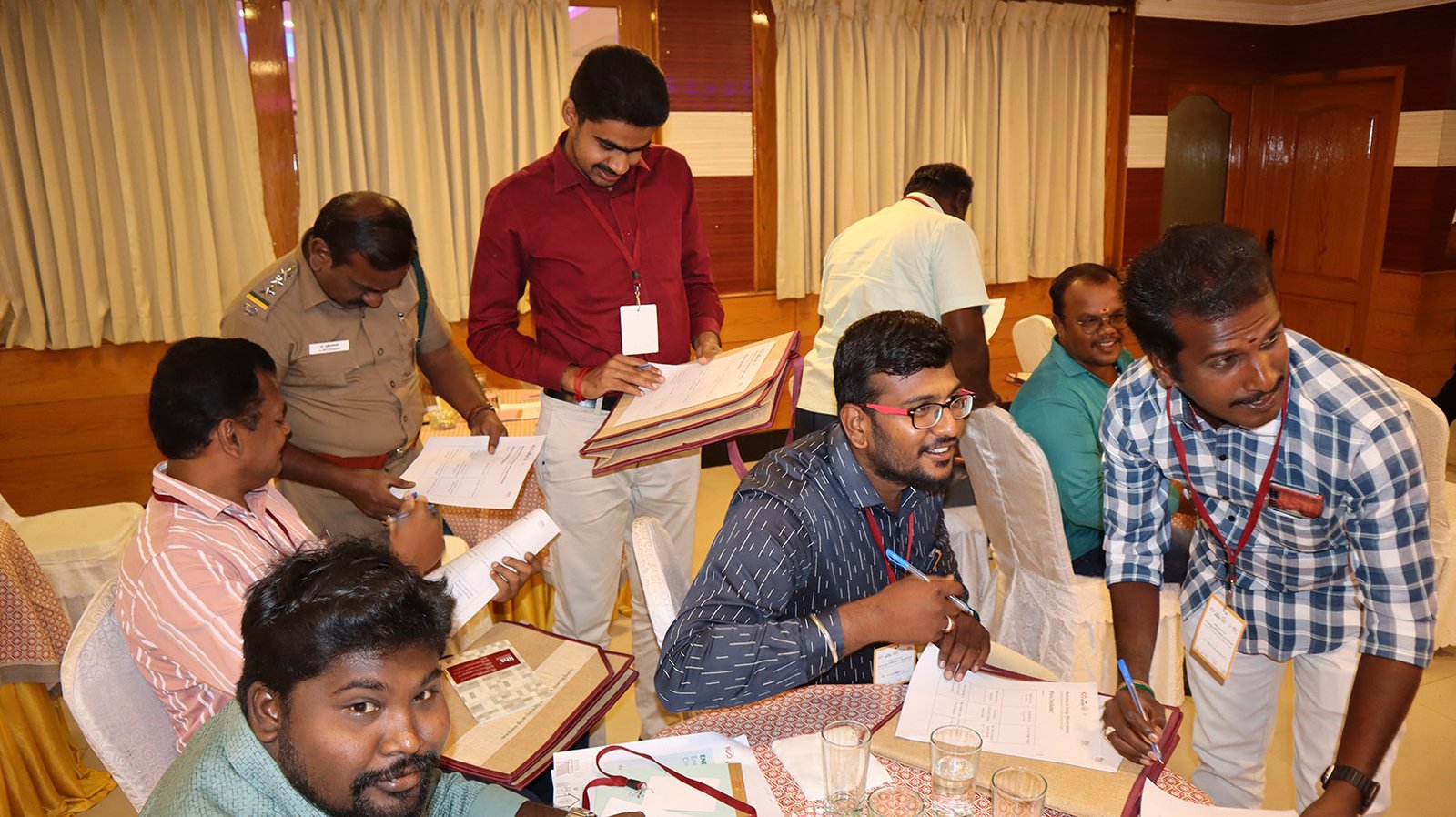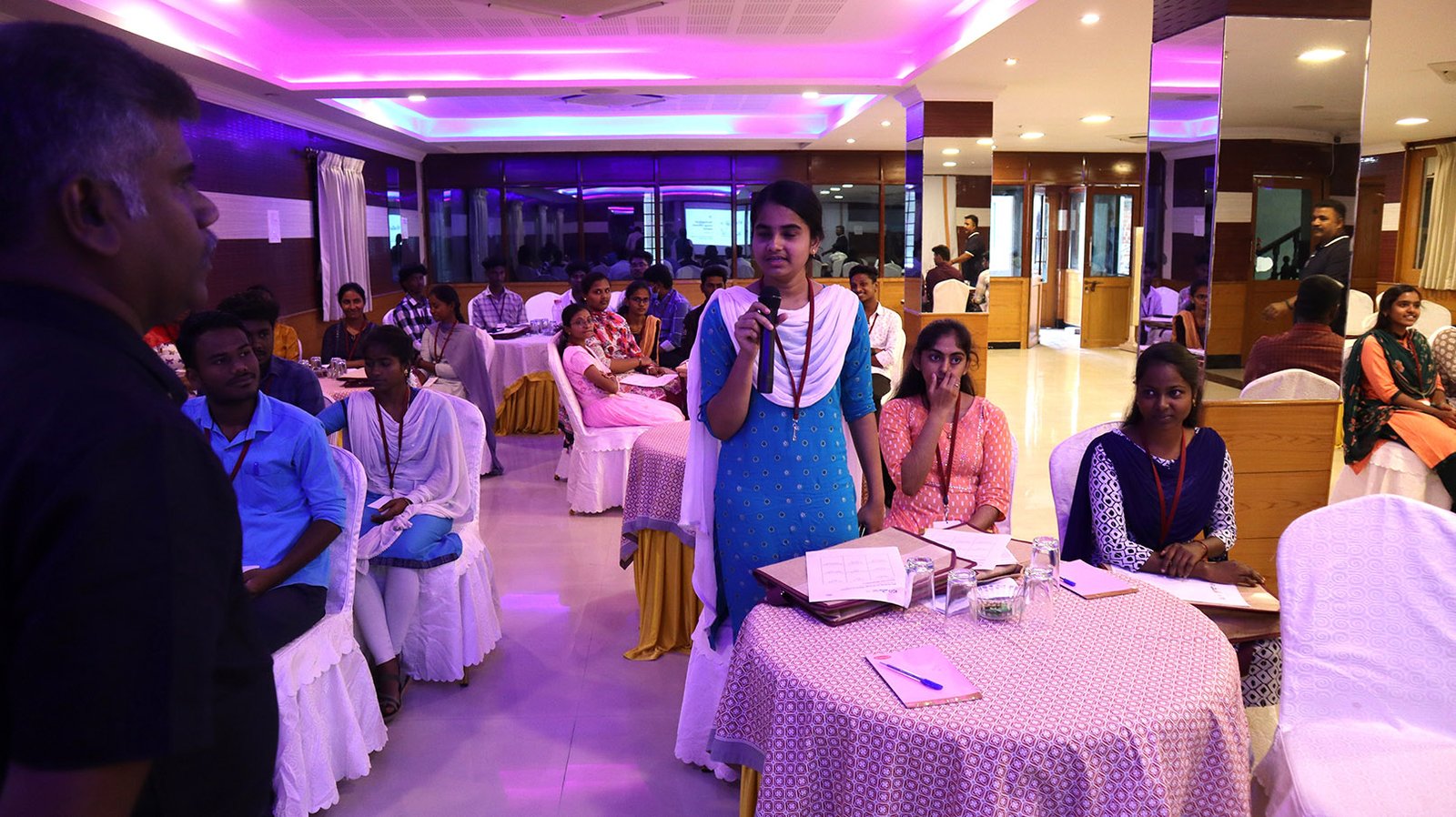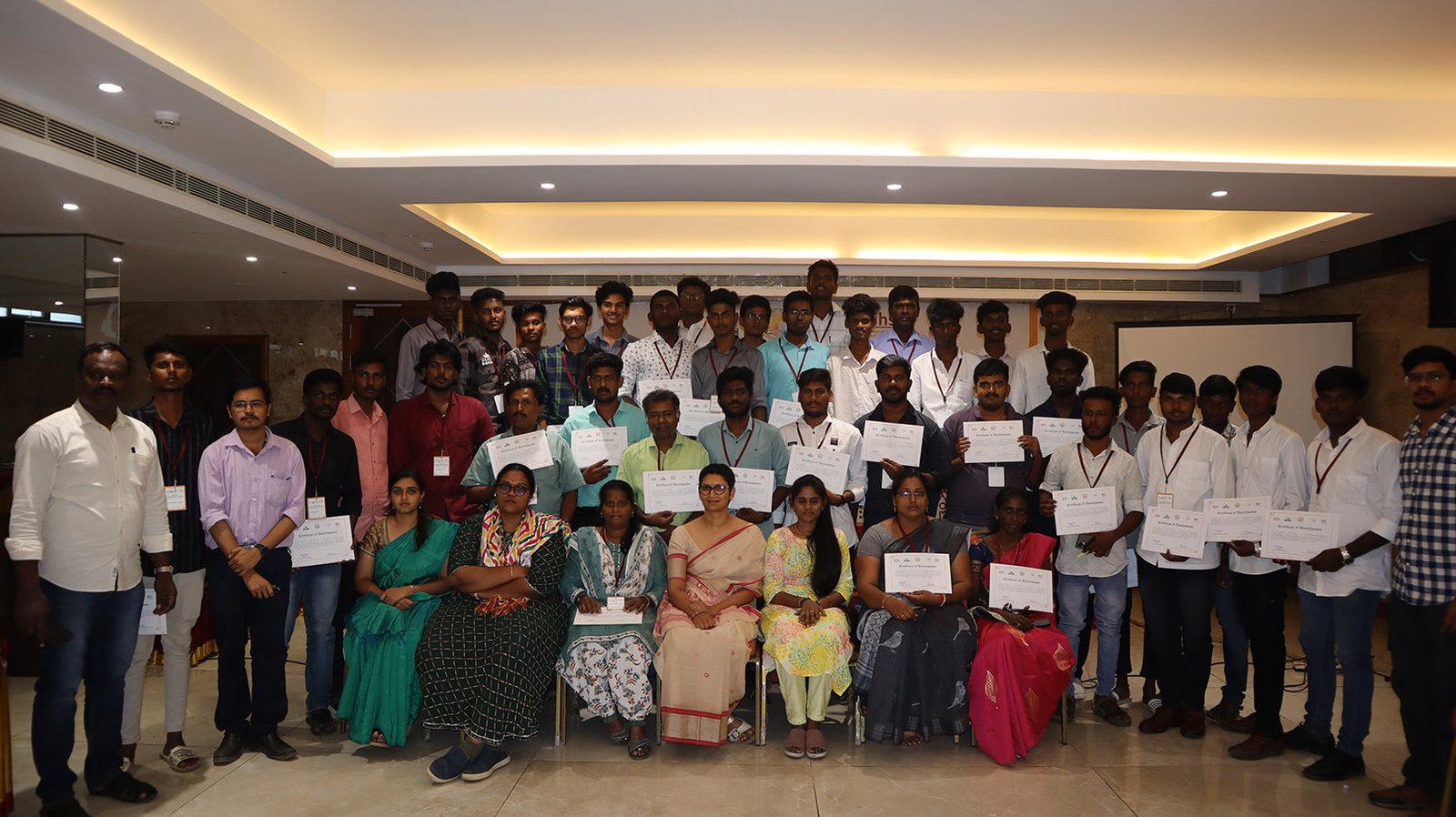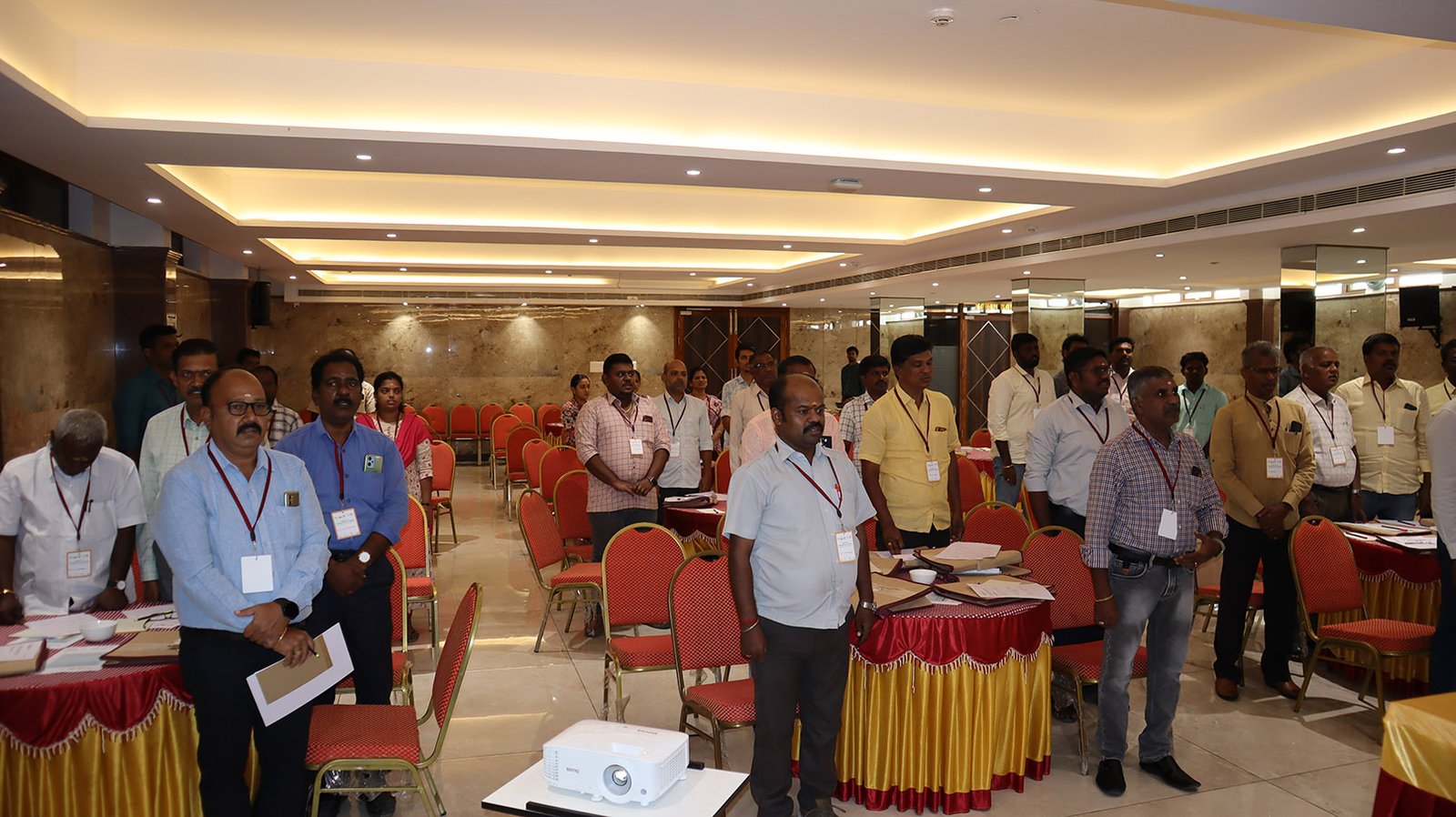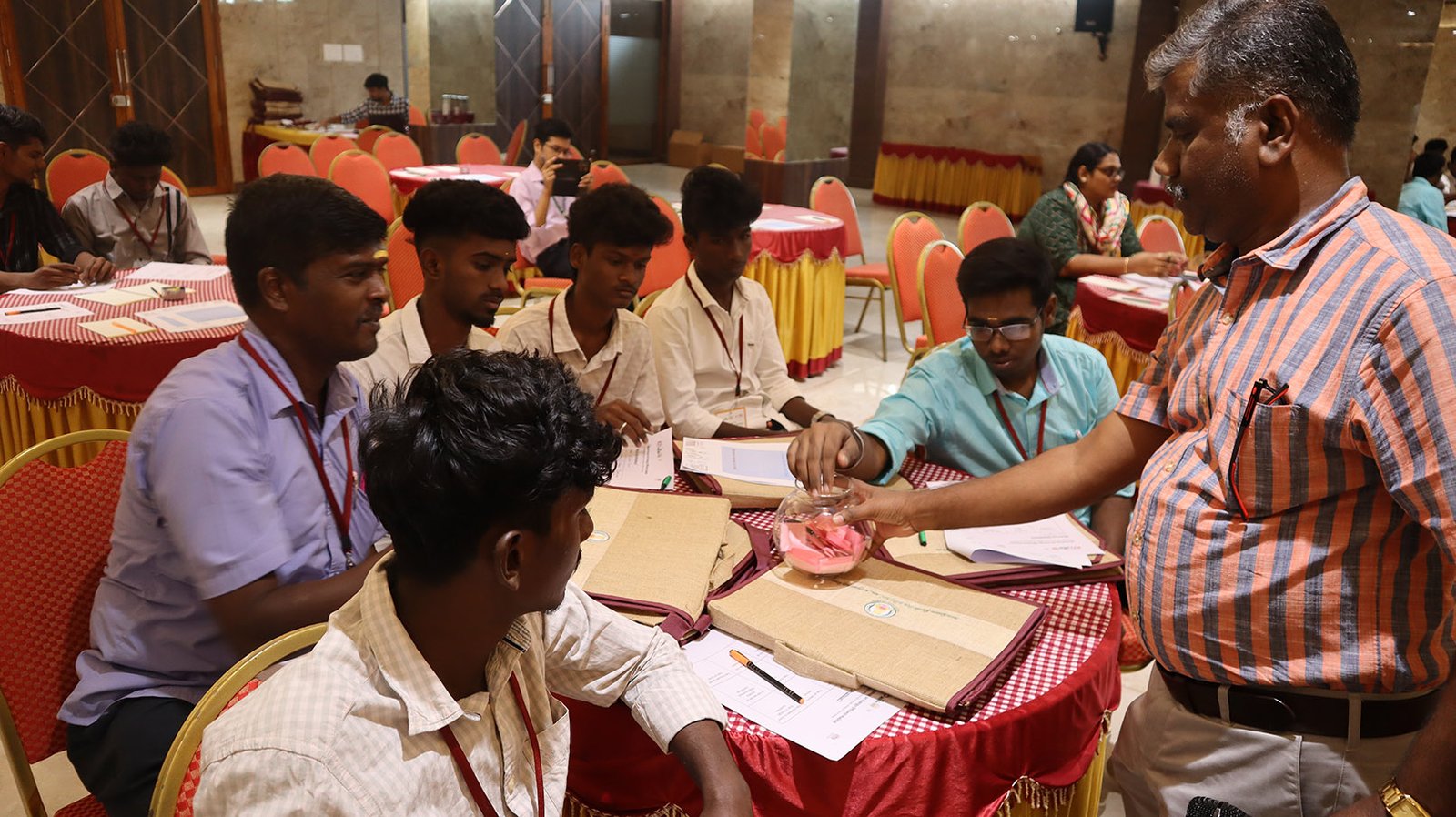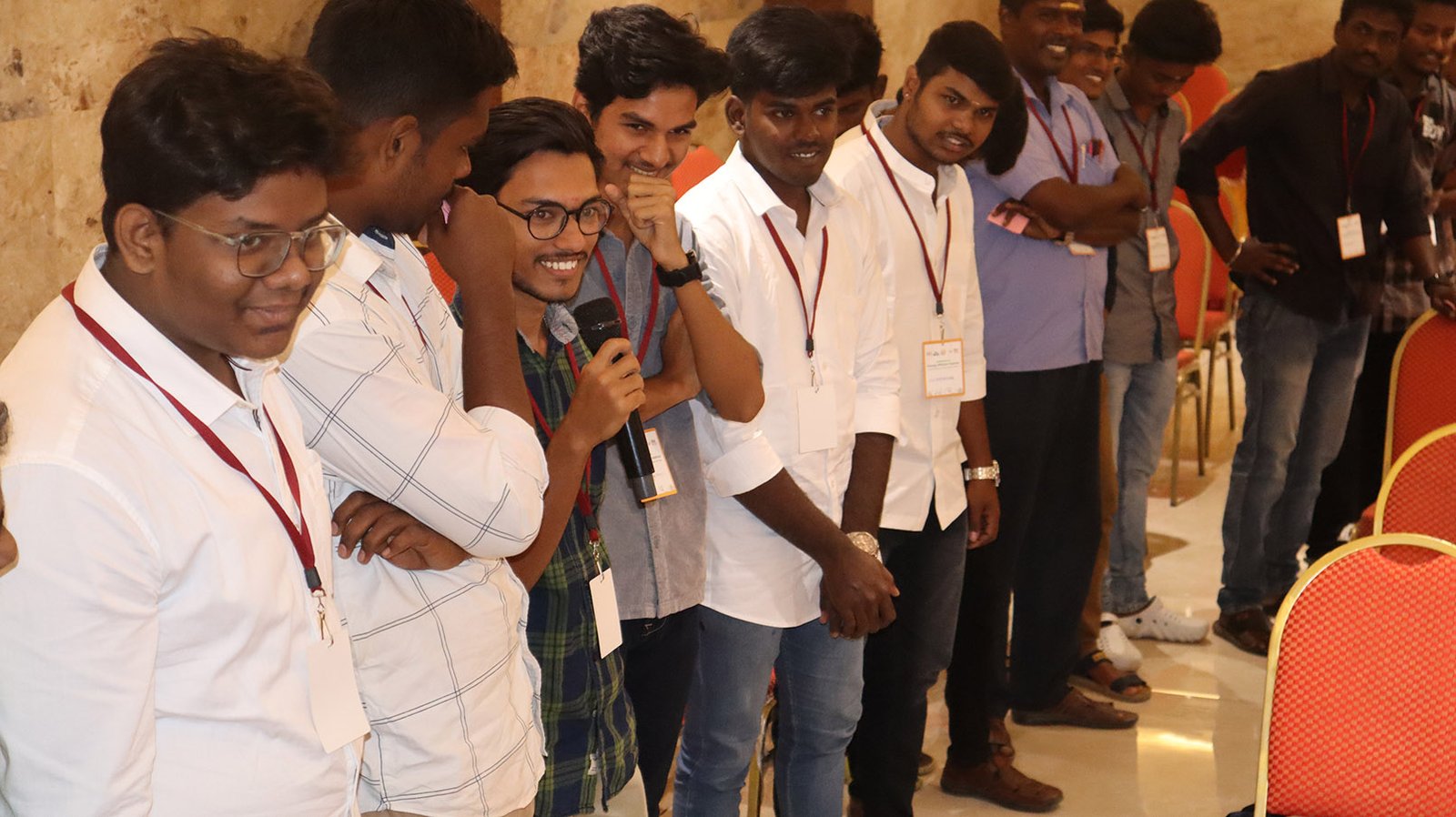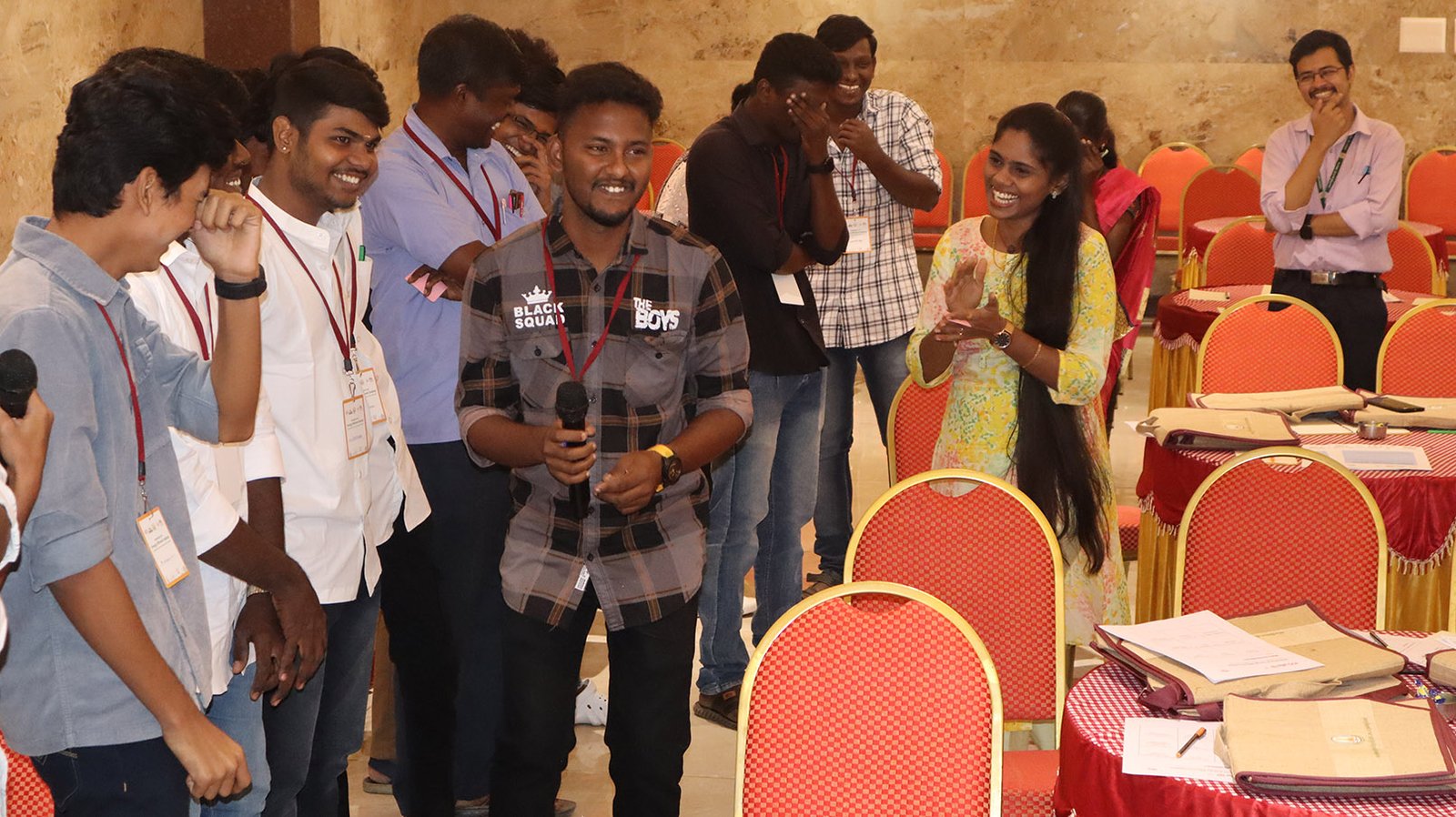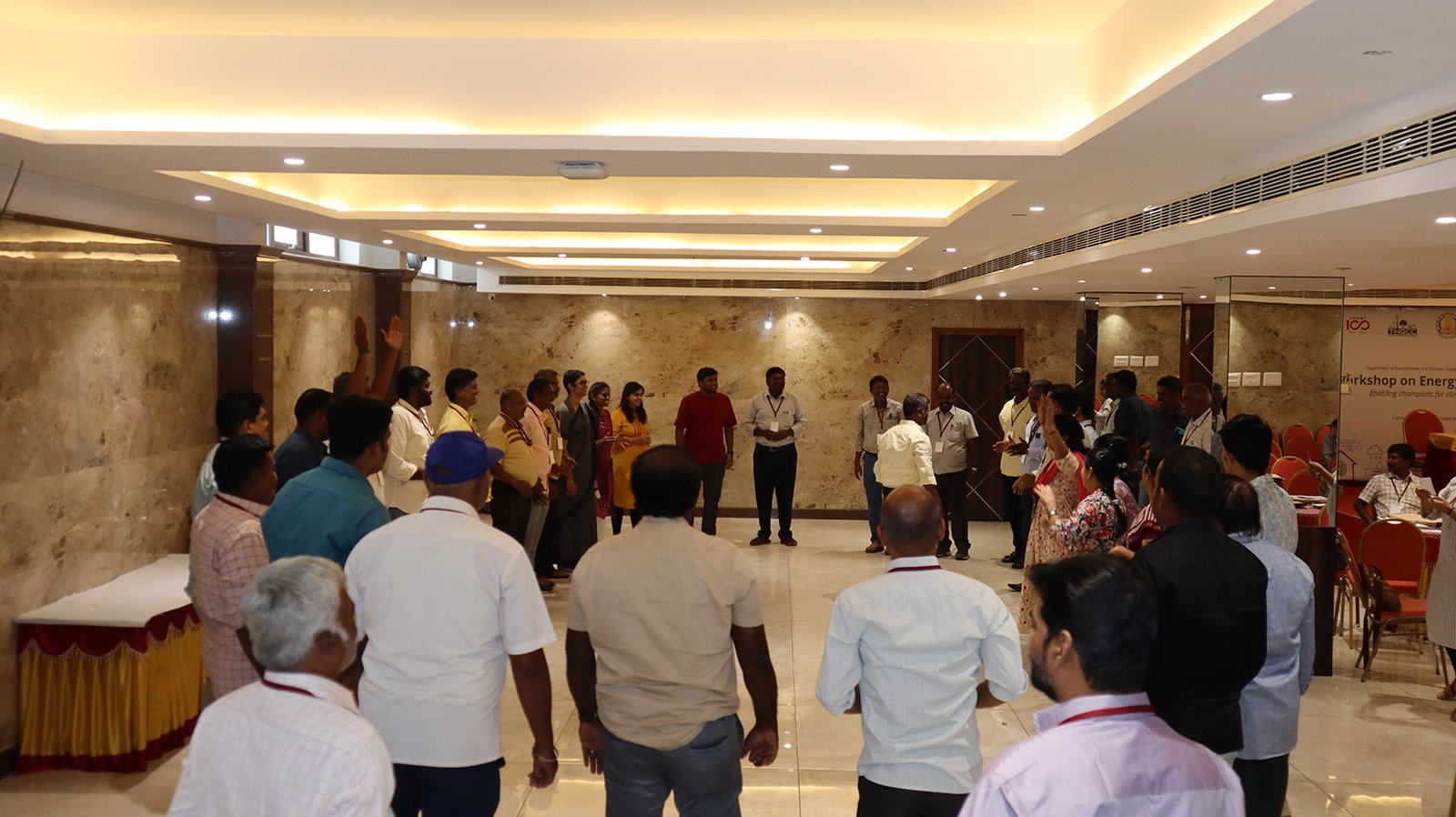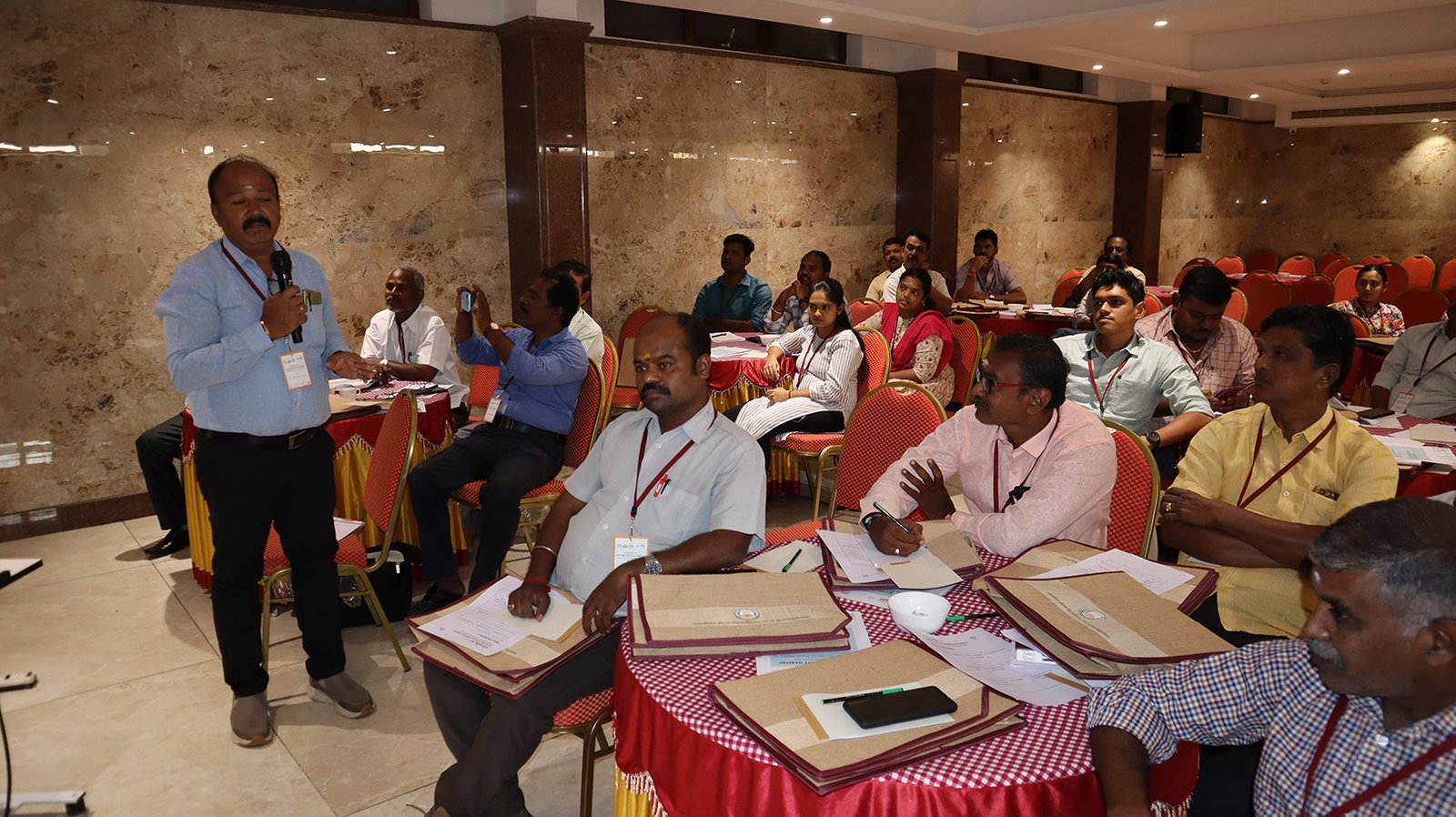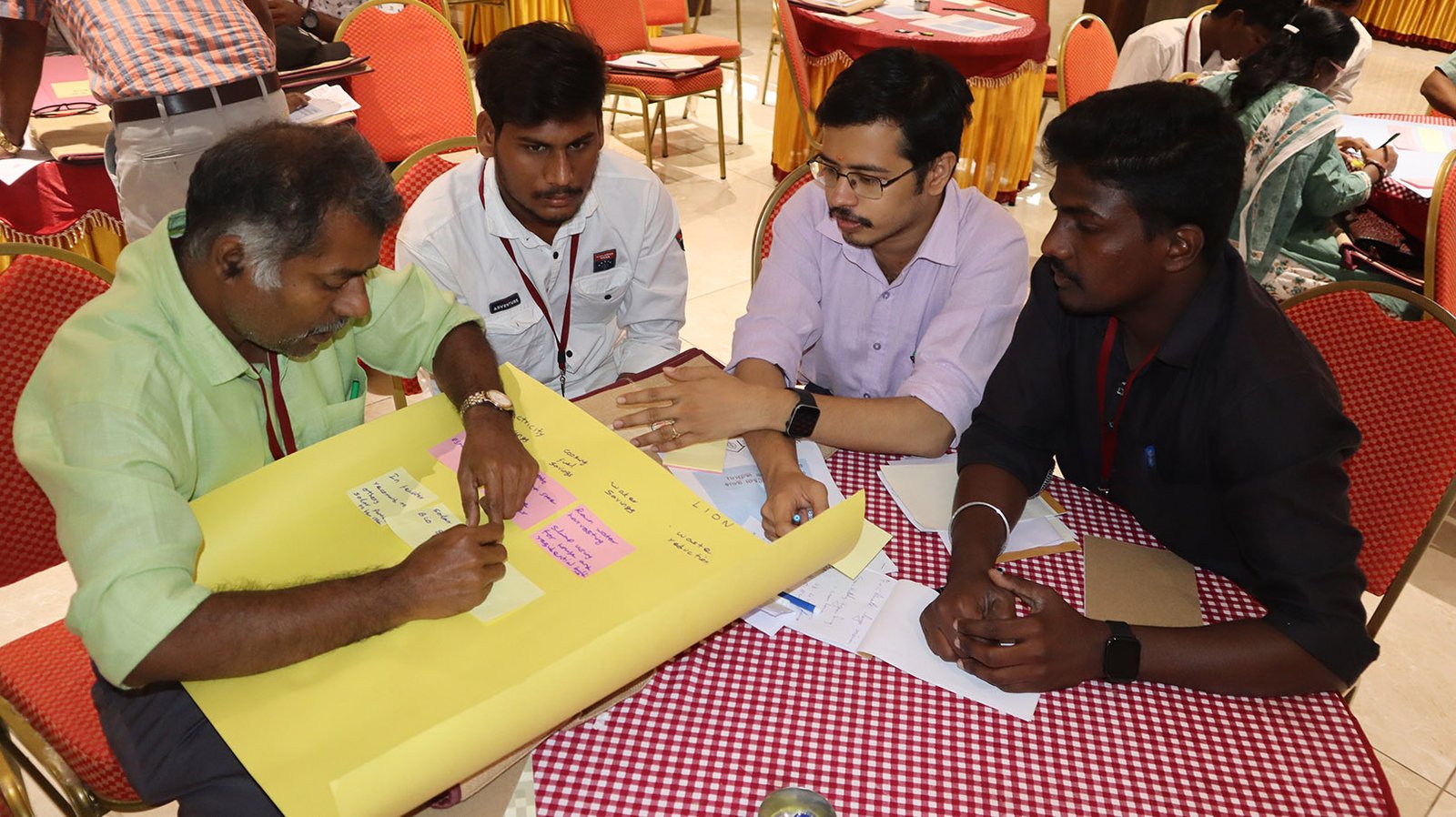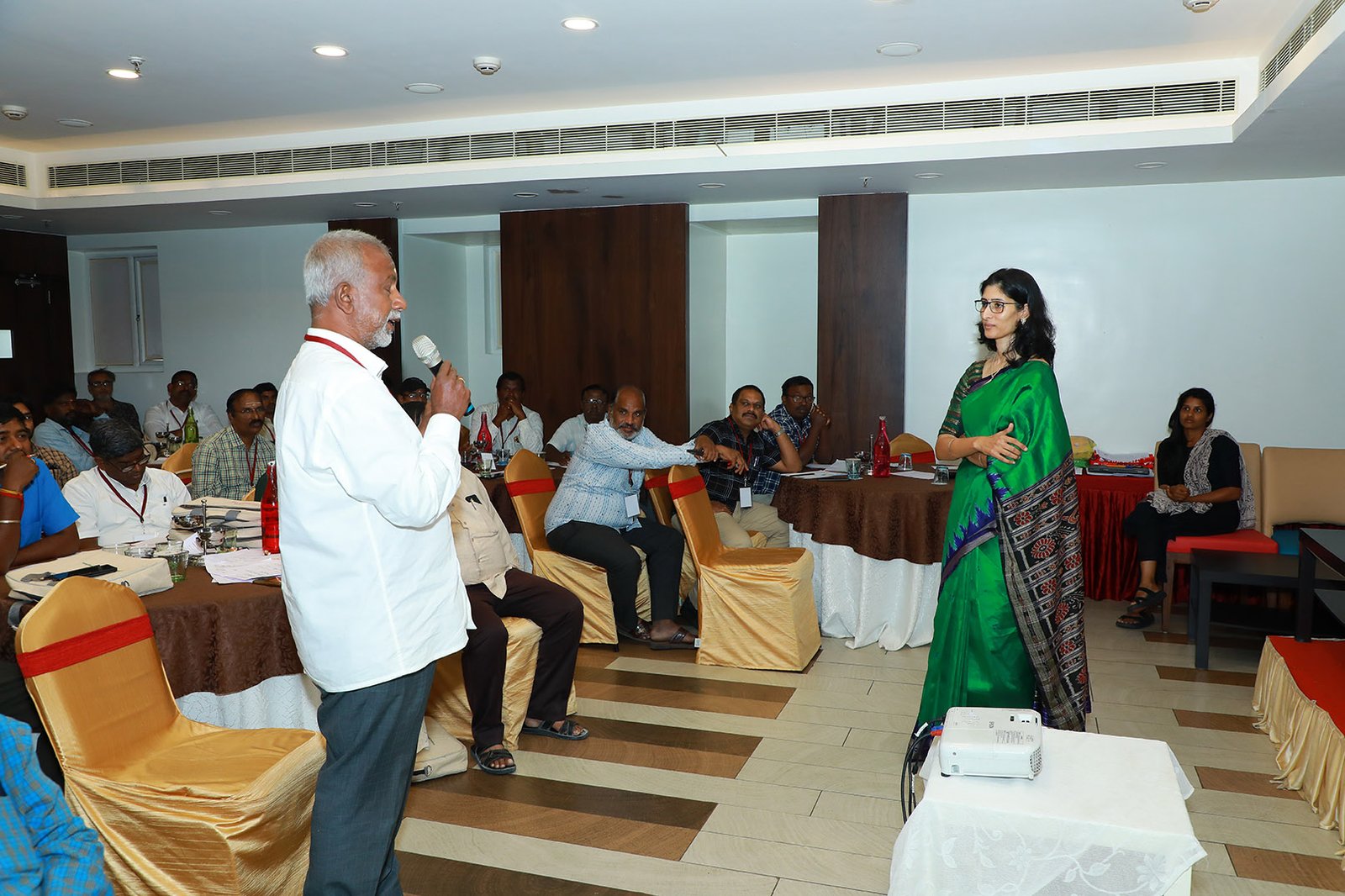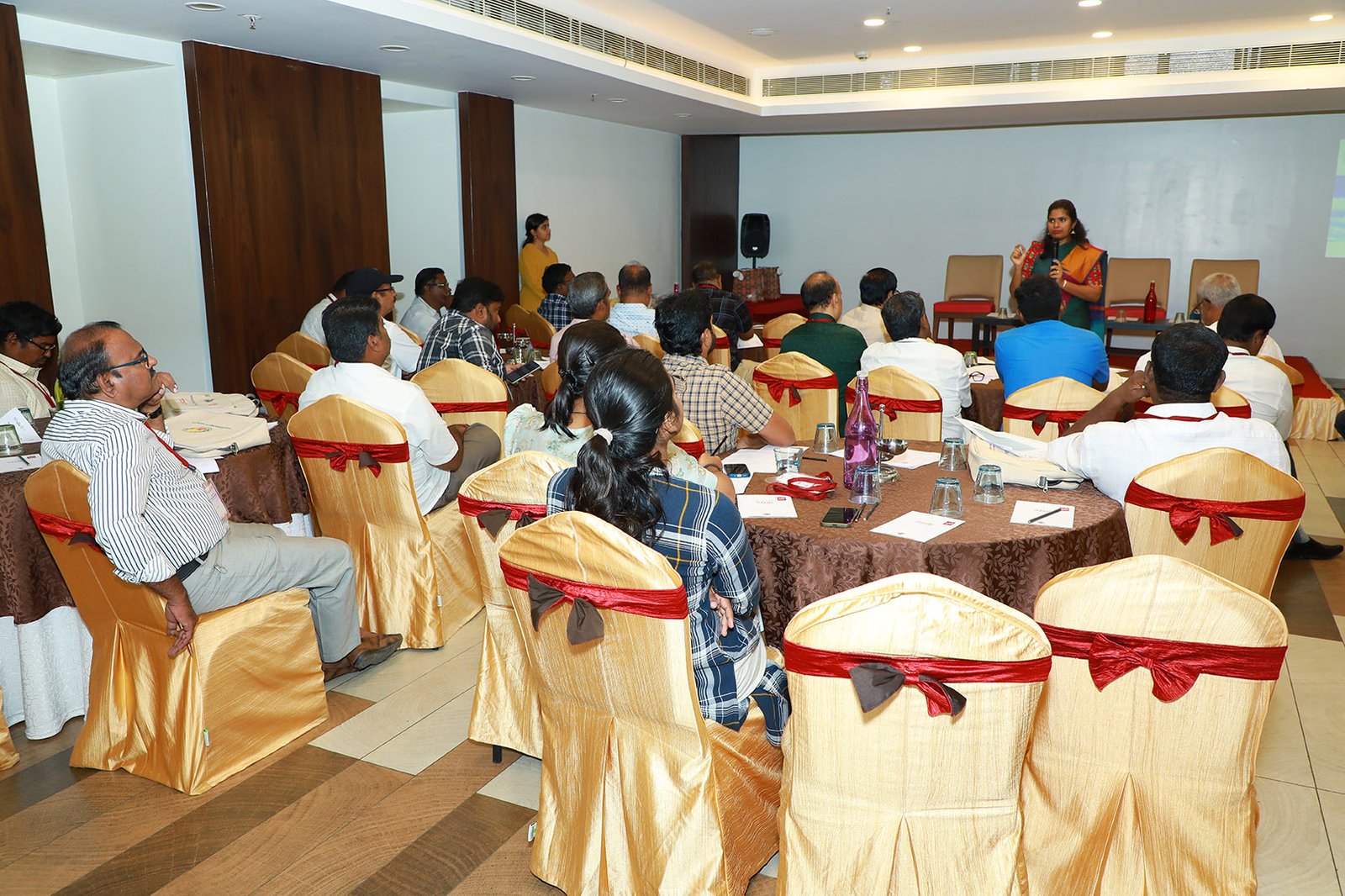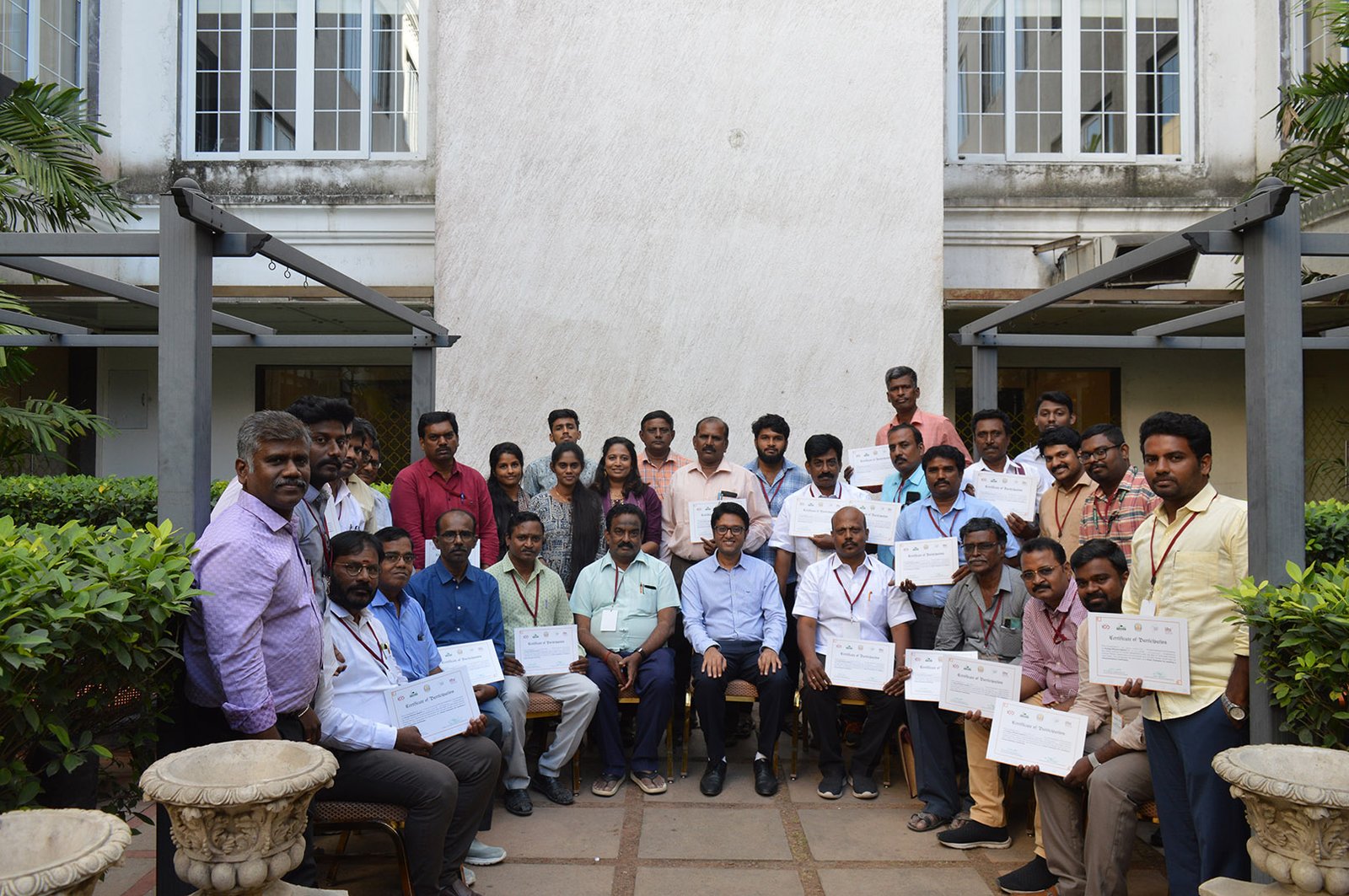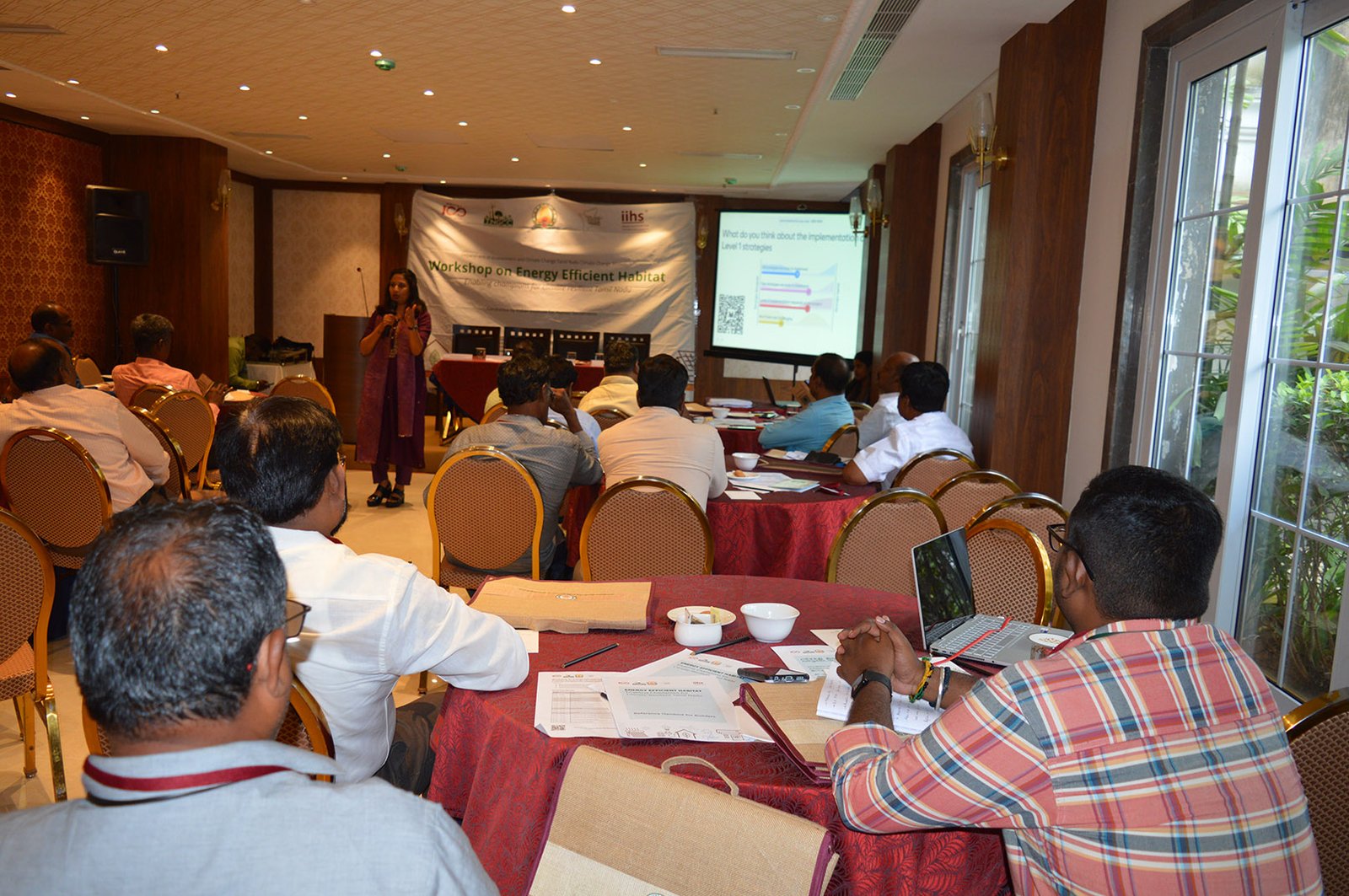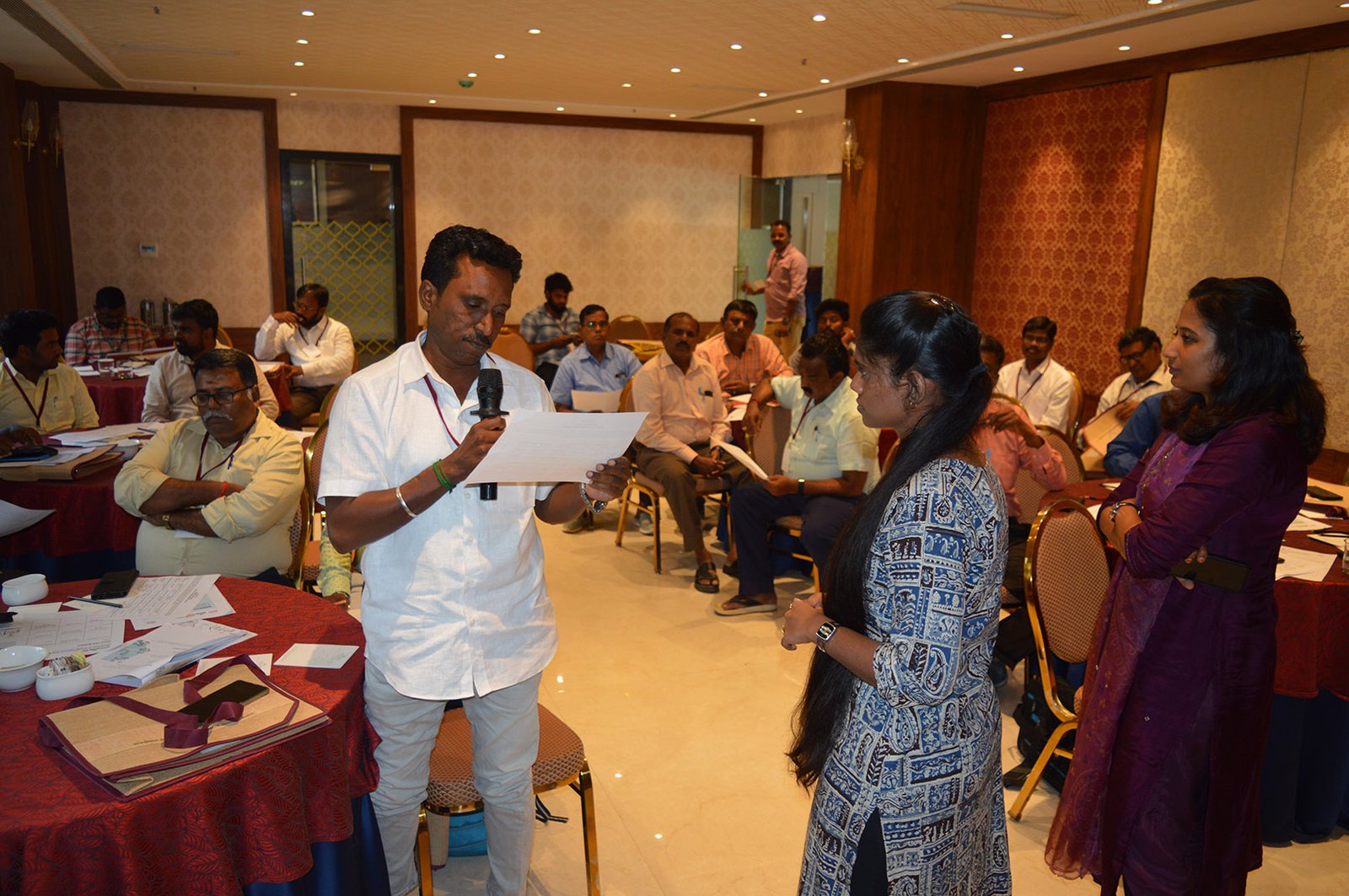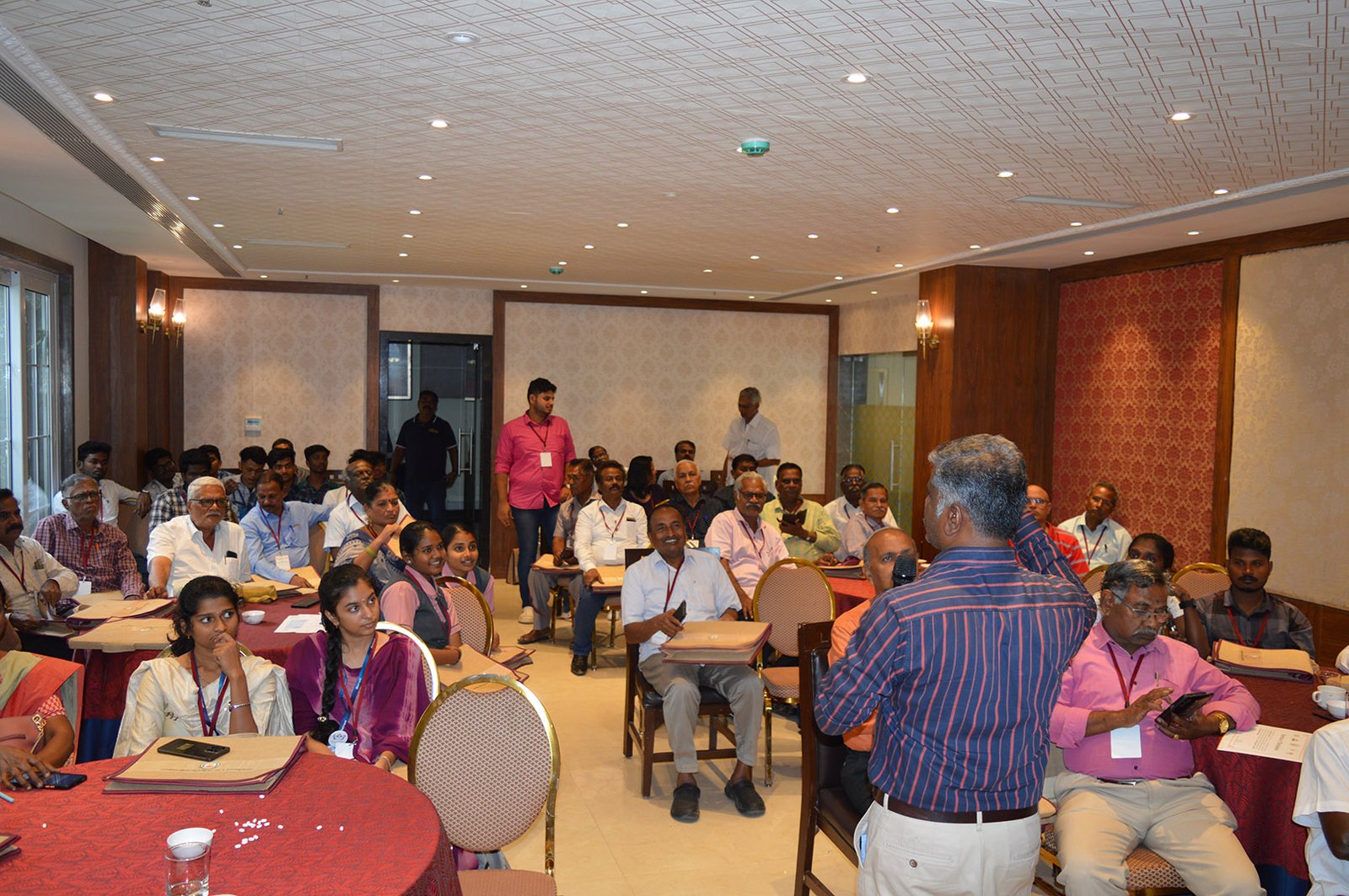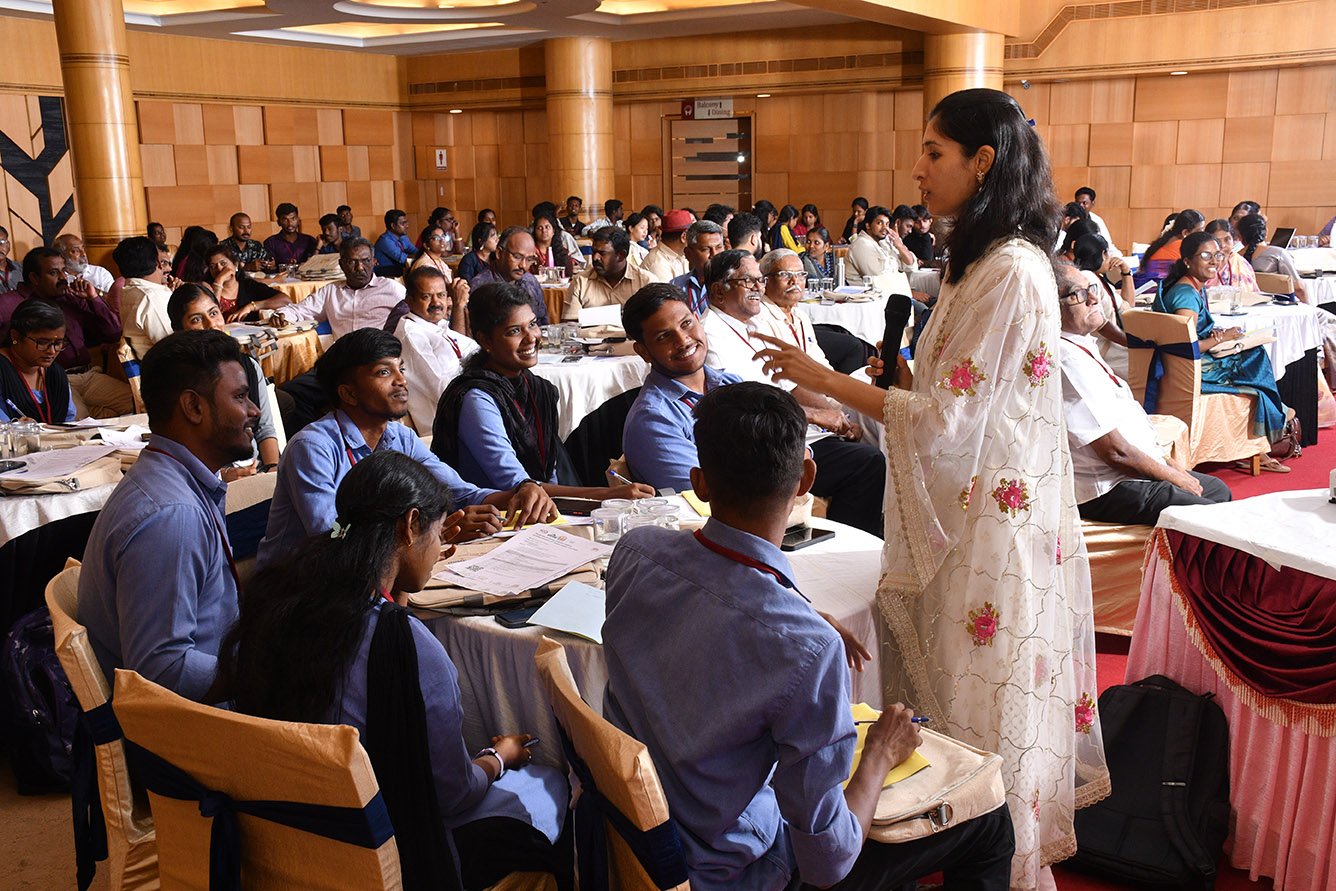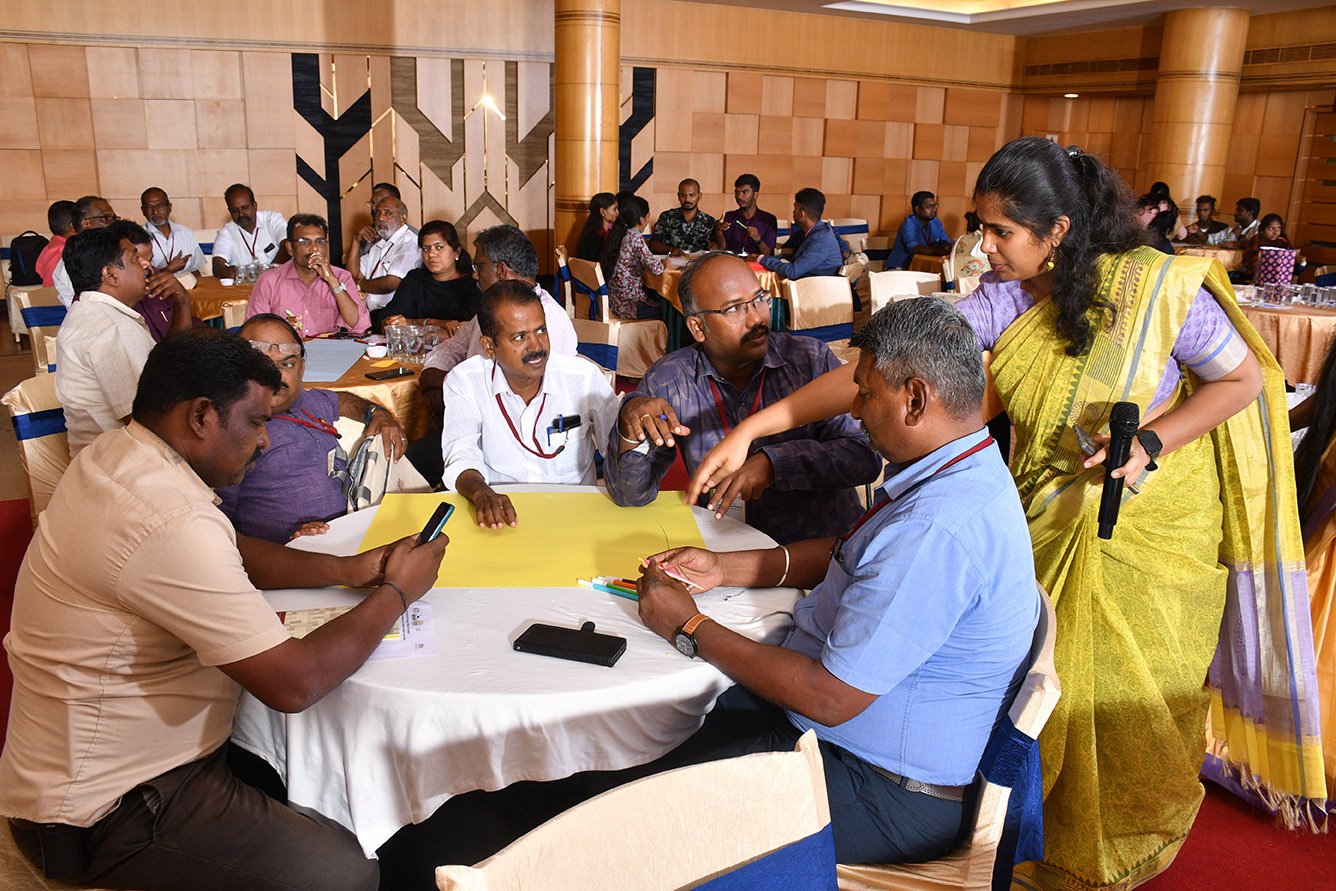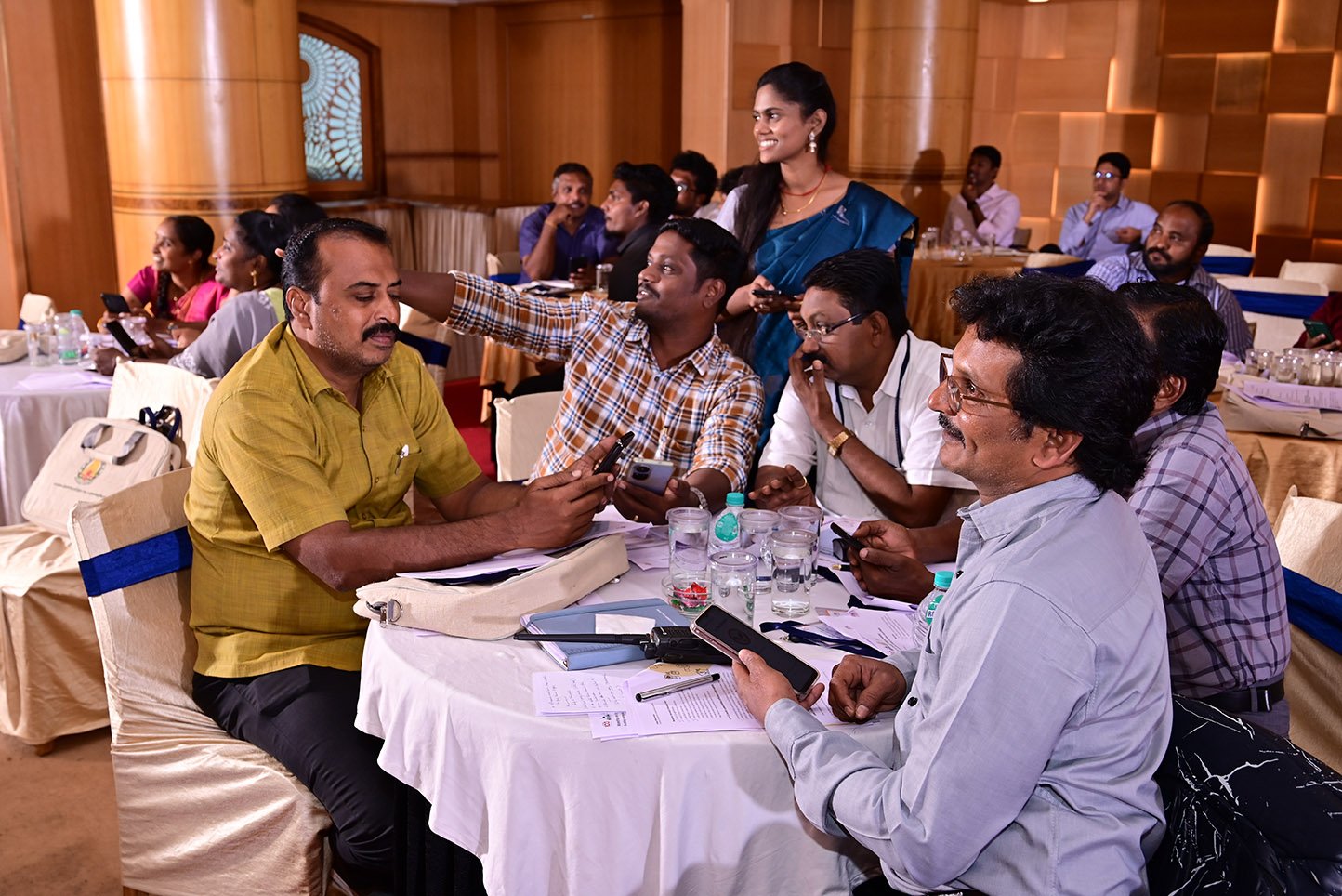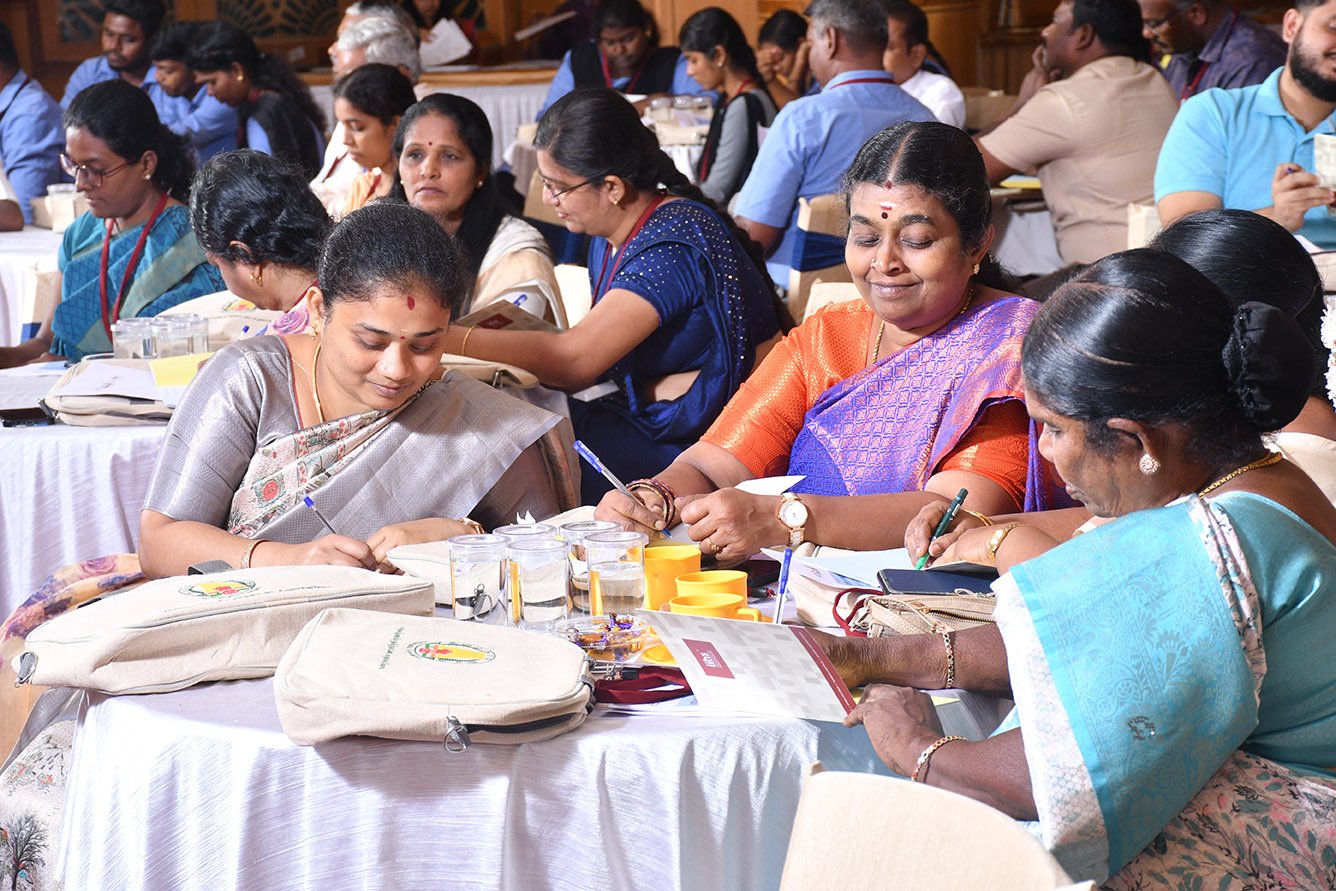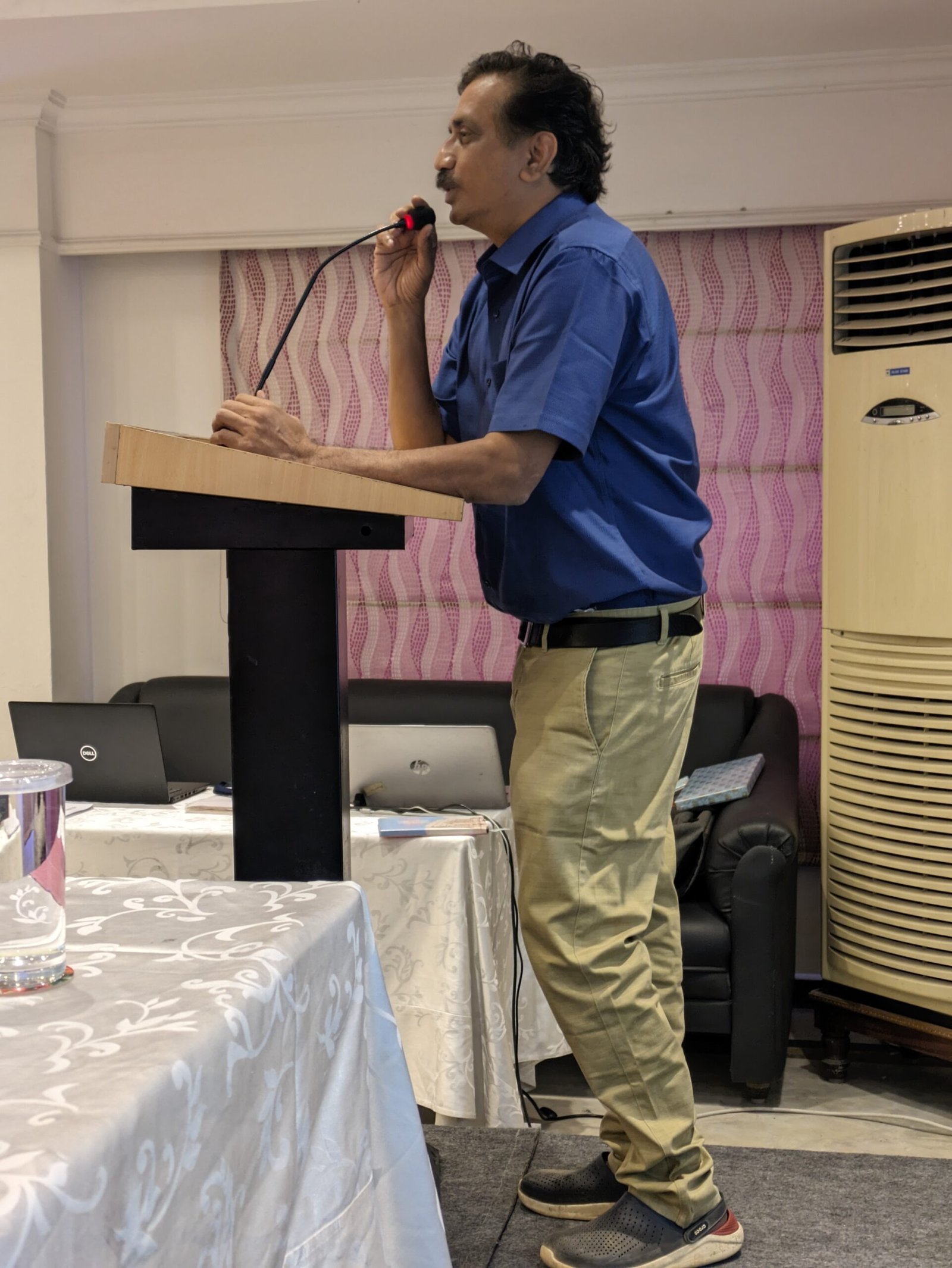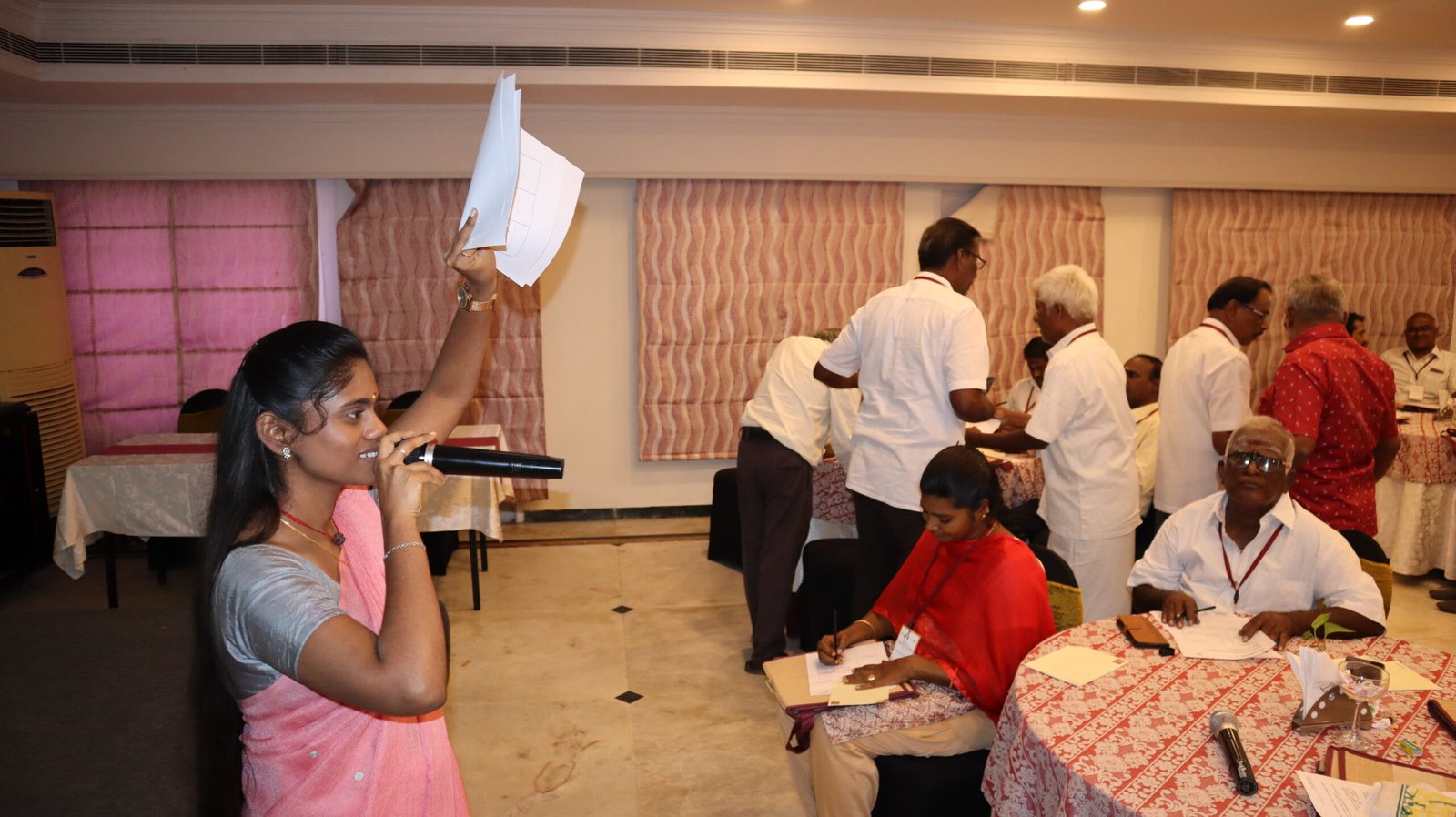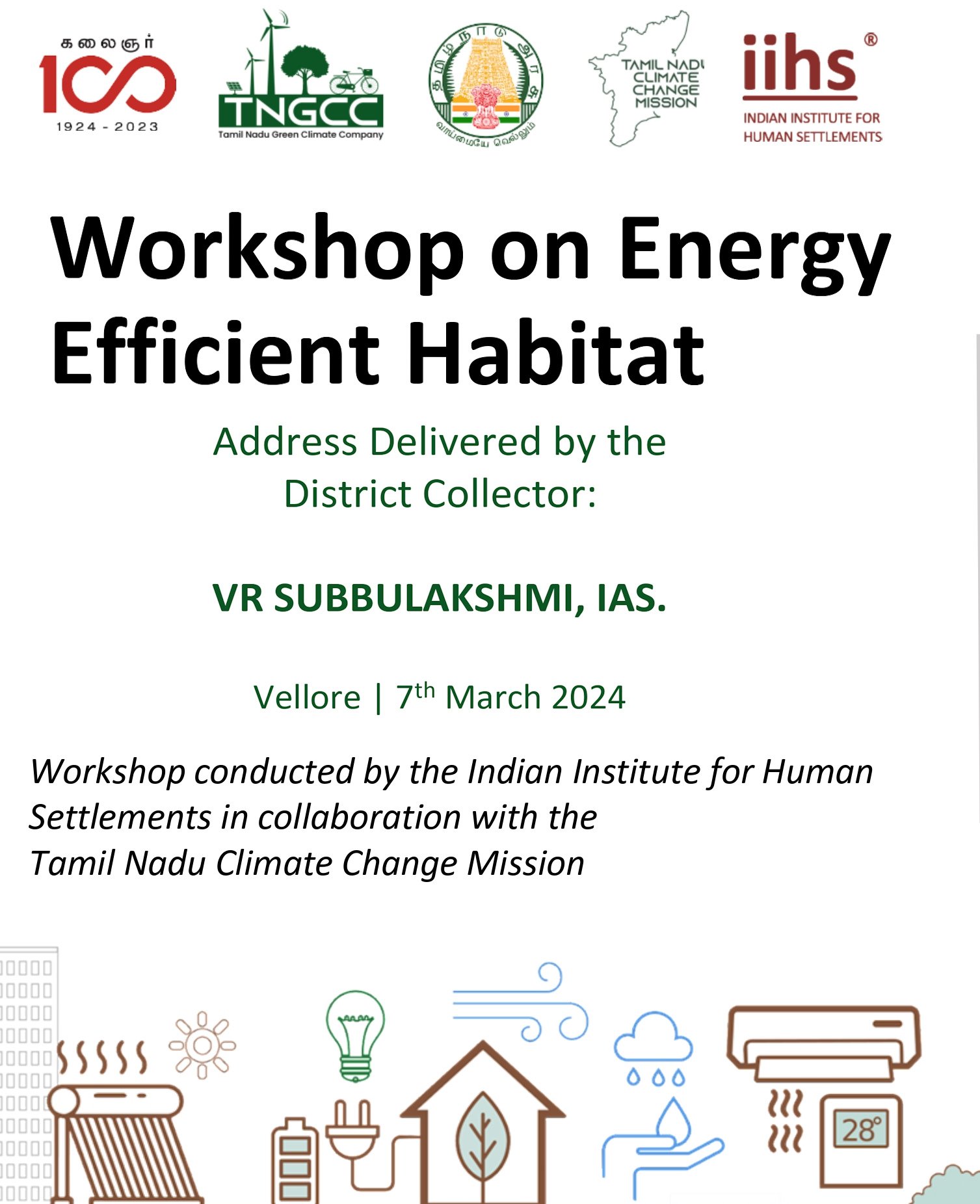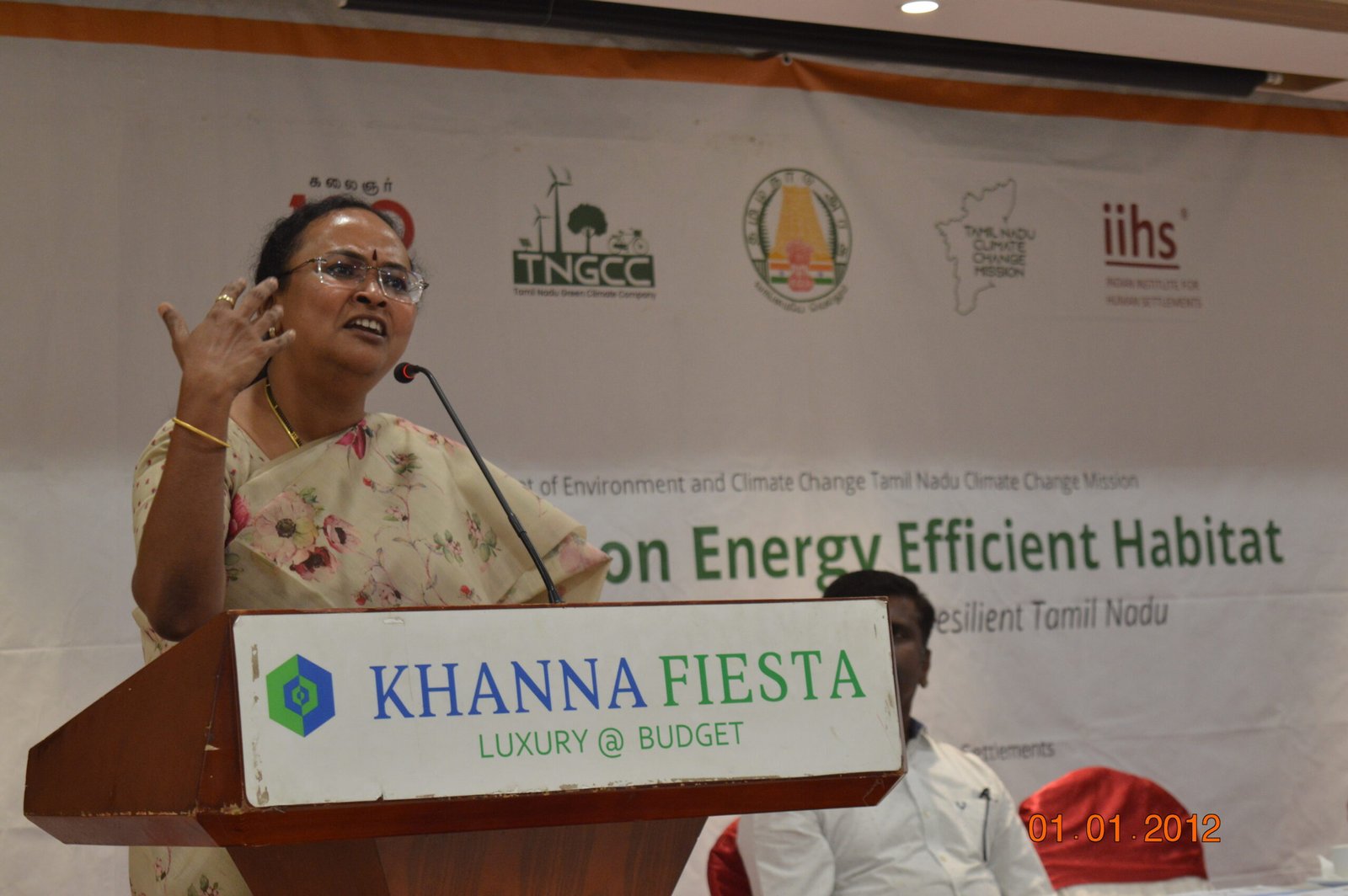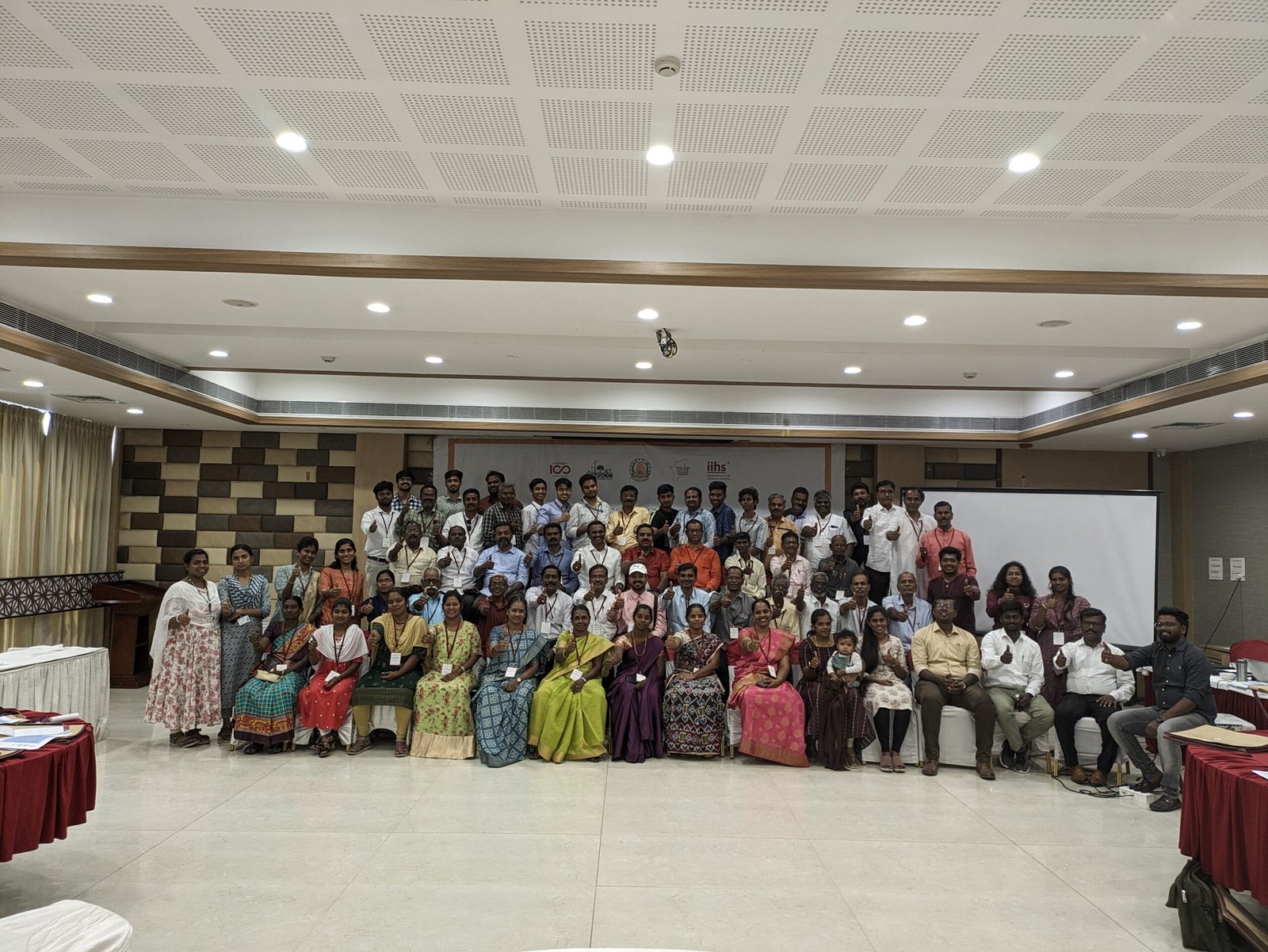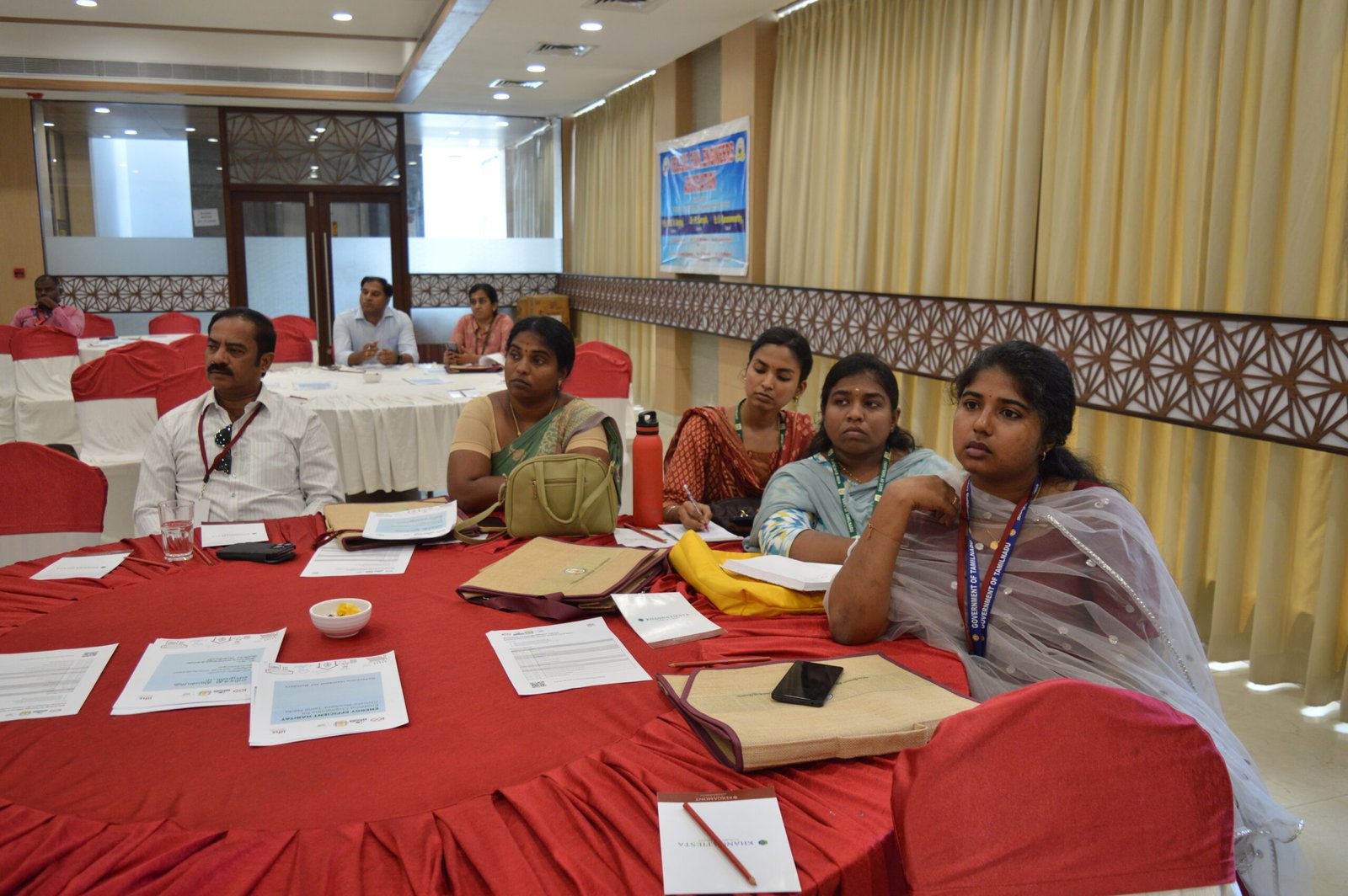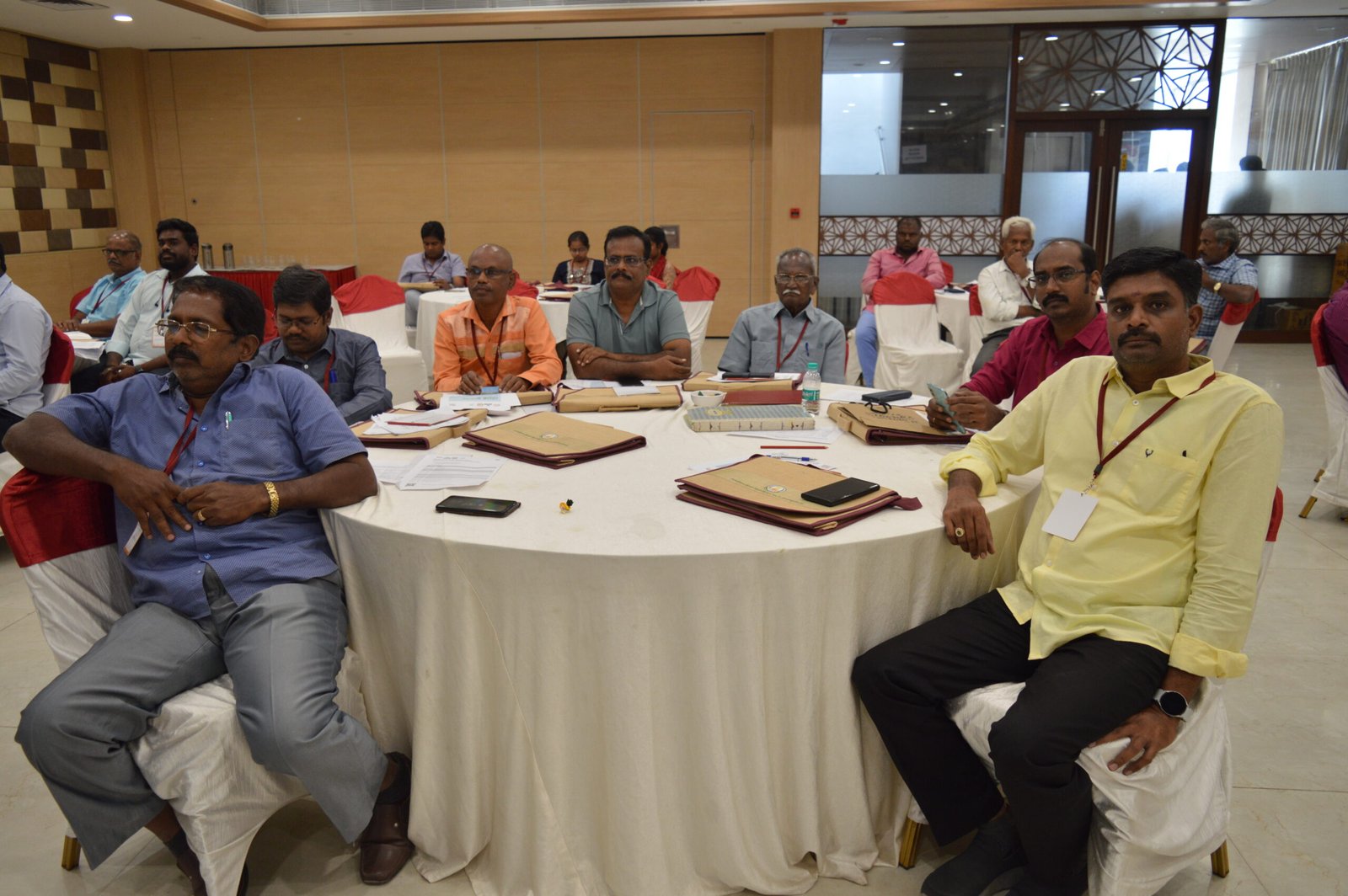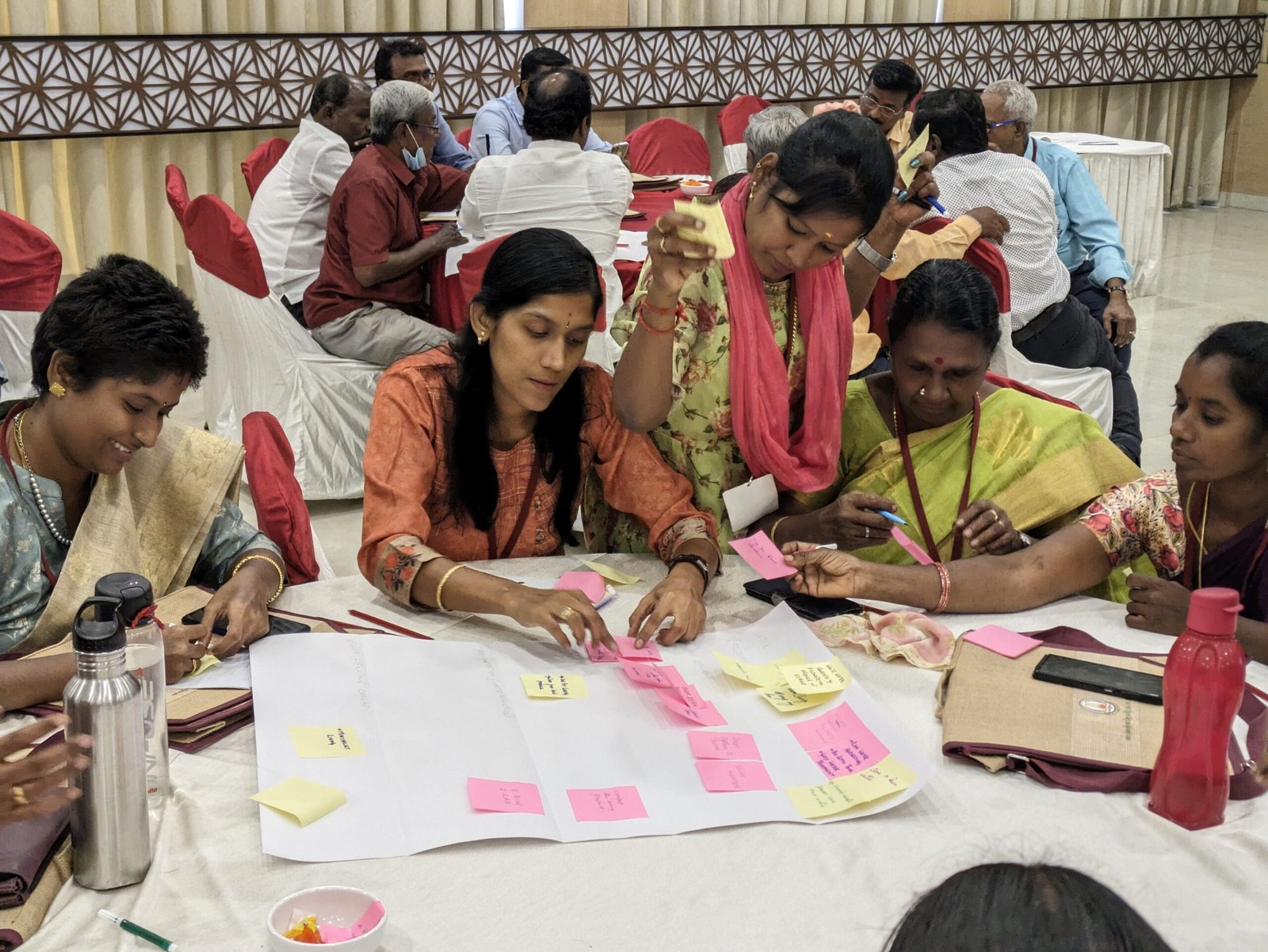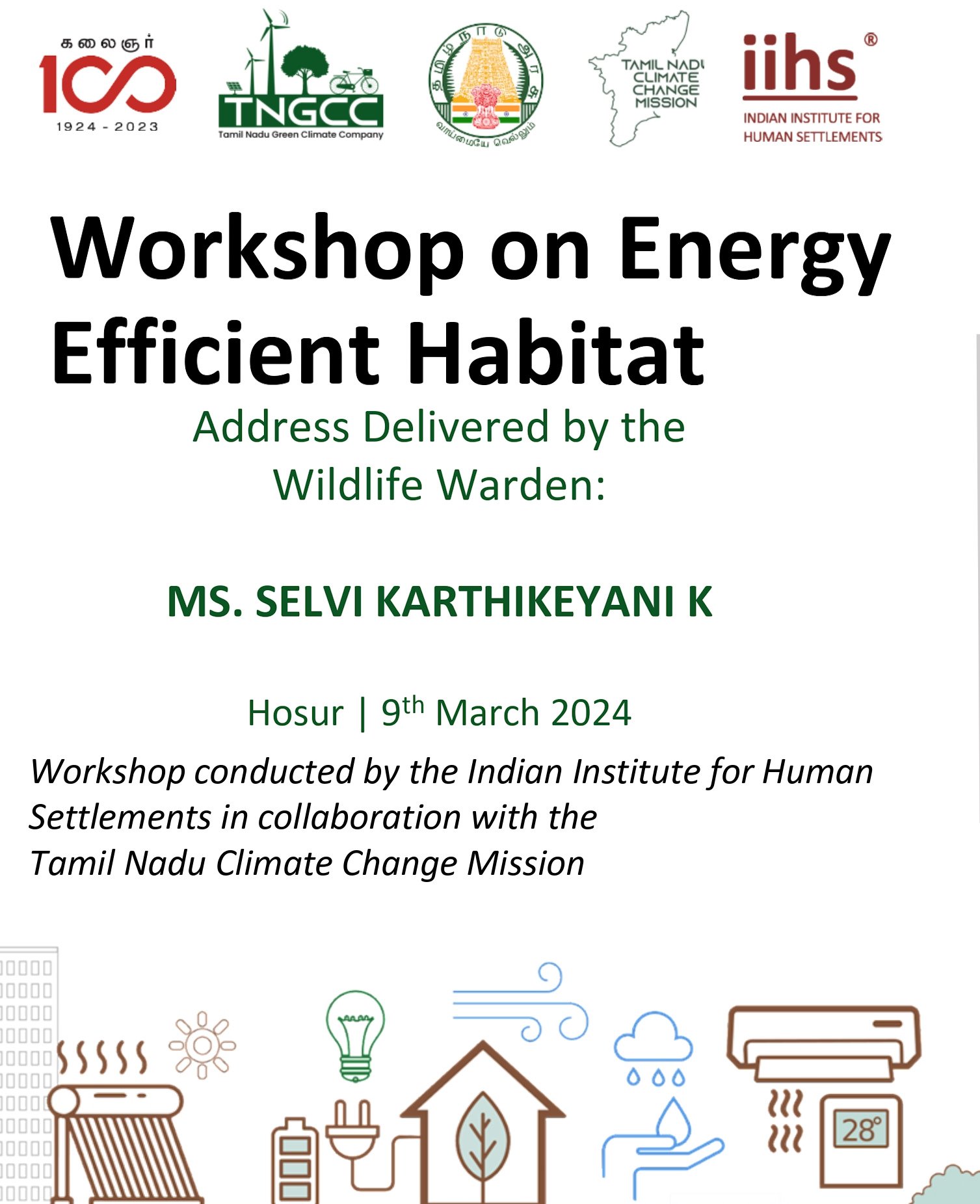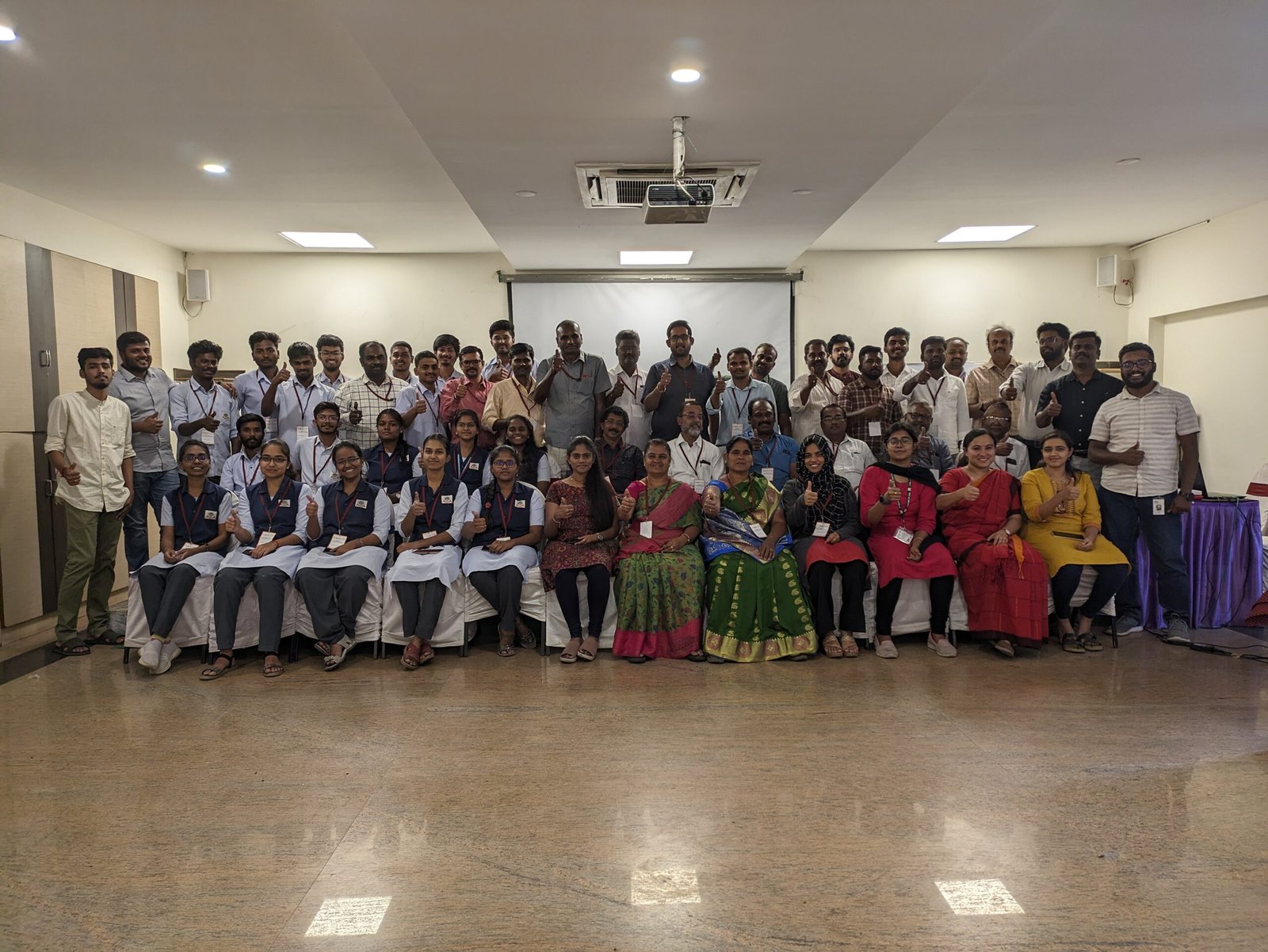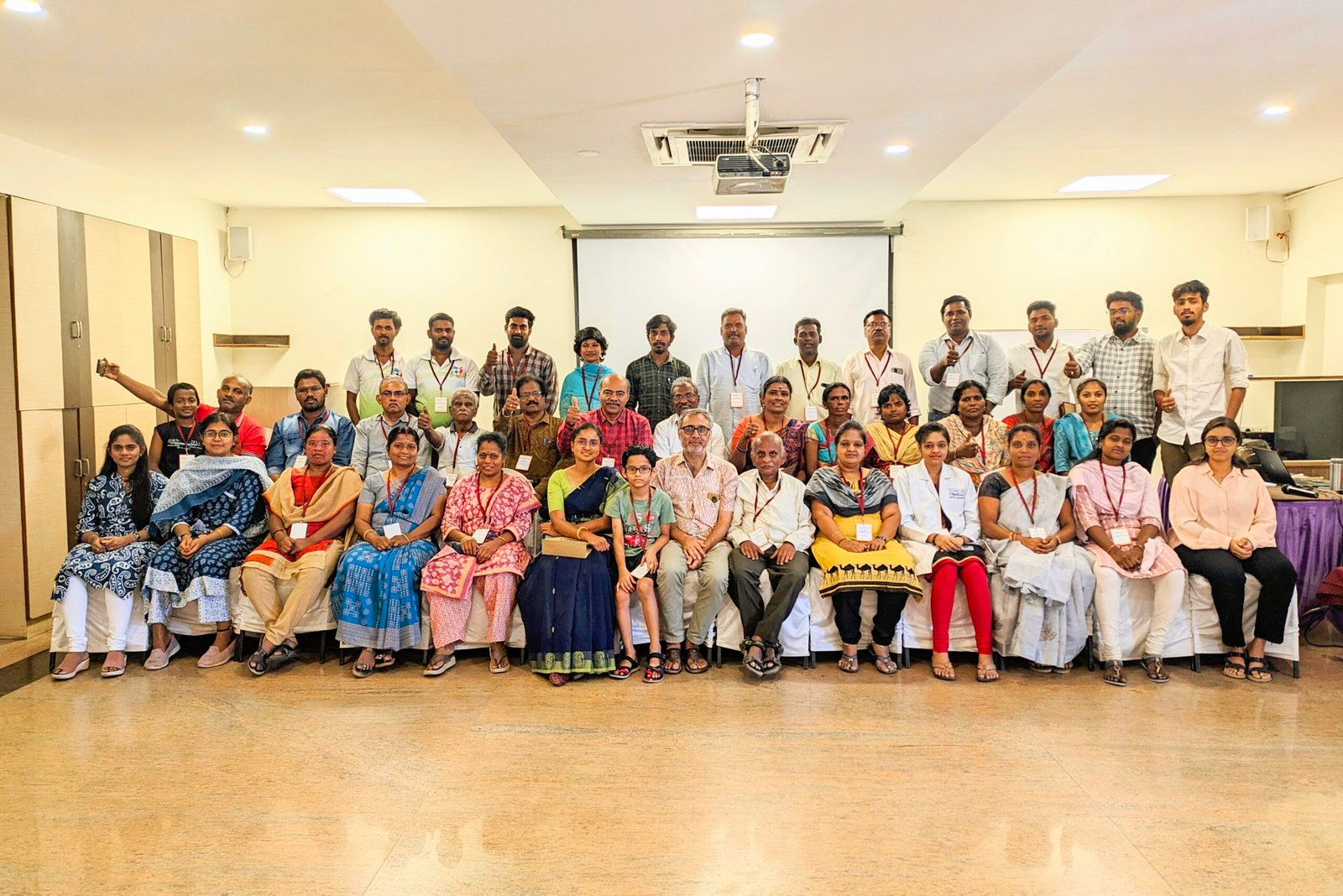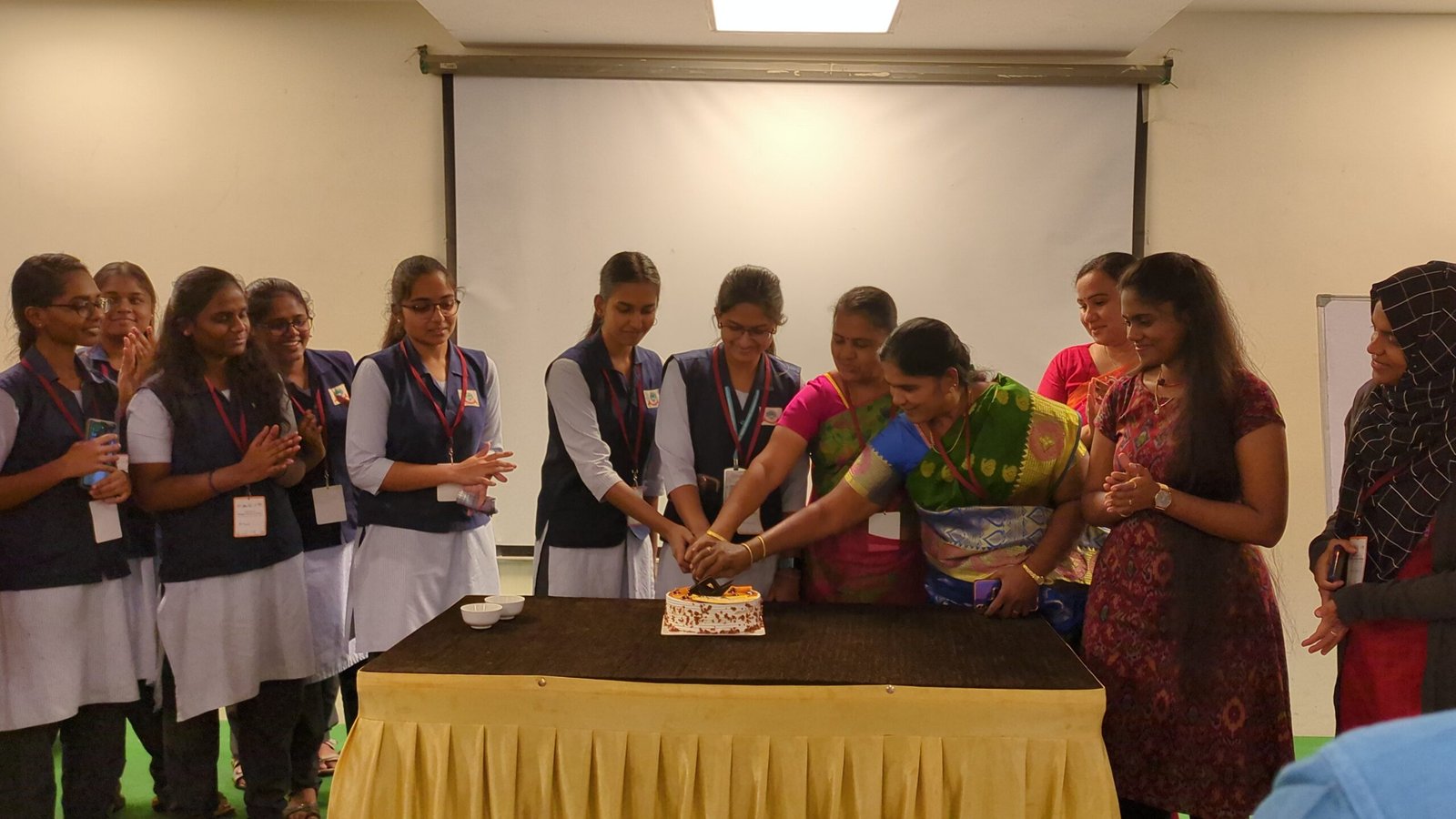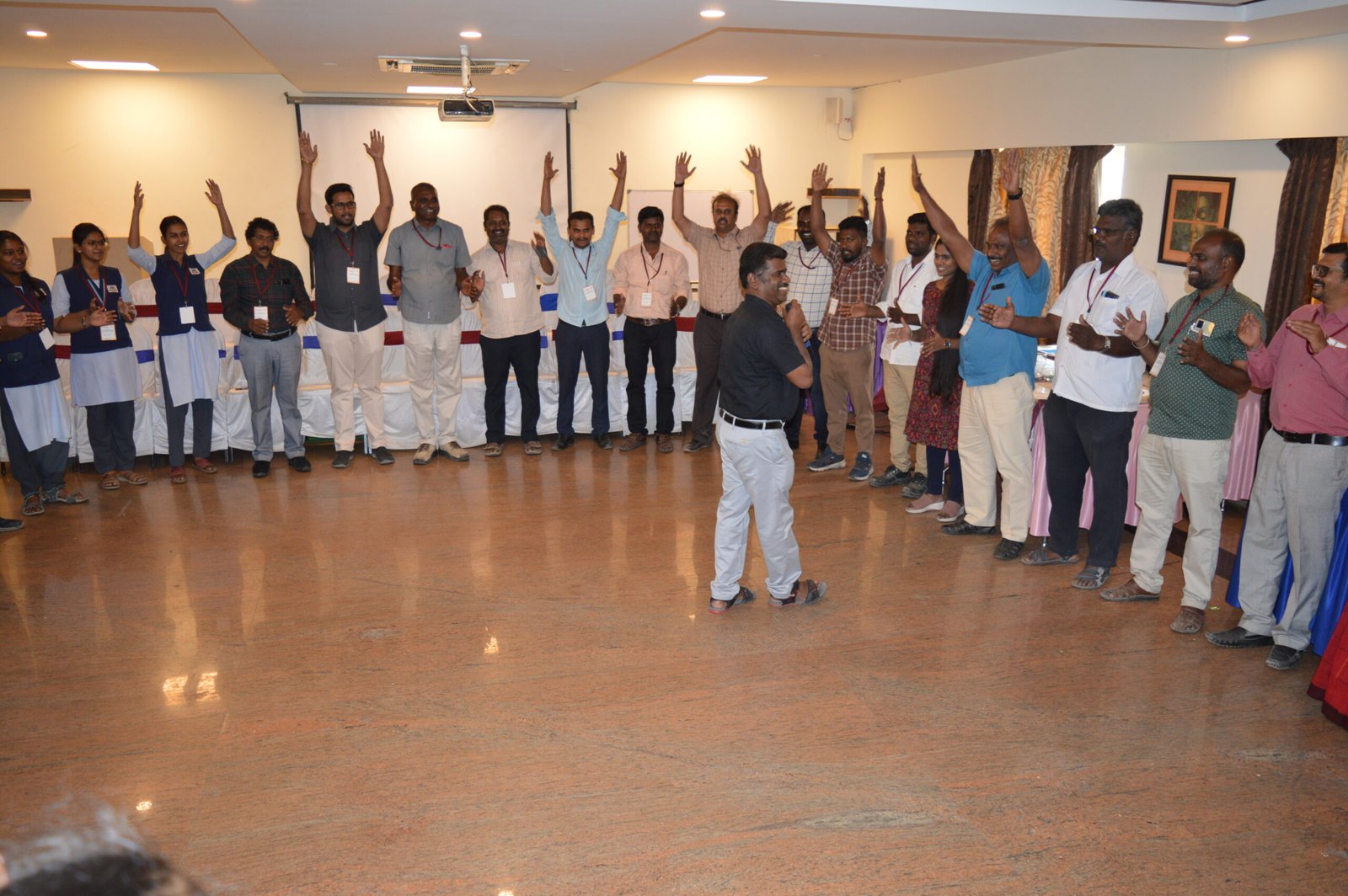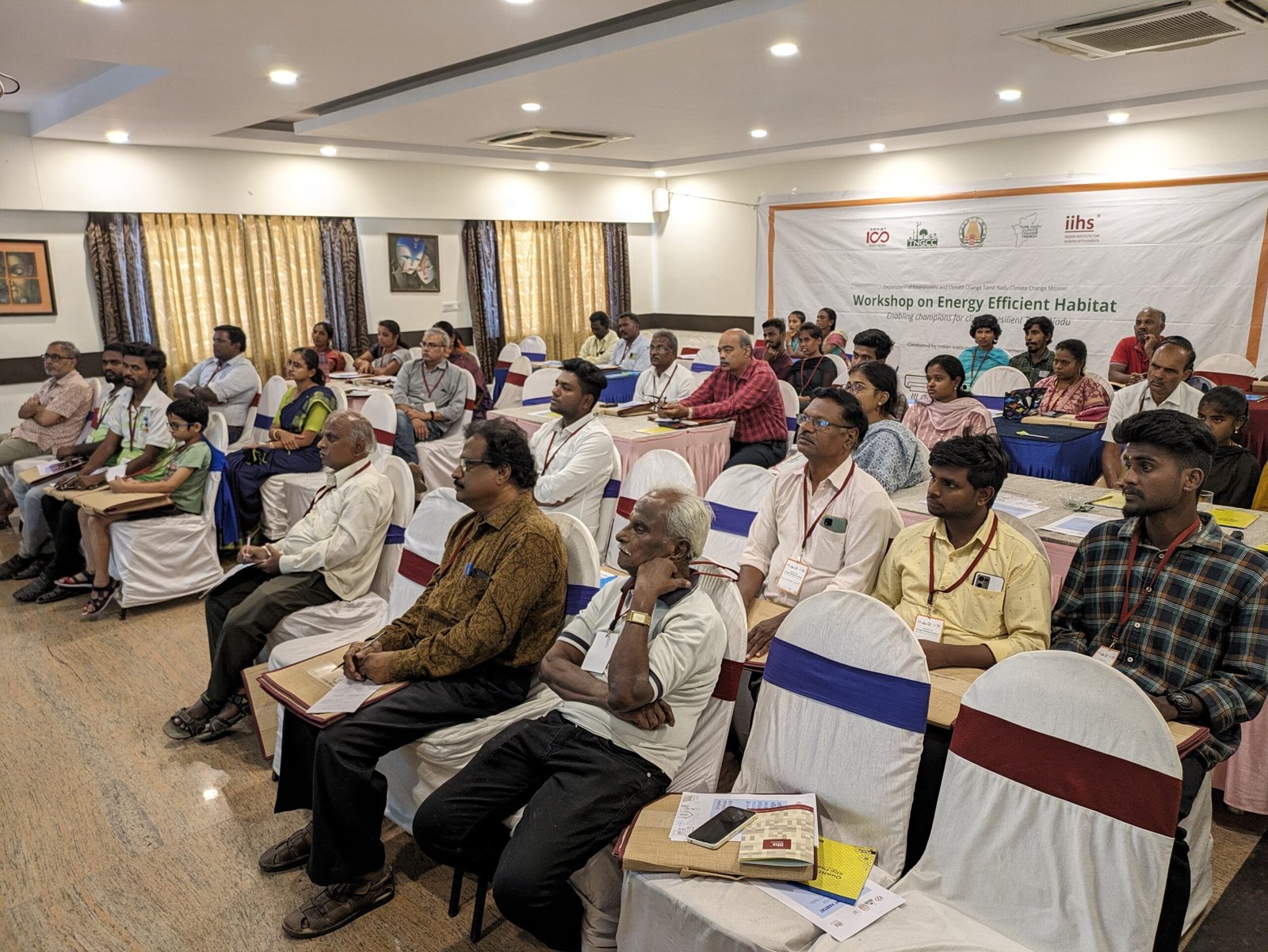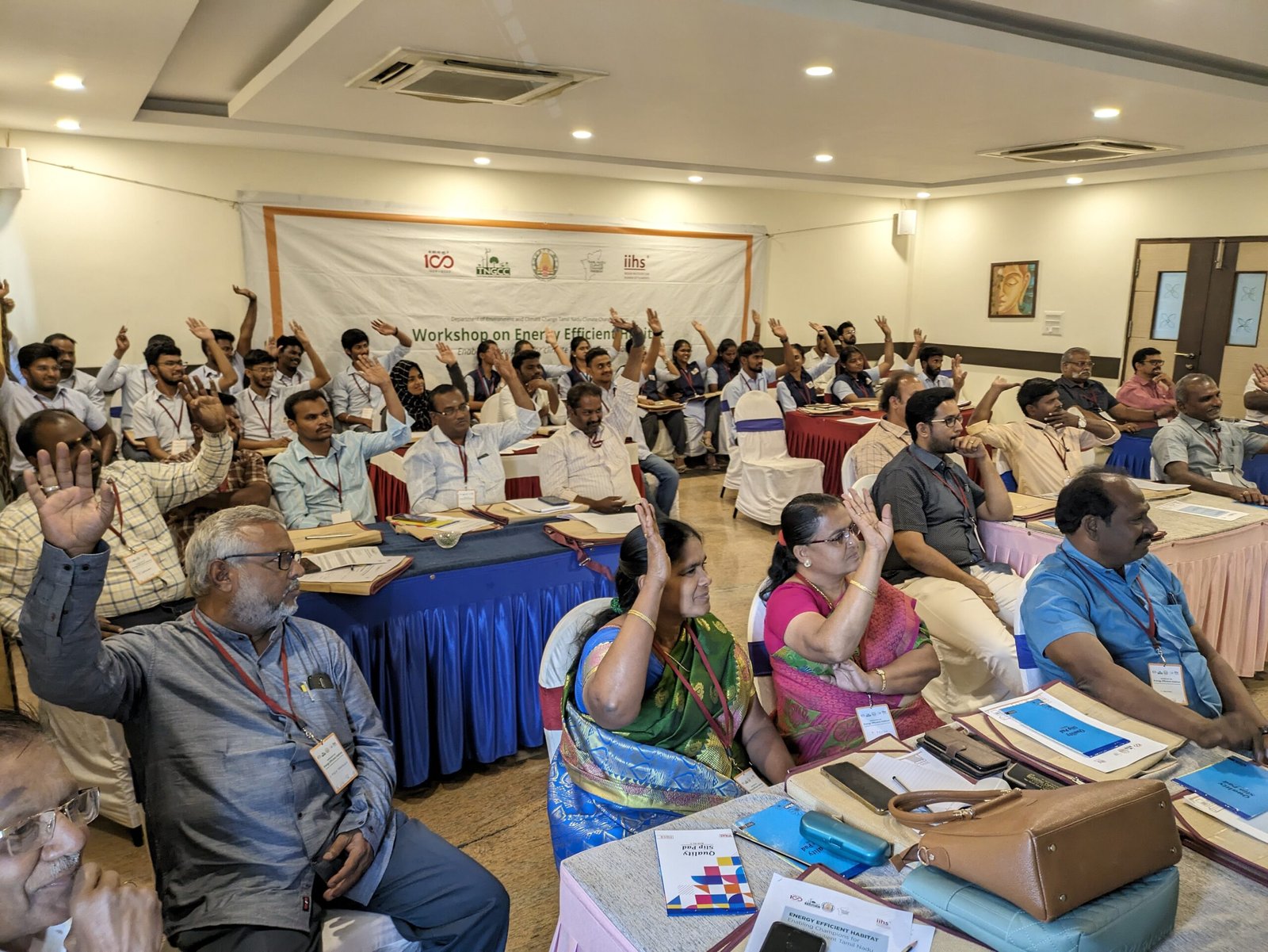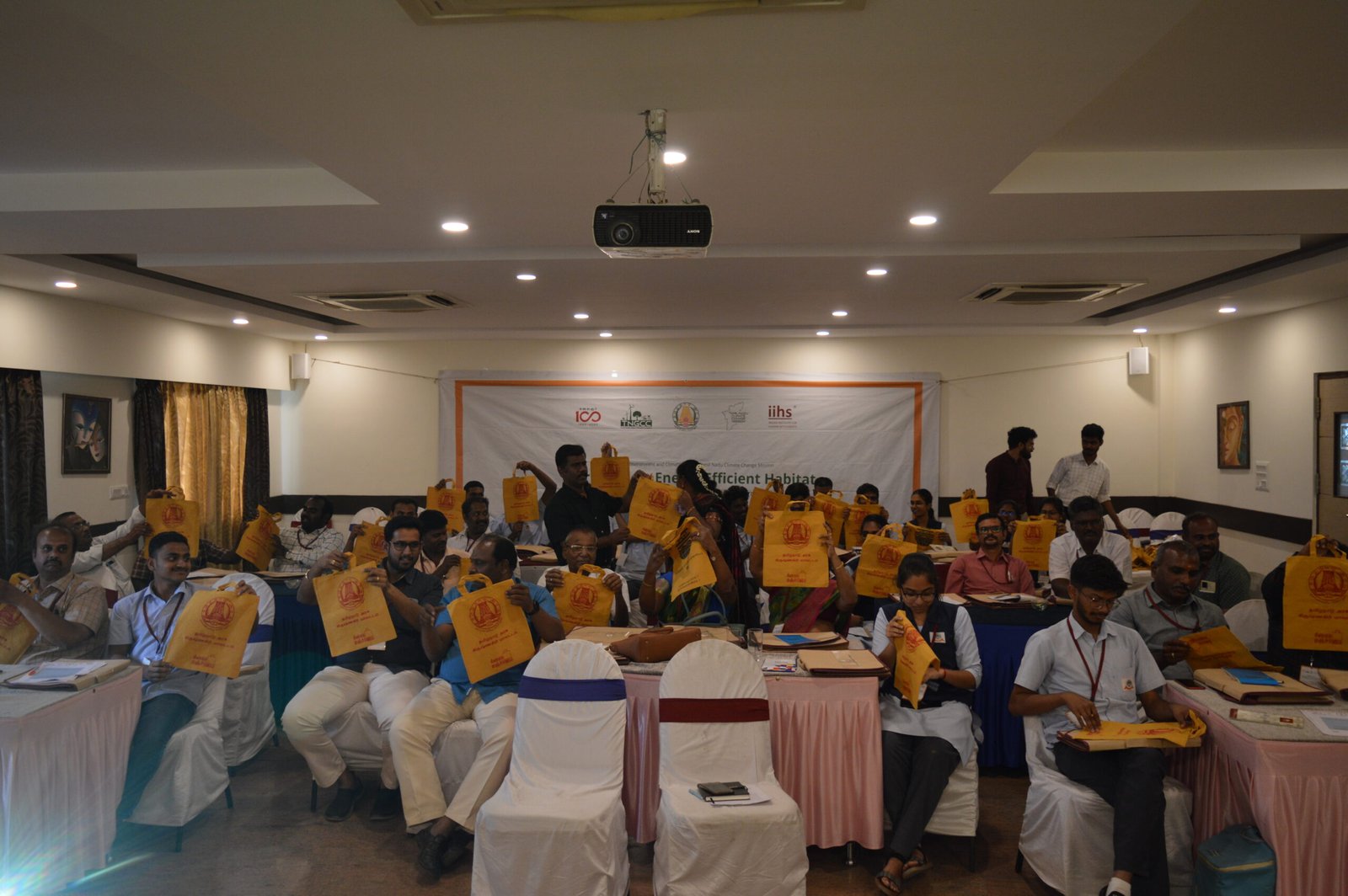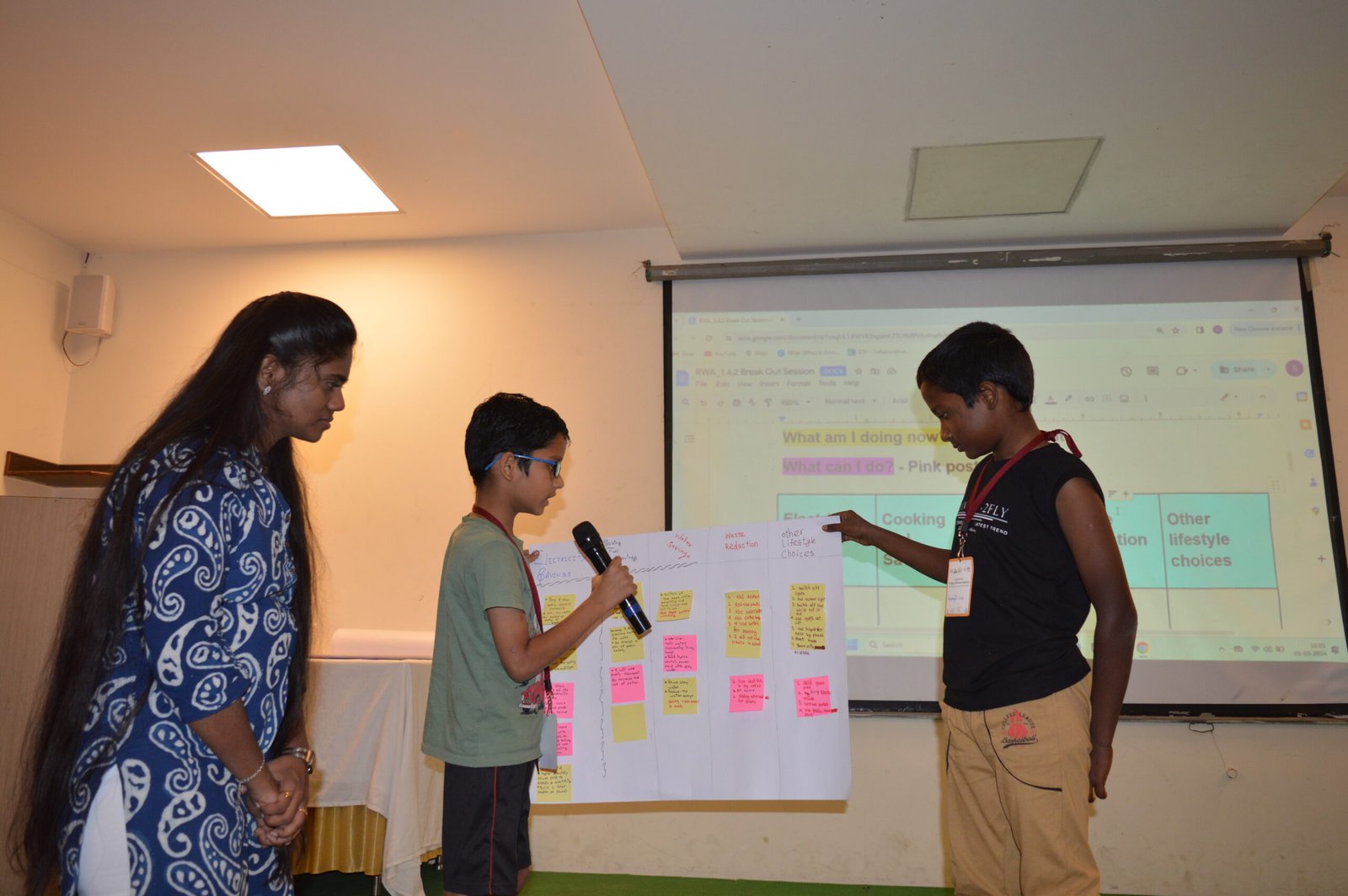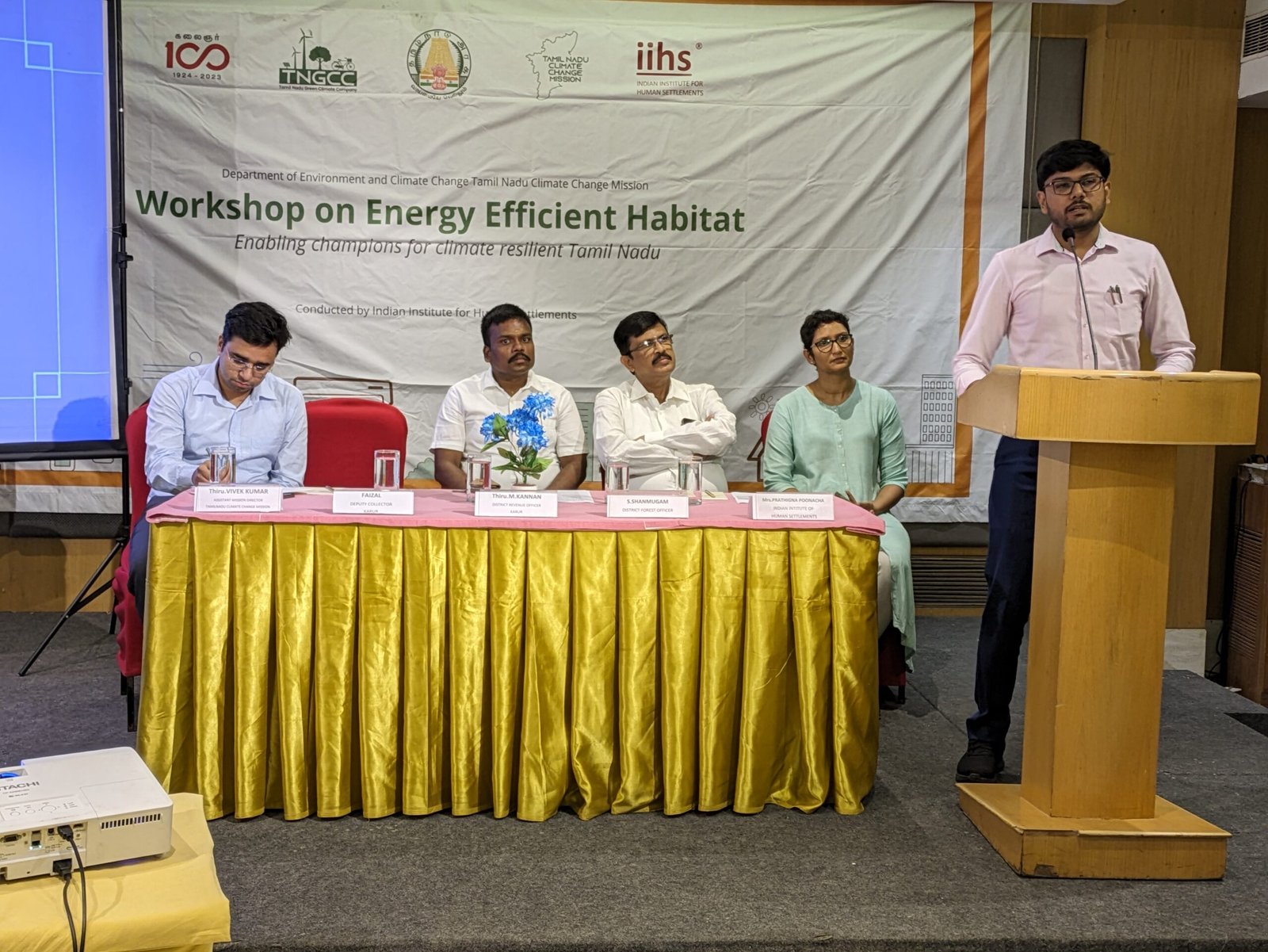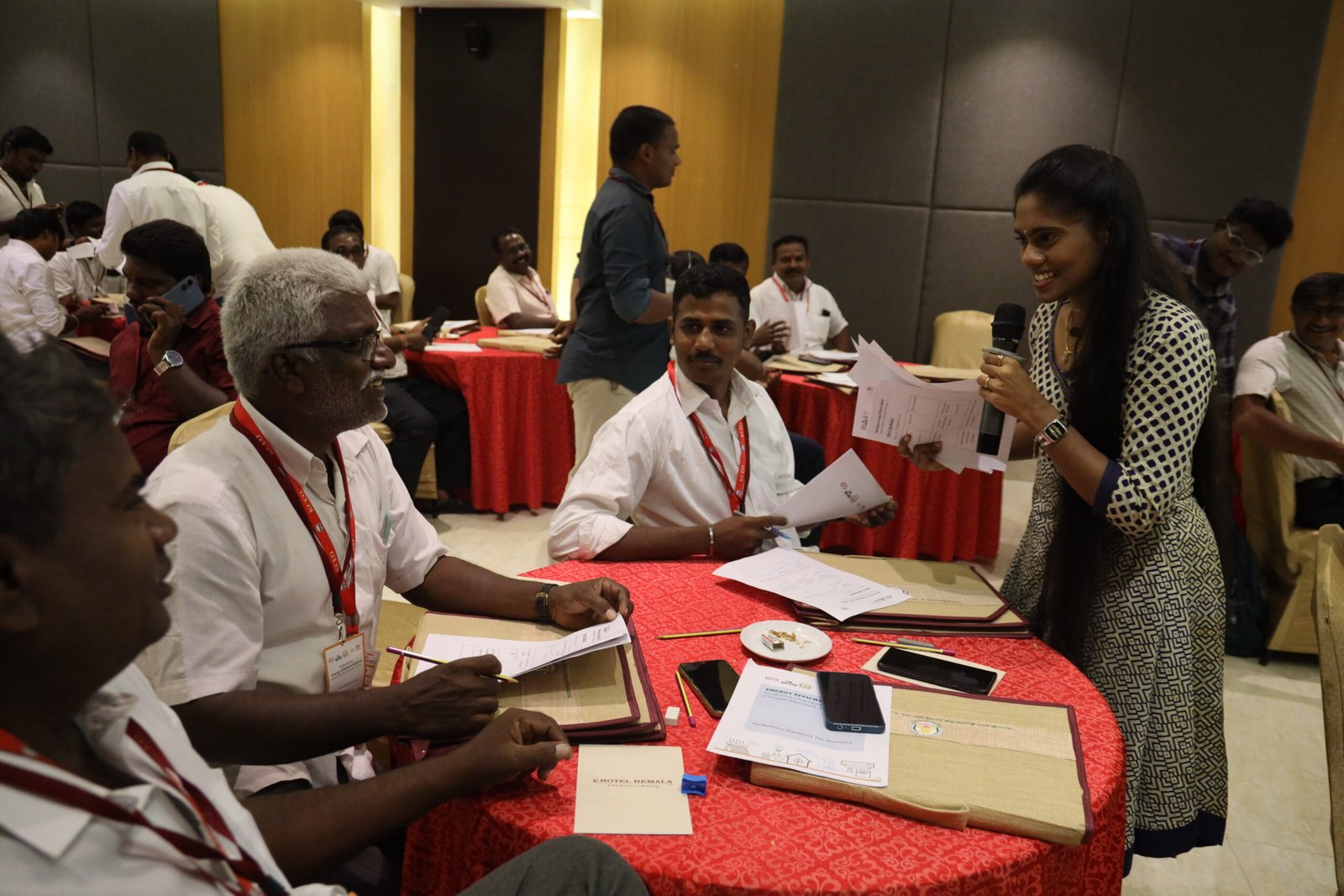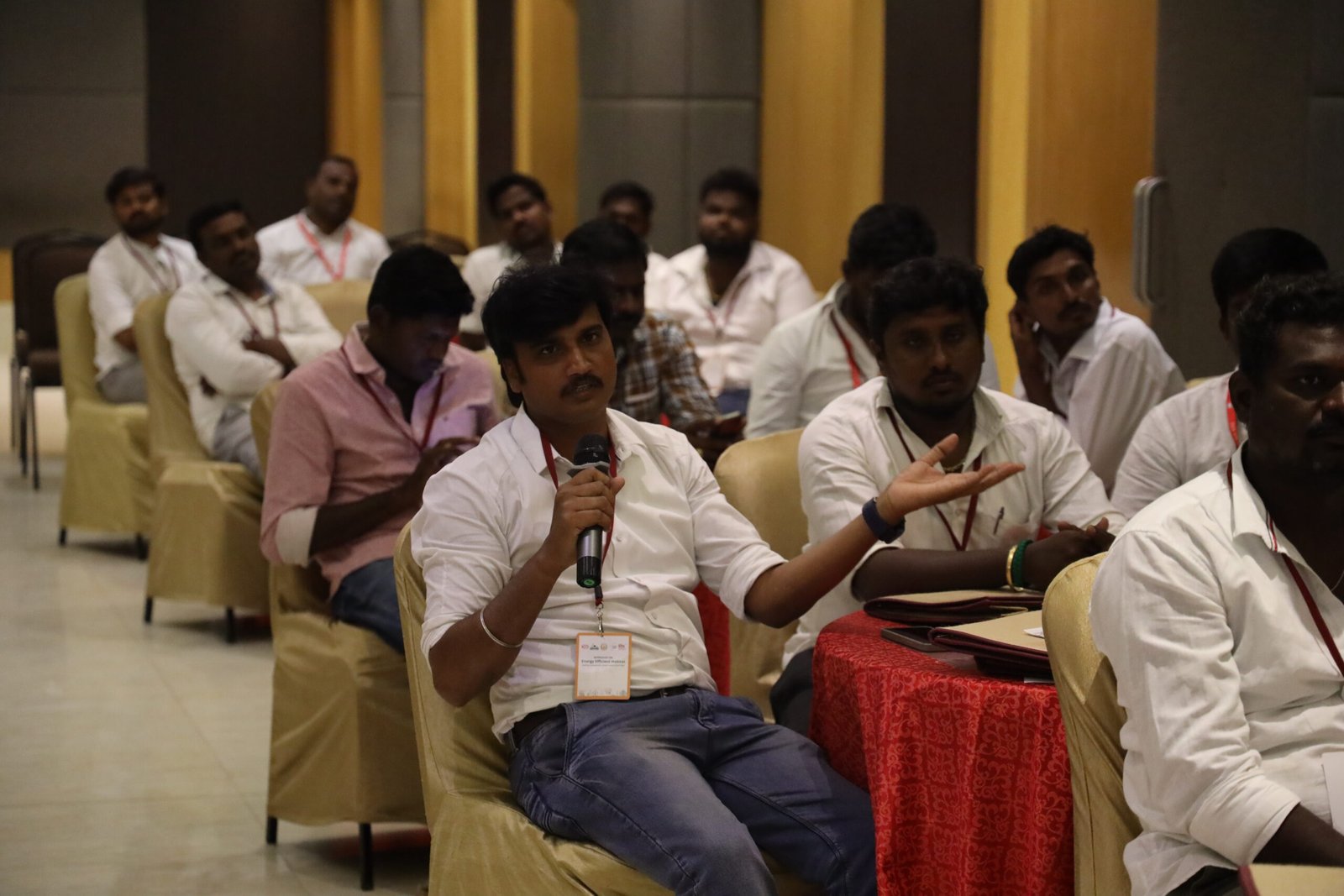Browse through our collection of photos and profiles capturing the essence of our workshops. Through engaging discussions and collaborative efforts, these passionate participants are at the forefront of driving positive change towards sustainability and climate resilience.
These are images from ‘Workshop on Energy Efficient Habitat’ hosted by the Department of Environment and Climate Change – Tamil Nadu Climate Change Mission and the Indian Institute for Human Settlements (IIHS).
This event has been held at 9 cities already and we plan to hold in every district in Tamil Nadu.
It aims to empower advocates for a climate-resilient Tamil Nadu by engaging builders, developers, RWAs, students, and citizen groups. Through these workshops, we learn how energy-efficient buildings contribute to reducing greenhouse gas emissions, enhancing resilience, and fostering sustainable technologies.
From builders and real estate developers to educators, students, and citizen groups, our diverse range of participants reflects the inclusive nature of our initiatives. Each individual brings unique perspectives, expertise, and enthusiasm, enriching the learning experience for all involved.


A quick glance at the workshops
The first workshop was held in Coimbatore. Ar. Iswarya R, Ar. Deepa Parekh, Dr. Prasad Vaidya, Geetha Krishnan, Amir Bazaz, and Prathijna Poonacha led both sessions. The builders and developers expressed that subjects had a high degree of applicability in their domains. Most Citizens and RWA members mentioned that they were extremely satisfied with the way the workshop was conducted. |

The workshop in Dindigul attracted a favourable turnout of participants. Ar. Anuviya Anbuselvam led the sessions for the Builders/Developers workshop, while A. Rajakumar Baskar & M Monisha facilitated sessions for the RWAs/Citizens group. Attendees from Dindigul commended the workshops for their accessible delivery, which facilitated understanding and fostered an environment conducive to the open expression of ideas. |
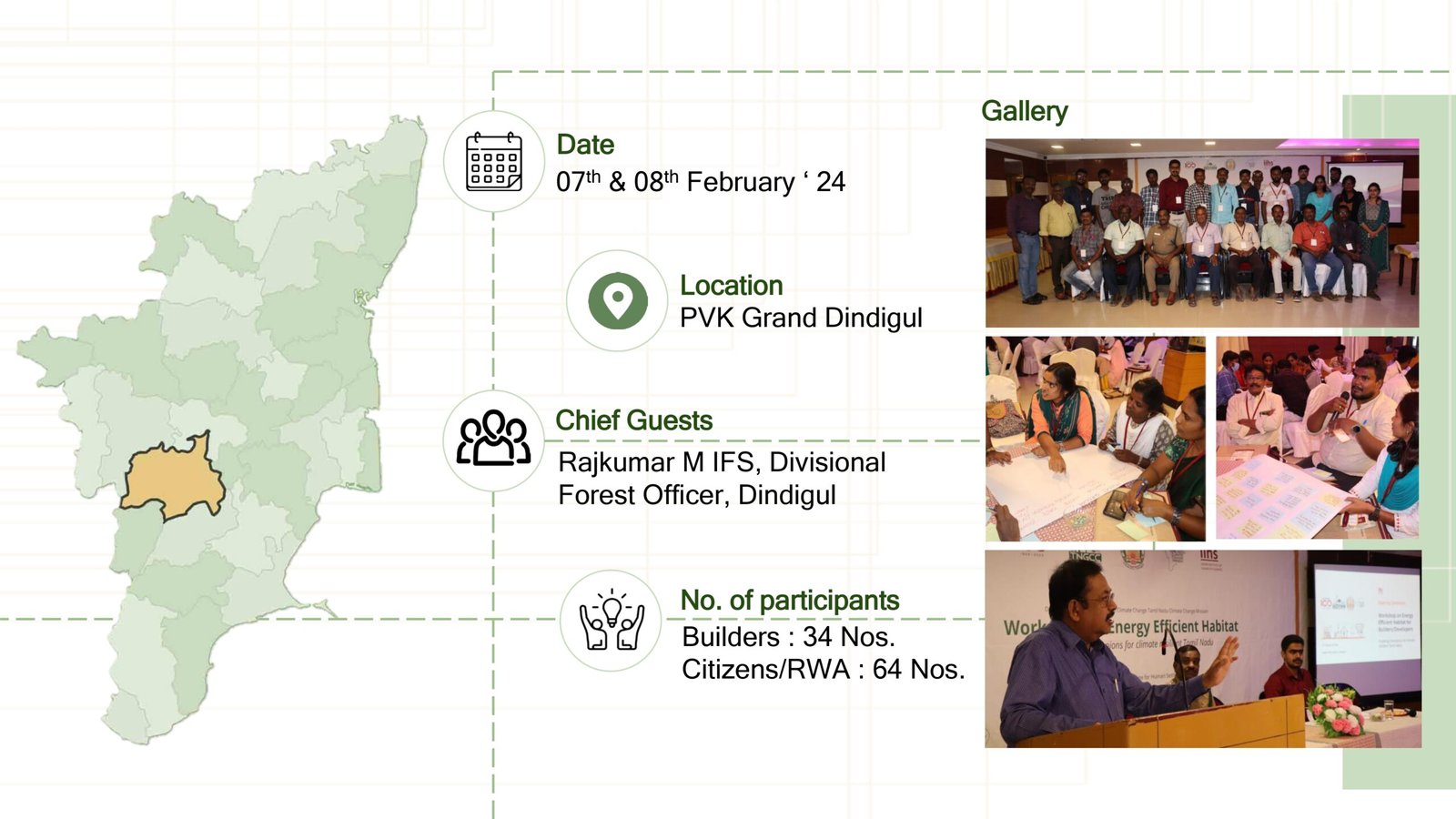
The group of participants from Madurai was energetic and interactive. Ar. Viswanathan Sridhar handled the sessions for the Builders/developers workshop and A. Rajakumar Baskar & M Monisha delivered the sessions for the RWAs/Citizens group. The participants from the builders group came up with healthy discussions on sustainable materials, community-level service initiatives for solid waste management, rainwater harvesting, etc. They suggested having more awareness programs focusing on the public. They also enjoyed and actively participated in the games and activities. |


Architect Abhilaasha N conducted workshops tailored for builders and developers, while A. Rajakumar Baskar and M. Monisha facilitated sessions aimed at RWAs (Residents’ Welfare Associations) and citizen groups in Tambaram. The engagement of the builder and developer community was notably high, with participants expressing enjoyment of the activities and games that enhanced their involvement throughout the sessions. Similarly, attendees of the citizens’ workshop in Tambaram displayed a high level of interactivity, with activists and civil society representatives actively contributing to discussions on pertinent social issues. It is noteworthy that the program in Tambaram garnered the highest turnout of participants among citizens’ groups compared to other cities. |

The group of participants in Trichy demonstrated active engagement. The sessions on both days were led by Ar. Iswarya R and Ar. Deepa Parekh. The builders/ developers group was ready to convince their clients to choose wisely and incorporate green practices in their projects. They are also willing to make conscious decisions in their daily lives. In the RWA and citizens session, the participants were interested in knowing more about climate change, solid waste management, green buildings energy efficiency, certifications etc. |
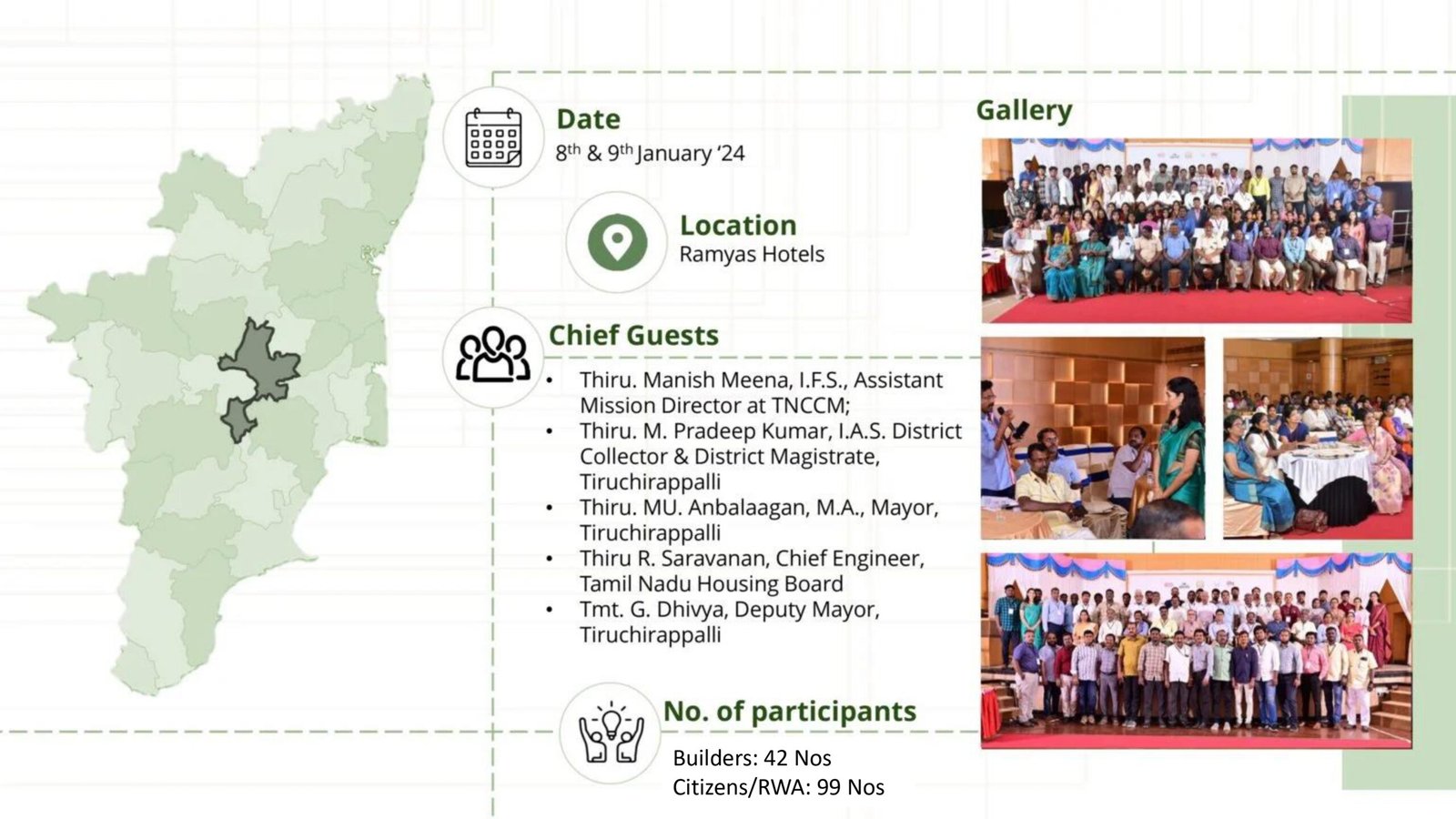
Ar. Anuviya Anbuselvam handled the sessions for the Builders/developers workshop and A. Rajakumar Baskar & M Monisha delivered the sessions for RWAs/Citizens group in Kanchipuram. The group of builders and developers appreciated the organizer’s efforts as they found the session very informative and helpful in their domain of work. Also, the participants are actively involved in the games and activities organized. |
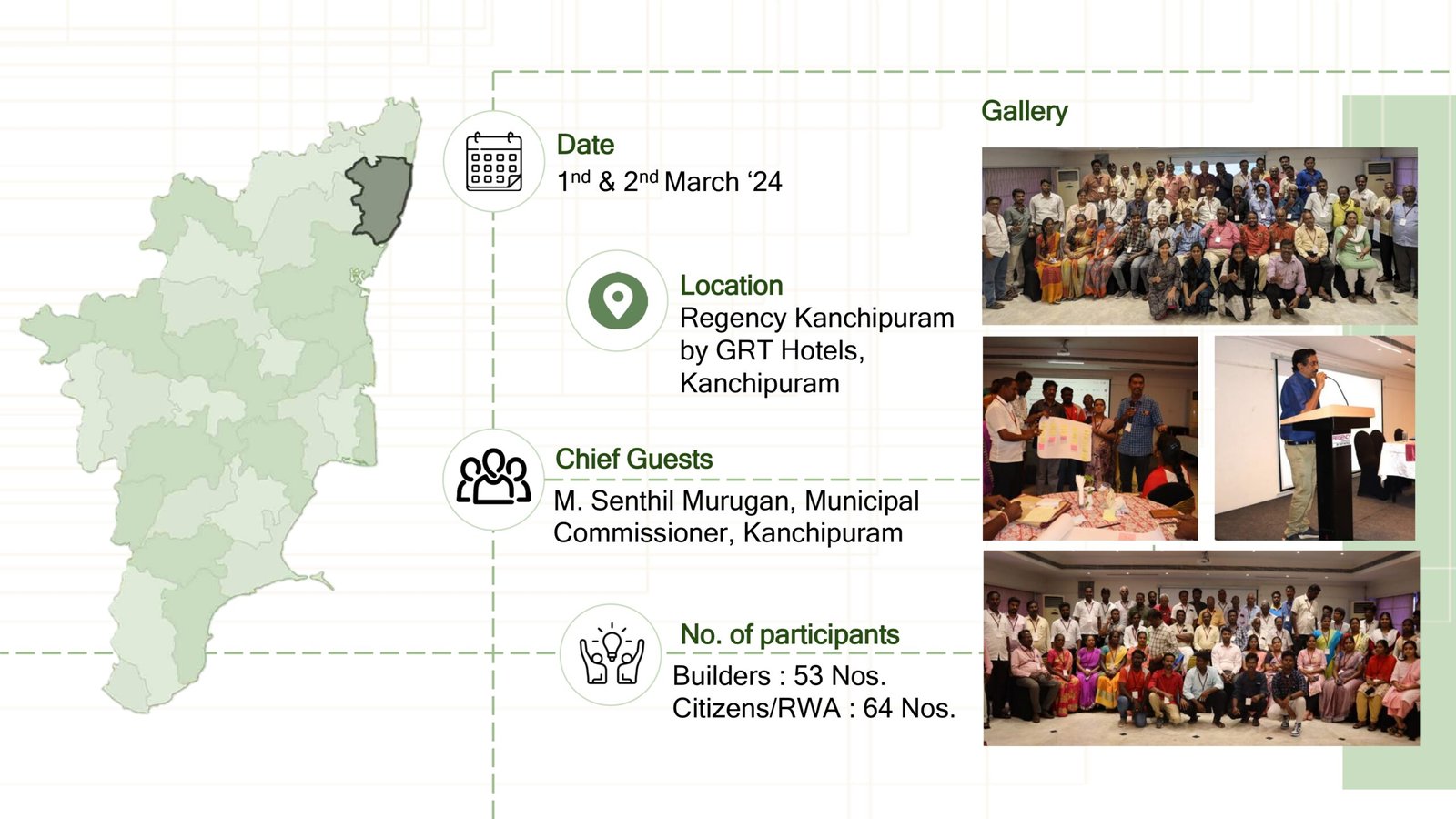
The group of attendees hailing from Vellore demonstrated active engagement, offering their perspectives, and commending the endeavour for its relevance in addressing the pressing needs of the workshop. Ar. Anuviya Anbuselvam handled the sessions for the Builders/developers workshop and A. Rajakumar Baskar & M Monisha delivered the sessions for the RWAs/Citizens group. The participants from the citizens group came up with their experiences in community initiatives in energy saving, rainwater harvesting, waste management, etc. They appreciated the efforts in organizing this event and emphasized the need for action from every individual. |
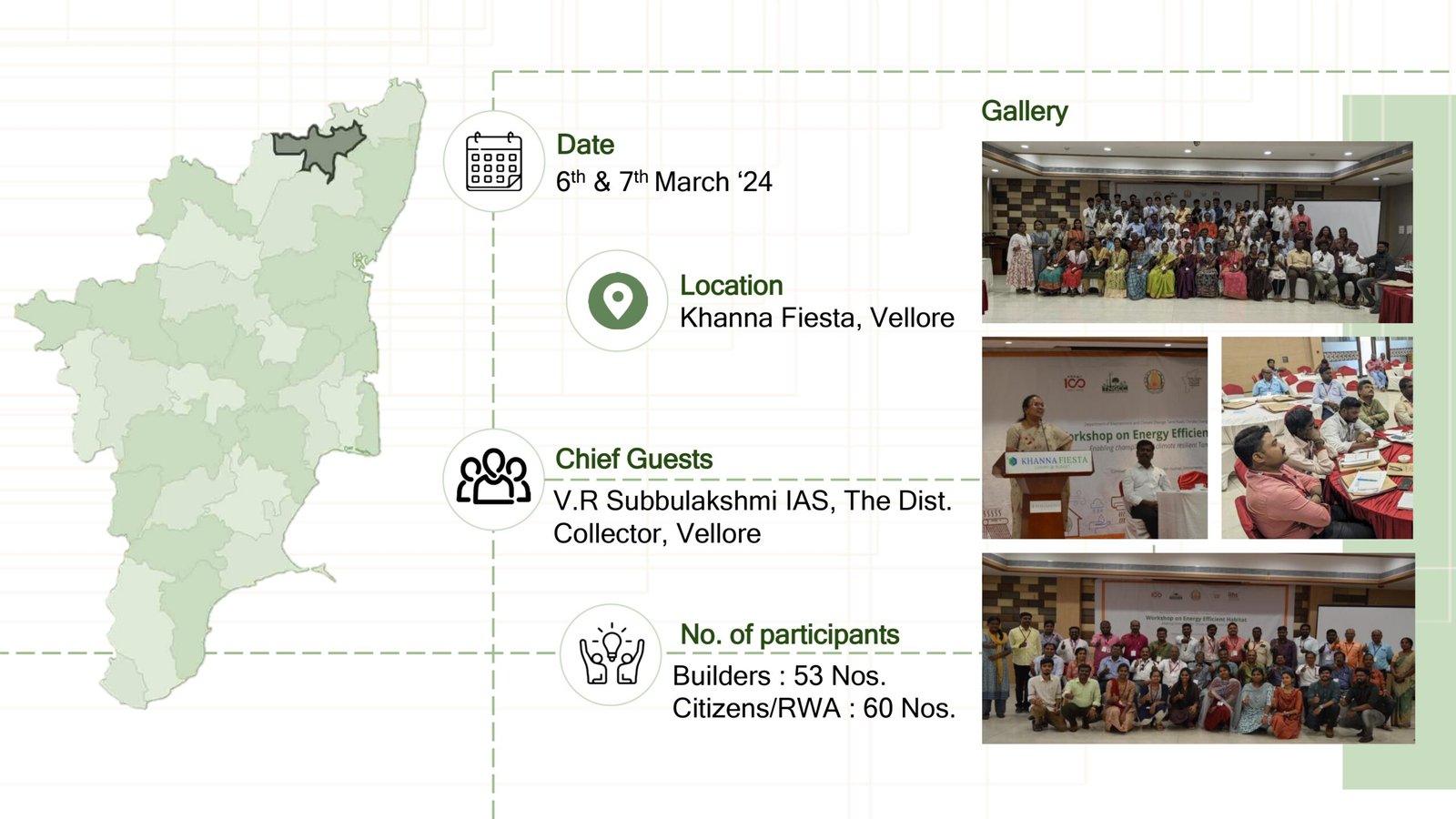
Ar. Viswanathan Sridhar handled the sessions for the Builders/developers workshop and A. Rajakumar Baskar & M Monisha delivered the sessions for the RWAs/Citizens group in Hosur. The builders and developers expressed their appreciation for the organizers’ efforts, acknowledging the session as highly informative and beneficial to their professional endeavours. During the RWA session, the group was diverse with participants as young as 7 years old. |

Ar. Viswanathan Sridhar handled the sessions for the Builders/developers workshop and A. Rajakumar Baskar & M Monisha delivered the sessions for the RWAs/Citizens group in Karur. |
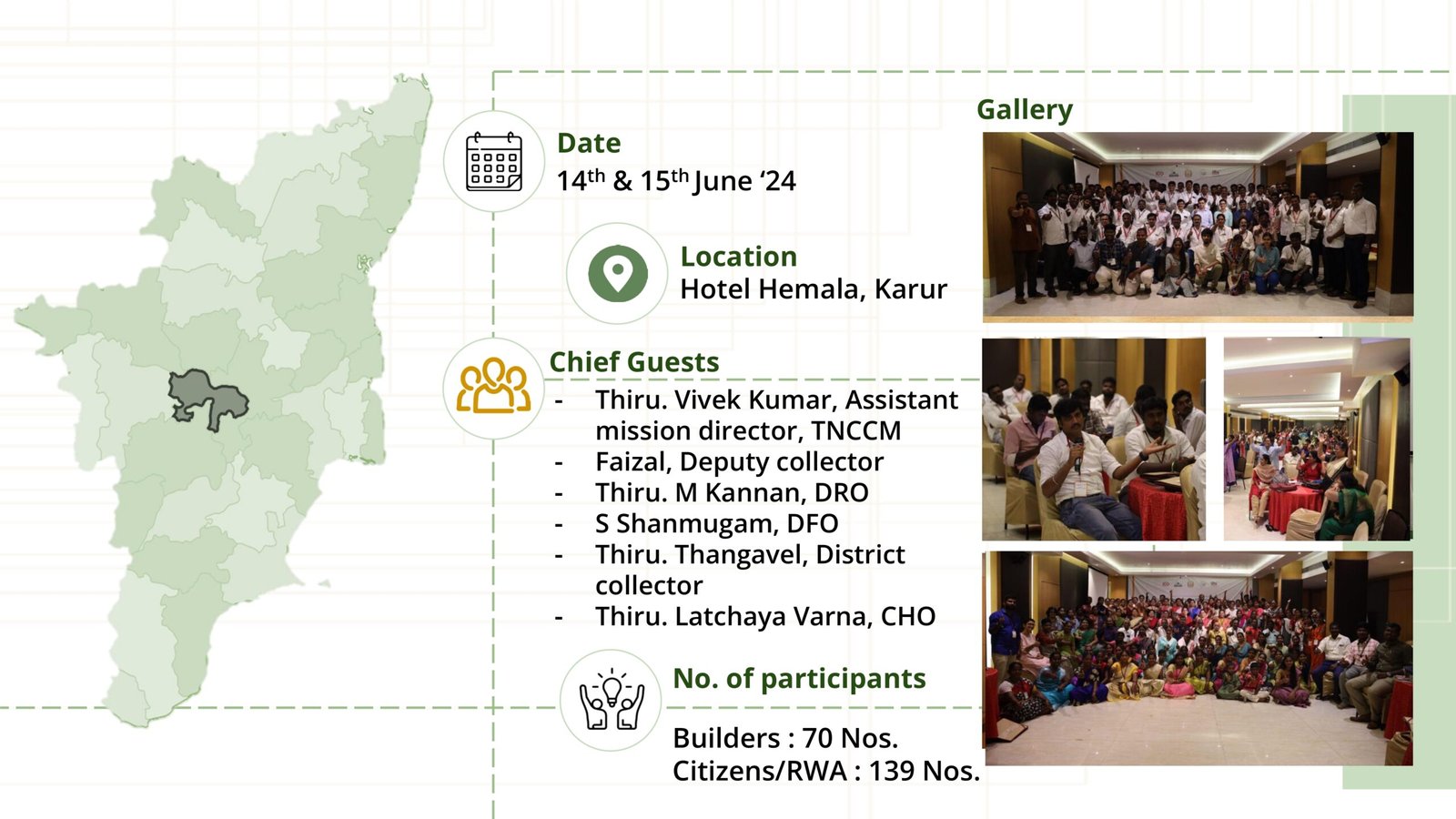
Ar. Viswanathan Sridhar handled the sessions for the Builders/developers workshop and A. Rajakumar Baskar & M Monisha delivered the sessions for the RWAs/Citizens group in Erode. |
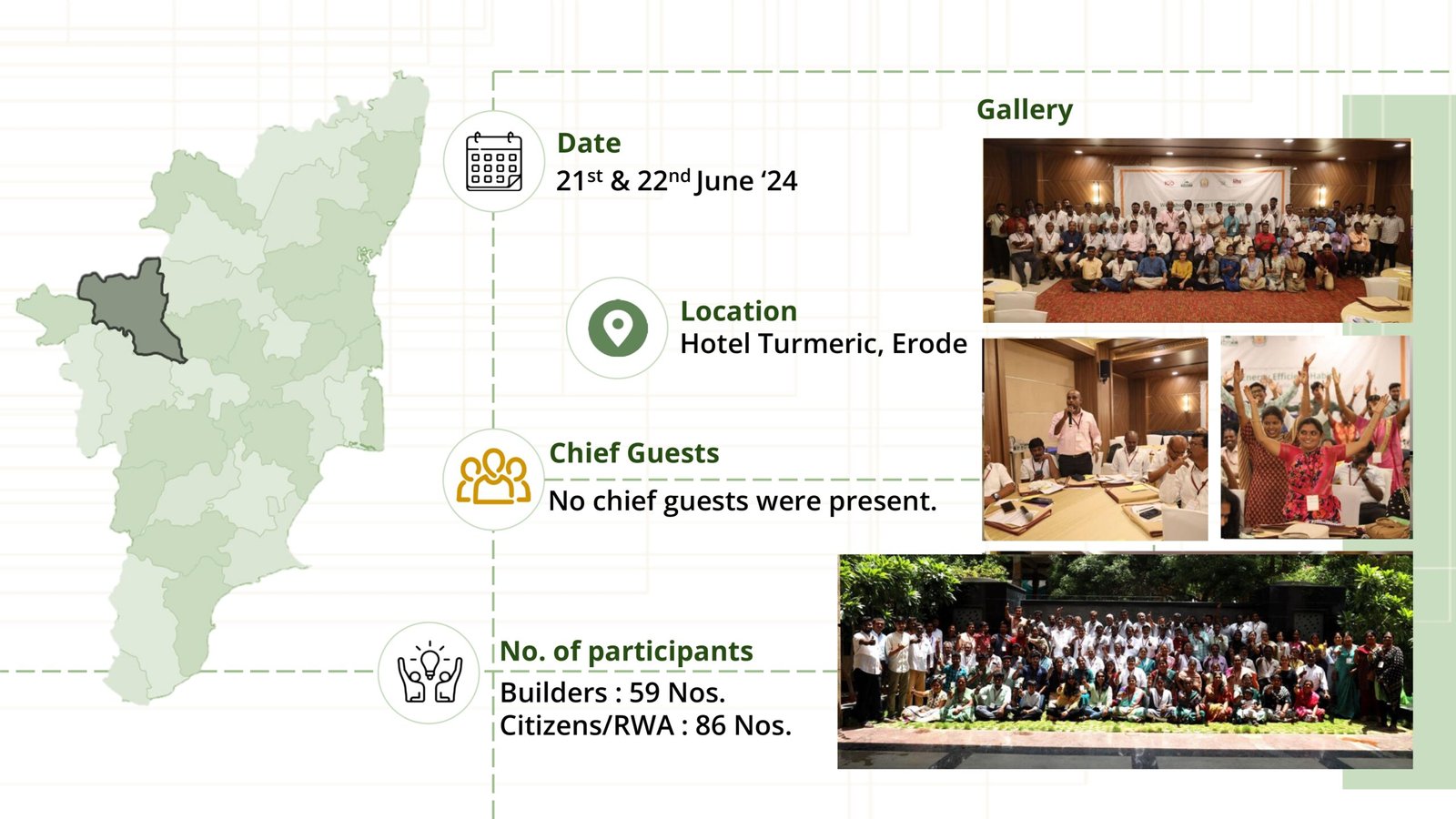
Ar. Viswanathan Sridhar handled the sessions for the Builders/developers workshop and A. Rajakumar Baskar & M Monisha delivered the sessions for the RWAs/Citizens group in Sivakasi. |

Ar. Viswanathan Sridhar handled the sessions for the Builders/developers workshop and A. Rajakumar Baskar & M Monisha delivered the sessions for the RWAs/Citizens group in Kumbakonam. |

Ar. Viswanathan Sridhar handled the sessions for the Builders/developers workshop and A. Rajakumar Baskar & M Monisha delivered the sessions for the RWAs/Citizens group in Thoothukudi. |
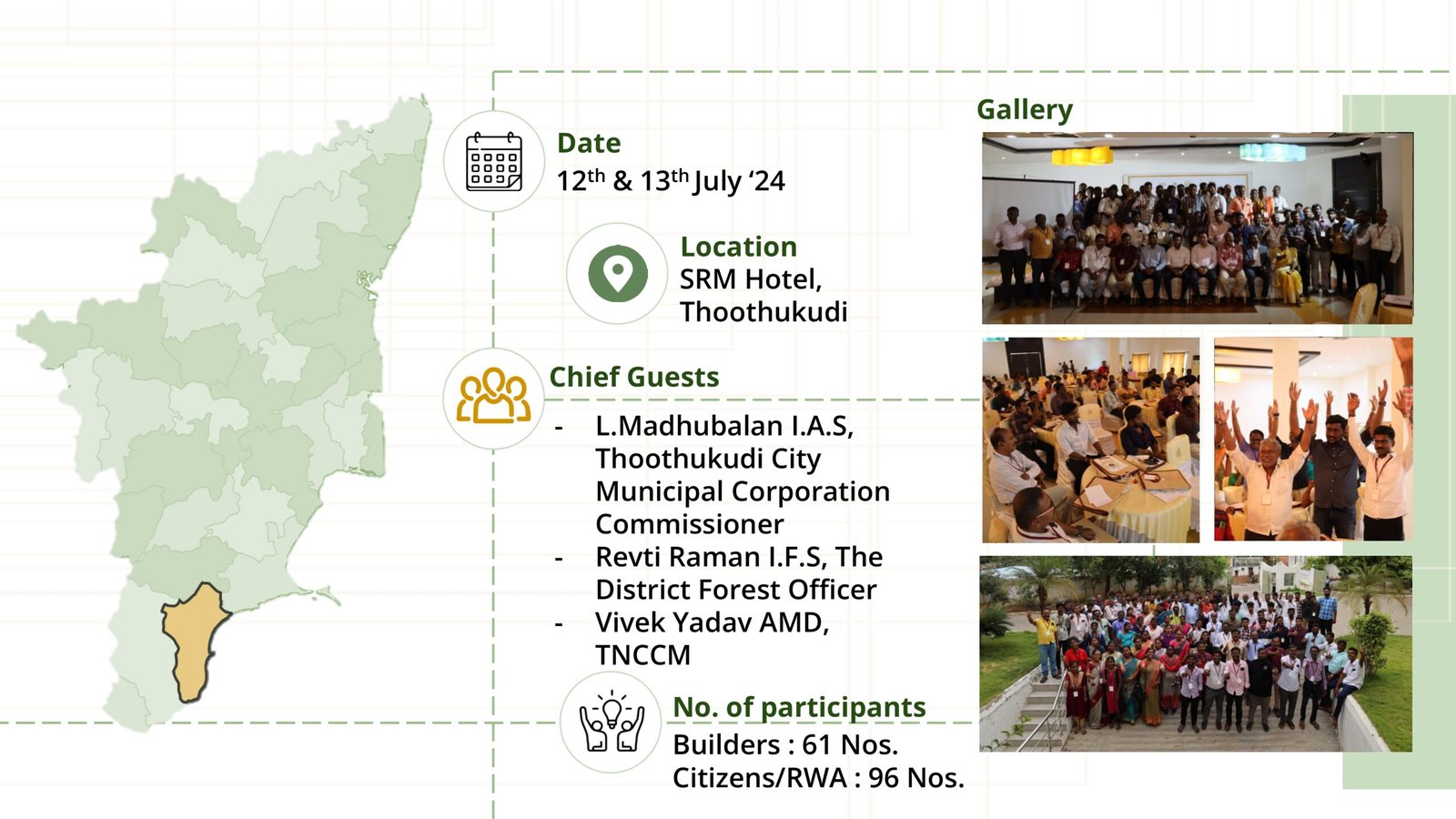
Ar. Viswanathan Sridhar, Abhilaasha N and Iswarya R handled the sessions for the Builders/developers workshop and A. Rajakumar Baskar & M Monisha delivered the sessions for the RWAs/Citizens group in Chennai. |
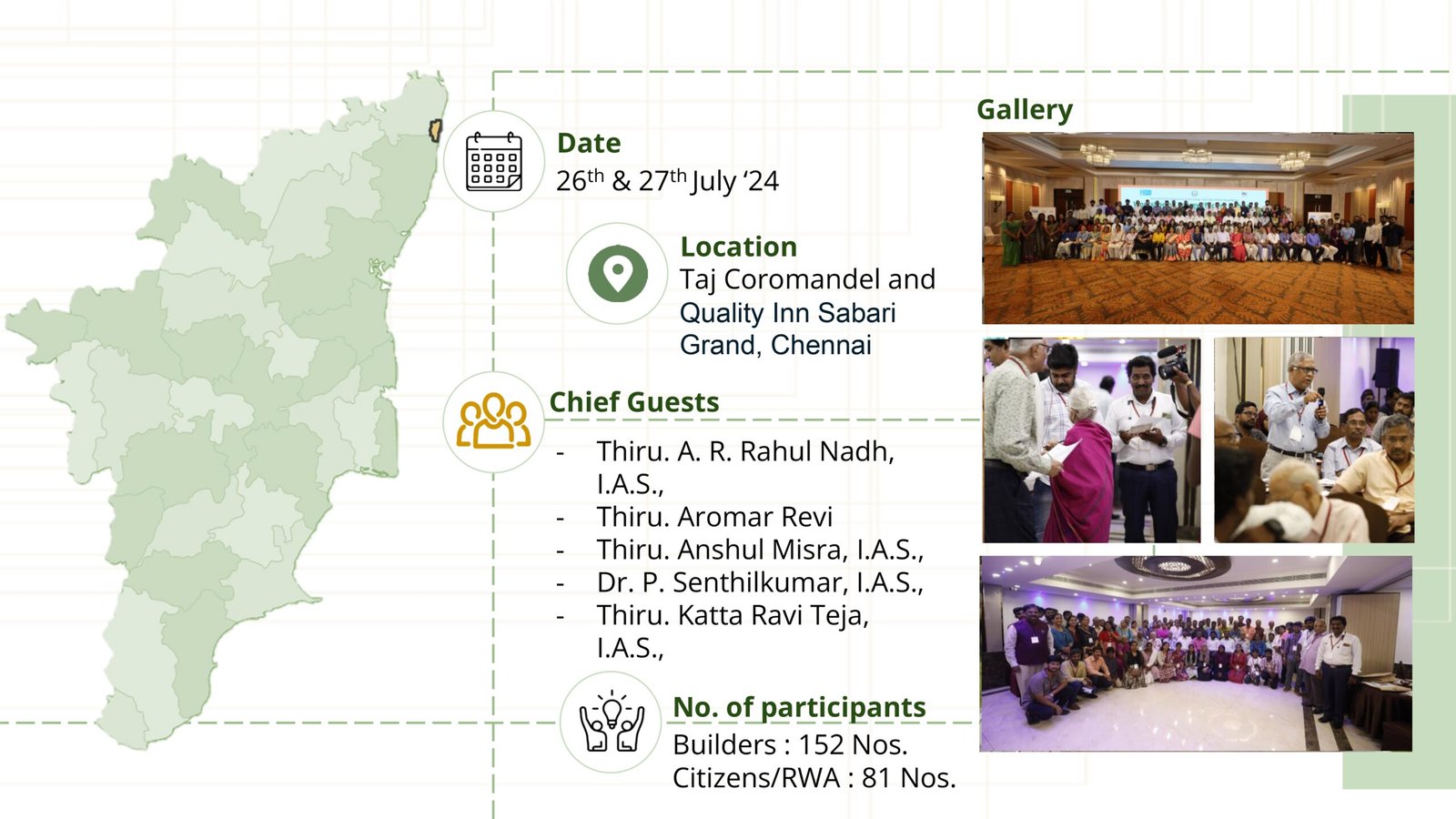
Ar. Viswanathan Sridhar handled the sessions for the Builders/developers workshop and A. Rajakumar Baskar & M Monisha delivered the sessions for the RWAs/Citizens group in Cuddalore. |

Ar. Viswanathan Sridhar handled the sessions for the Builders/developers workshop and A. Rajakumar Baskar & M Monisha delivered the sessions for the RWAs/Citizens group in Nagercoil. |
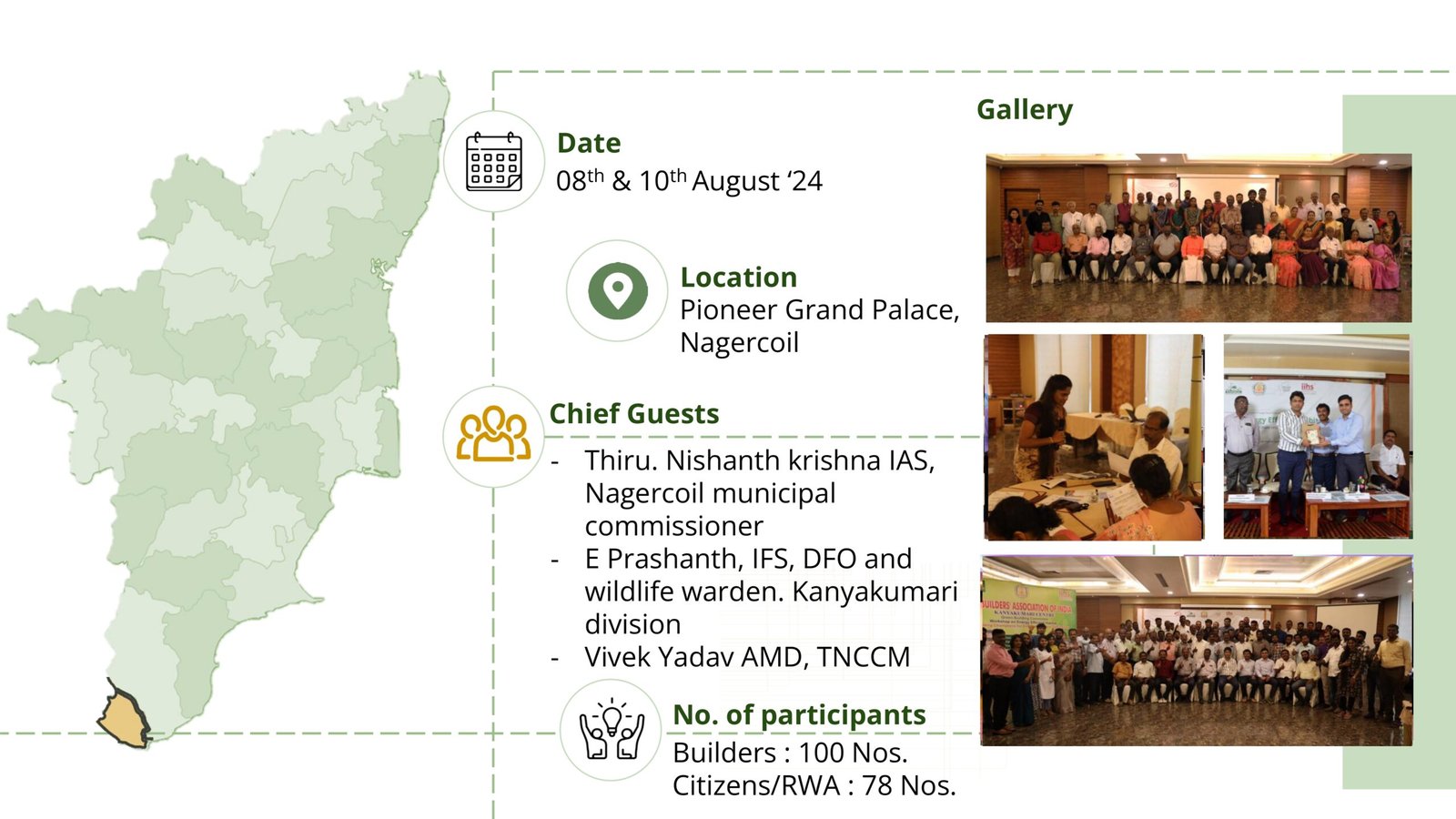
Ar. Viswanathan Sridhar handled the sessions for the Builders/developers workshop and A. Rajakumar Baskar & M Monisha delivered the sessions for the RWAs/Citizens group in Tiruppur. |
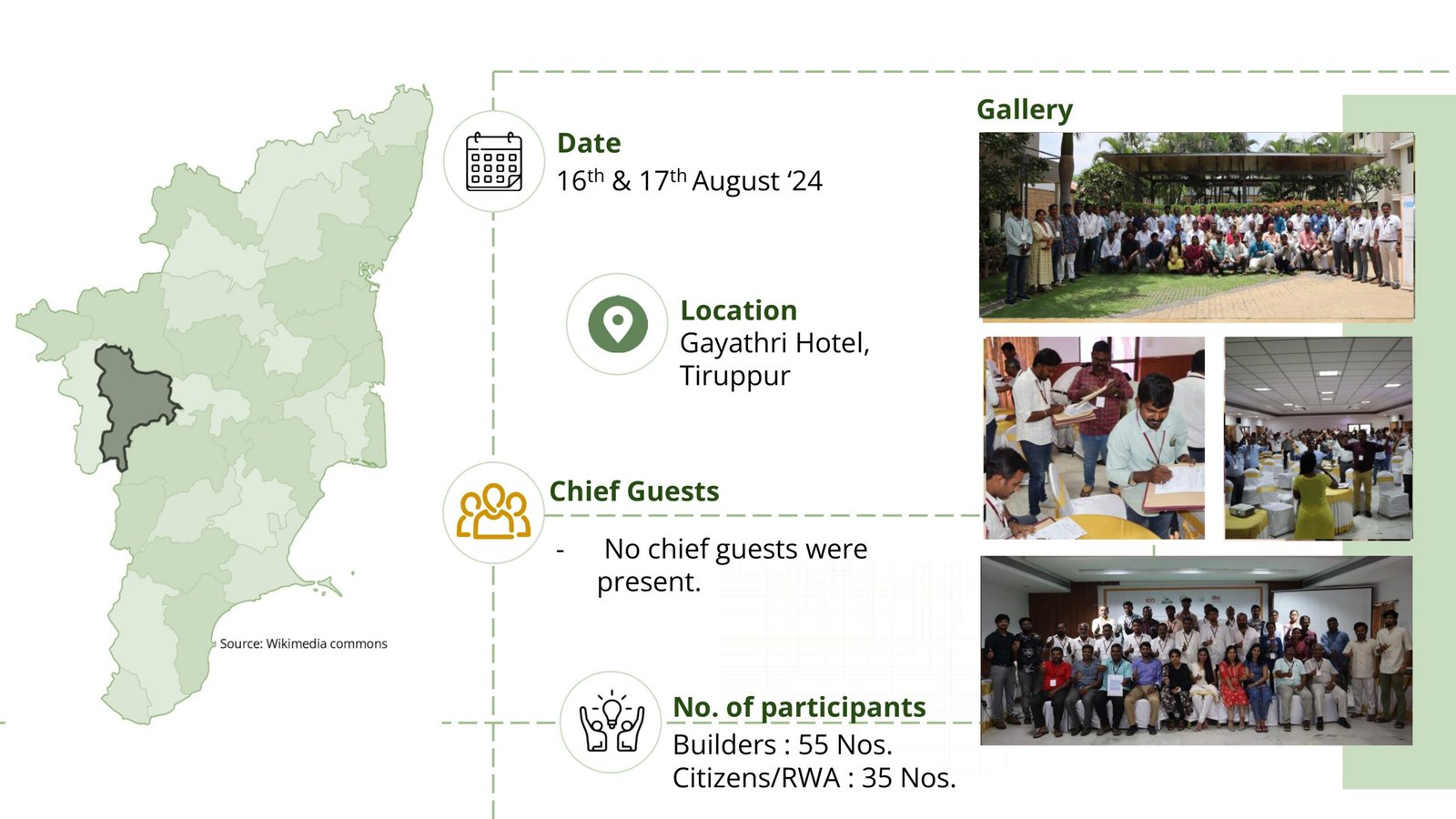
Ar. Viswanathan Sridhar handled the sessions for the Builders/developers workshop and A. Rajakumar Baskar & M Monisha delivered the sessions for the RWAs/Citizens group in Tirunelveli. |
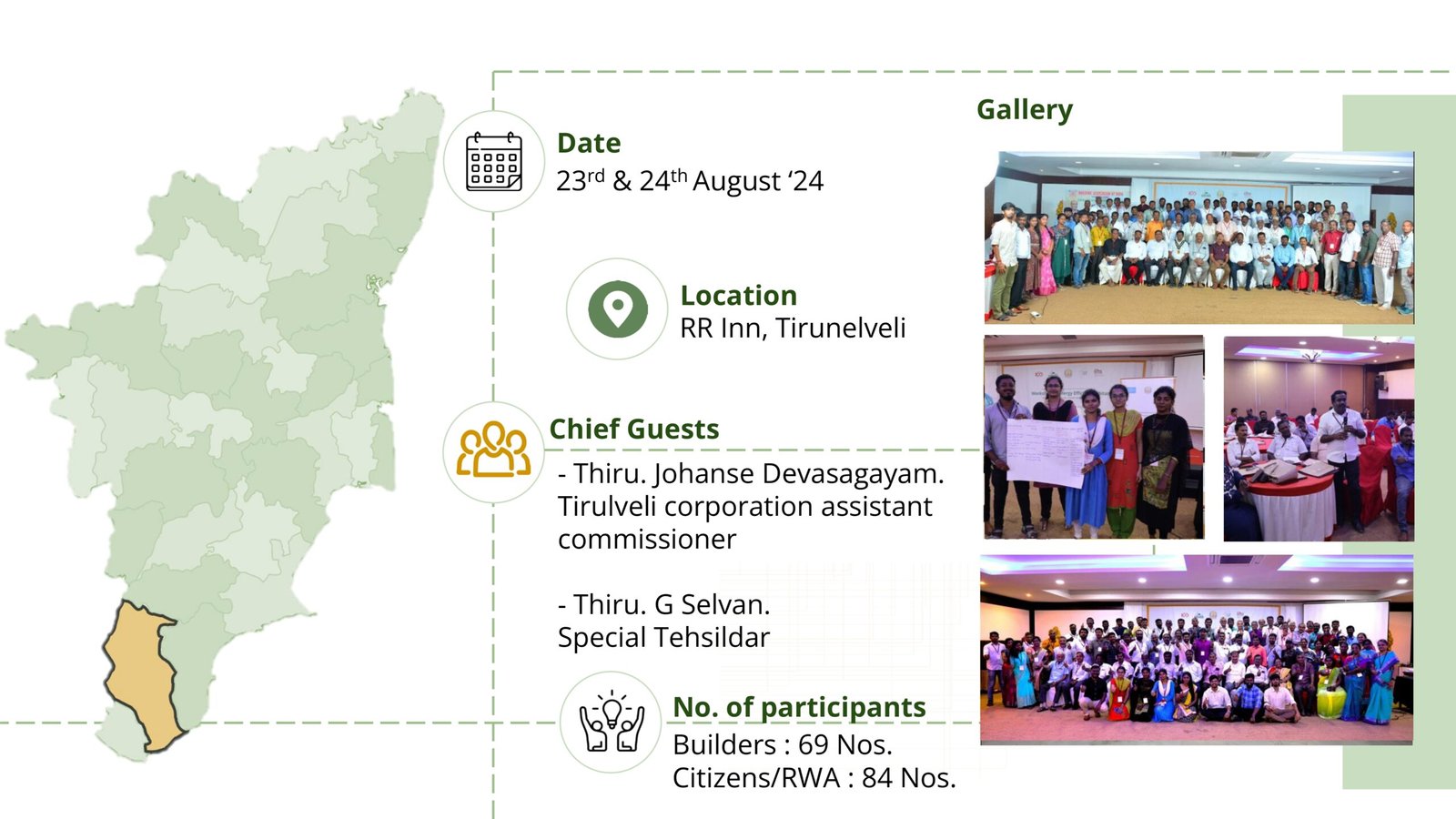
Ar. Viswanathan Sridhar handled the sessions for the Builders/developers workshop and A. Rajakumar Baskar & M Monisha delivered the sessions for the RWAs/Citizens group in Avadi. |

Ar. Viswanathan Sridhar handled the sessions for the Builders/developers workshop and A. Rajakumar Baskar & M Monisha delivered the sessions for the RWAs/Citizens group in Thanjavur. |

Workshop Gallery
- Avadi
- Coimbatore
- Dindigul
- Madurai
- Salem
- Tambaram
- Trichy
- Kanchipuram
- Vellore
- Hosur
- Karur
- Erode
- Sivakasi
- Kumbakonam
- Thoothukudi
- Chennai
- Cuddalore
- Nagercoil
- Tirupur
- Tirunelveli
- Avadi
- Thanjavur
Outcome Documents
The first workshop was conducted in Coimbatore and the programme received an energetic group of participants from coimbatore. The sessions were contextualized by the guest speaker, Ar. Bhuvana Sundar, who is the founder of Sundar Sundaram Architects, Coimbatore (SSA). He shared his experiences in green construction practices with the help of examples and emphasized on the choices on materials and construction techniques. By bringing in technical aspects, he helped participants understand challenges and how he solved them using green design principles and building materials. Mr. Marachi Subburaman, the founder of Society for Community Organisation and People’s Education (SCOPE) brought in conversation around the sustainable way of living and shared his experiences of living in a green building for the citizens group. He shared the techniques he used to reduce the heat inside the house, the rainwater harvesting system, biogas plant, composting units at home and the idea of a waterless urinal to reduce water consumption.
The guest speaker provided additional insights beyond the technical sessions. Participants desired more technical sessions on specific topics and requested a platform to share resources. The Coimbatore citizen group wanted further workshops on green living. TNCCM can capitalize on this by offering requested sessions and a resource platform, along with workshops on green living for the group in Coimbatore and beyond.
The programme welcomed a vibrant group of audience for builders’ group and citizens’ group of Salem. The programme received very valuable feedback from the participants as a major group of participants confirmed that they had a great understanding of the subject. They expressed a keen interest in more technical and engaging sessions that delve deeper into green building rating and certification systems, along with exploring the possibilities of implementing renewable energy options at the household level. Their curiosity extended to TNCCM’s initiatives in this area, and they requested information on advanced courses related to energy-efficient habitats.
The program fostered a sense of empowerment among the participants. Many viewed themselves as changemakers, ready to spread awareness about energy-efficient living within their communities and workplaces. This newfound passion, coupled with the widespread appreciation for the program, suggests a significant number of citizens are prepared to embrace a more sustainable lifestyle. The program effectively ignited a spark that has the potential to create a significant impact throughout the community.
The Trichy workshop had an active group of audience who responded and participated in all activities and games. The participants were interested in having follow up sessions & technical assistance, including more people from the industry etc. The builders/ developers’ group were ready to convince their clients to choose wisely and incorporate green practices in their projects. They are also willing to make conscious decisions in their daily lives.
The citizens group of Trichy was curious to learn more about each session and also getting more information and resources related to green buildings and green living. Mr. Marachi Subburaman, the founder of Society for Community Organisation and People’s Education (SCOPE) was the guest speaker for the citizens group In Trichy. He brought in the experiences of living in a green home and the techniques he practiced to reduce heat inside the house, rainwater harvesting etc. The crowd expressed a keen interest in learning more about climate change, solid waste management, green building energy efficiency, and relevant certifications. They anticipate that TNCCM will support students and professionals by providing technical assistance and engaging opportunities. Additionally, they are prepared to adopt changes in their lifestyles and behaviors, committing to green living.
The workshop saw an encouraging participant crowd from Dindigul who appreciated the workshop’s structure and delivery, noting that the sessions were easy to understand and fostered an environment where they could freely express their ideas. Many attendees expressed a keen interest in further exploring topics such as solar panels, energy-efficient materials, and green rating systems and its application processes. This interest highlights a growing awareness and desire for sustainable practices within the community.
The builders and developers group suggested that site visits would be beneficial to better grasp the practical aspects of sustainable construction and energy efficiency. This hands-on approach could help translate theoretical knowledge into actionable practices. Additionally, there was a strong recommendation to recognize and honor professionals who excel in constructing sustainable habitats and implementing energy-efficient designs and techniques. Such recognition could motivate more builders and developers to adopt sustainable practices. Overall, the program successfully engaged participants and provided valuable insights into sustainable construction and energy efficiency.
The Builder and citizens group of Madurai were very active, enthusiastic and energetic. The workshop participants from Madurai brought a vibrant energy to the event. They actively participated in discussions and activities. The builders’ group, in particular, sparked lively conversations.There were debatable conversations on manufactured sand(M sand) and river sand. It opened the way to the discussion around selecting appropriate/green/ eco-friendly materials. The concept of choosing local materials and supporting local craftsmanship were conveyed. Their focus extended to the community, proposing initiatives for solid waste management and rainwater harvesting. They even suggested broadening the reach of these ideas through public awareness programs.
The Madurai citizen’s group was left impressed by the program’s informative content and valuable resources. They were eager to learn more about TNCCM and its efforts to combat climate change in Tamil Nadu. Enthusiastic about further involvement, they expressed their desire to participate in similar awareness programs. They suggested making TNCCM’s initiatives and programs easier for citizens to access. This way, more people could learn about and participate in TNCCM’s efforts.
The builder and developer community of Tambaram really enjoyed the activities and refreshers which kept them more attentive throughout the session. They were more interested in the affordability of green materials and green techniques. In particular they inquired about the accessibility of these concepts by the middle income and lower income class of society. Also they were eager to know more about the incentives that can avail through constructing green certified buildings. While some builders already implemented green techniques, many were unaware of the benefits associated with green buildings. This session sparked their interest in learning more about sustainable building practices.
Tambaram’s citizen workshop boasted impressive participation, fueled by the active engagement of social activists and civil society representatives who brought critical social issues to the table. Beyond the discussions, a few residents expressed strong interest in visiting a green home to see these concepts in action. Their enthusiasm extended to spreading awareness within their communities, highlighting a strong desire for more citizen-focused programs. This workshop also saw the highest attendance among citizens group compared to other cities, solidifying the interest in sustainability within Tambaram’s community.
The group of builders and developers from Kanchipuram appreciated the organizers efforts as they found the session very informative and helpful in their domain of work. Also the participants were actively involved in the energizer sessions and activities organized. One among them shared their experiences in constructing a green building and the benefits of choosing the appropriate material for each stage. The workshop provided a platform for the Kanchipuram Builder community to learn from their peer group.
Kanchipuram’s citizen group applauded TNCCM’s unique initiative to raise awareness about energy-efficient homes. They expressed appreciation for the clear and accessible way the information was presented. Furthermore, they offered a valuable suggestion: expanding these awareness programs to encompass the broader community, including children and students. This forward-thinking approach highlights the importance of educating future generations about sustainable living.
The group of attendees from Vellore demonstrated active engagement, offering their perspectives and commended on the relevance in addressing the pressing needs of the workshop. The participants extended their suggestion to include more common people in future workshops, recognizing the value such events could bring to a broader audience. They found the technical sessions particularly useful and beneficial. A representative from VIT’s Architecture department offered technical support in green materials and technologies. This opens a potential collaboration with technical institutions to promote green building practices. She mentioned a software called climate consultant which is a graphic-based computer program that helps architects, builders, contractors, homeowners, and students understand their local climate. Additionally, some participants expressed curiosity about TNCCM’s efforts in their district and sought information on how they could access these resources and support.
The participants from the citizens group came up with their experiences in community initiatives in energy saving, rainwater harvesting, waste management etc. The experiences shared among the peer group was inspirational for all participants. They appreciated the efforts in organizing this event and emphasized the need for actions from every individual. Overall, the event was a significant success, fostering an environment of learning and inspiration. Participants not only gained valuable technical knowledge but also felt empowered by the community-driven initiatives shared during the sessions.
The builders and developers of Hosur expressed their appreciation for the organizers’ efforts, acknowledging the session as highly informative and beneficial to their professional endeavors. The participants of the builder group were very interactive and conversations happened around the topics like building materials evolution over the decades and how innovations in managing demolition wastes or debris can be a potential source of building materials in future. There were expert people in the room with hands-on experience in constructing certified buildings which enabled a very good learning opportunity for the rest of the participants. Many of the participants came to know about the certified buildings in Hosur from the discussions. Client preferences were also part of the discussion, including those seeking green buildings for business requirements and those prioritizing personal eco-friendly living. Active discussions happened around the rural urban migration, its causes and the need to create self-sufficient villages. To curb rural-urban migration, creating more job opportunities in rural areas was a key suggestion. Carbon credit scheme, CMs solar incentive,rain water harvesting systems etc. were the other topics that came out for discussion from participants.
The Citizens group of Hosur also actively participated in all the games and activities. Many participants commented on the relevance of the topics discussed, conveying that the insights and knowledge gained are going to greatly influence their daily lives. They appreciated the programme and shared their willingness to spread the word among their communities.
Karur’s turnout was impressive, particularly for the citizen workshop on day two. This reflects the community’s strong interest in social and local climate action. Karur’s builders’ and developers group actively participated, sharing knowledge and demonstrating a willingness to learn. Their experience-sharing sessions sparked many discussions, with one participant emphasizing the crucial role of client understanding and knowledge of green and energy efficient buildings. In general, people would prefer new materials for their new home, and many are unaware of the better technologies like filler slab, rat-trap bonds etc. They shared the circumstances where clients approved these because they were aware of the benefits and the importance of helping the client to make informed choices. The discussions also focussed on Green rooftop gardens in all buildings, green building materials and alternatives, the importance of utilizing maximum natural light and ventilation, idea of auto climatic skin system for the buildings (Kinetic thermal dynamic facade/kinetic architecture), how to control termites infestation etc. One among them shared the experience of building a trial sewage treatment plant in an old factory complex with zero percent emission from the discharge. As there are many industrial clusters around, a sustainable model like Auroville could be considered and replicated was also suggested. The availability of skilled labor in every part of the district was an important challenge for them in practicing green techniques.
The citizen workshop in Karur boasted a large and energetic audience, with a significant number of women participants. The participants were diverse as there were representatives from RWAs, local politicians and teachers. Many conveyed that they understood the importance of lifestyle change and behavioral change in addressing issues like climate change.The focus was on individual actions, household level and community level actions: many attendees emphasized the importance of lifestyle changes to address climate change. During the group activity, a number of things were listed on what they do currently and what they can do at home. The actions listed included how to choose and use appliances, how to use cooking fuel effectively and the energy saving options like cooking with lid on, source segregation of waste and kitchen waste composting, kitchen and roof gardens, mindful usage of energy, water and appliances etc. The women were particularly enthusiastic, drawing on their experiences and expressing eagerness to share these learnings with their communities.
The workshop programme at Erode received a very interactive and enthusiastic set of participants for both the workshops. This helped the workshop to become more of a discussion ground and a platform for learning from the peers. The programme witnessed a healthy way of knowledge sharing among the participants. The major discussions happened in the builders group can be summed up into the following topics:
- Material efficiency and use of daylight – Using filler slabs to use materials efficiently, using appropriate window placement (northern side ) to increase daylight and reduce energy consumption.
- Lack of awareness and efforts required to convince clients – Challenges like convincing clients who wish to build more with less money and searching for loopholes in the regulations. The codes and regulatory documents which are applicable, can be discussed with the client to overcome this challenge and was identified as a solution.
- General awareness and mandatory rules- The factors like client’s interest and support, clients satisfaction etc influences greatly on the construction process. Creating an awareness about renewables, recycled and efficient materials and technology and even making some mandatory rules is required. As an example they explained the Rainwater harvesting systems
- The vernacular solutions – Courtyard concepts, passive cooling, local materials and technology etc can be great solutions for reducing heat gains.
They also shared practical measures like low flow taps for water saving, separate waste water lines in toilets and using treated greywater for gardening, rainwater harvesting tanks, SWM systems, kitchen waste composting for vegetable gardens, covered parking etc.
The RWA group came up with their experiences in:
- Saving water and energy at household level – One participant shared his experience in investing 20,000 in infrastructure and saving a lot of money and energy, Solar panels at home, methane gas for cooking.
- Energy saving at workspaces – Behavioral changes like switching of lights when we leave of lunch
- Sustainable transport options – use of cycles, carpooling, public transports, not to use Ac in vehicles when we have a better weather
- Building material selection – Raised concerns about more use of glass in facades as it doesn’t suits our climate
- Road widening and drainage lines are being installed under footpaths as part of smart city development. They raised concerns about cutting down trees on the road side – TNCCM representatives have communicated that new policies related to this are in the pipeline, which will be out in 4 months and he communicated that there are rules to plant 10 trees for every one tree removed for development.
- They suggested having collaborations with NGOs to take up more impactful initiatives on ground.
The programme received very valuable insights from the participants of Erode. Participants confirmed that it was a great learning day at the workshop and they appreciated the way in which it was conducted.
The programme accommodated a vibrant group of participants from Sivakasi. The builders group of participants shared their diverse experiences like implementing solar roof tops in almost all buildings constructed, rainwater harvesting and groundwater recharge initiatives which made a difference in the groundwater level in Sivakasi. In addition, they discussed the Sivakasi Green forum, a community initiative to bring together – businesses, government, students, authorities, political arena and other social activists / organizations towards environmental protection. They talked about the projects like Miyawaki islands, rainwater harvesting through public wells etc executed under the green forum.
Major points covered in the discussion of builders group are as follows:
- Knowledge Gap:
- Lack of technical knowledge and professional expertise in green building design and construction
- Limited awareness among the general public and clients
- Resource Constraints:
- Budgetary limitations can restrict the use of some green technologies and materials.
- Difficulty in sourcing or accessing readily available green building resources
- Client Hesitation:
- Clients may be hesitant to accept alternative or reused materials due to unfamiliarity or negative societal perceptions.
- Resistance to incorporating open spaces or adhering to setbacks due to high land value
- Research-Practice Disconnect:
- Gap between research advancements in green materials and their practical application in the construction sector – a researcher and builder conversation happened on geopolymer concrete
- Local research and development efforts focused on creating cost-effective green materials and technologies can address budget limitations.
- Embracing Alternatives:
- Investigating and promoting the use of alternative building materials like thermal blocks (which is common in UAE) can enhance energy efficiency.
Additionally, the builders and developers group discussed the importance of positioning rooms according to vastu and constructing site-responsive buildings without cutting down any trees in the plot. As an example, one of them said he would build his own house in a sustainable and green manner. The faculty from Mepco Schlenk Engineering College, Sivakasi has shared initiatives on campus such as waste management, rooftop solar, Miyawaki forests with more than one lakh trees, eco ponds, and rainwater harvesting.
During their discussion, the citizens group shared how sudden changes in weather impacted their daily lives and how health issues affected their lives. The participants appreciated the workshop and learned new things from the workshop.
The two day workshop series at Kumbakonam received an active participation from builders, developers, community representatives and citizens. The builders community shared their experiences working with government projects on the first day of the workshop, including planting over one crore saplings along the coastline of Tamil Nadu to conserve mangroves, planting tree saplings along the roadside from Pondicherry to Velankanni, and in public places in Kumbakonam. A participant also shared his experience protesting to save a park in his neighborhood.
The major discussion topics that came up in the builders workshop are:
- Selection of appropriate materials – Many participants in the group shared that they reduce the use of wood in construction, such as replacing wooden windows with UPVC windows. In addition to AAC blocks, gypsum plaster was discussed as an alternative. The importance of optimizing the use of materials was also emphasized
- Eco-friendly practices for every project – proper site and drainage analysis, preserving trees in the site, provide open spaces, rainwater harvesting, Positioning of septic tank and soak pits, Grey water recycling , groundwater recharge, solar power on all projects etc
- Research on new materials and technologies – One participant shared that he is researching post tensioned slabs to make them more affordable and to use them on small buildings.
- The major challenges faced by builders of Kumbakonam was discussed and listed as follows:
- Client’s choices and satisfaction
- Increase in cost of materials, and issues in resource accessibility
- Lack of awareness
- High land values
- Convincing clients – they rely on advertisements rather than listening to industry experts.
The green fellow from Kumbakonam, shared the platform called Green Tamil Nadu Mission where individuals , NGOs, Communities or Civil societies can update their green initiatives. By doing this, TNCCM will be able to better understand the state’s community initiatives.
Kumbakonam’s citizens group also actively participated in the activities and responded to the program. They discussed how climate change impacts their lives. Many reported experiencing sudden weather changes and health problems as a result.
The discussion also turned to how we can possibly behave at household level to conserve energy. One person emphasized the importance of keeping lights off when not in use. Another participant shared a resourceful tip: using an abandoned borewell to collect rainwater and replenish groundwater levels.
The workshop at Thoothukudi welcomed an energetic group from the city on both the days. They were very enthusiastic and actively participated in the programme. The builders community shared their experiences in convincing their clients for alternate materials, or technology. According to the group from Thoothukudi, convincing the clients to choose alternate materials, green methods of construction etc are the biggest challenges they face in practice.
The participants brainstormed the following action points to integrate in their construction practice:
- Minimizing Environmental Impact: Reducing wood usage and exploring alternatives, limiting cement plastering, and optimizing material use.
- Smart Planning & Resource Management: Proper site planning for services like soak pits, septic tanks, and wells.
- Enhancing Comfort & Efficiency: Prioritizing natural lighting and ventilation, and utilizing fly ash bricks, AAC blocks, UPVC windows, and adhesives as M-sand alternatives.
- Harnessing Renewables: Implementing rooftop solar panels and rainwater harvesting systems in all constructions.
- Promoting Urban Greenery: Encouraging vertical gardens, rooftop gardens, and green walls.
- Strict adherence to Regulations: Maintaining strict adherence to building codes, including setbacks, even when faced with client pressure.
The citizens group of Thoothukudi actively participated in the workshop and appreciated the efforts taken by TNCCM and IIHS in organizing the programme. The group was enthusiastic about sharing the ideas to incorporate in their lifestyle, which can create a significant impact in the long run.
The ideas discussed among the group can be listed as follows:
- Household waste management – Importance of handling the waste at source, proper segregation etc was discussed . A participant also shared the availability of composting units through Thoothukudi Corporation.
- Resource access for waste management units – One among the participant highlighted the importance of availability of enough resources like electricity for waste management plants
- Behavioral changes/lifestyle changes – Reduce food wastage, reduce food parcels, reduce shopping habits, keeping a monthly shopping list for the kitchen to avoid unwanted purchases, concept of minimal living, choosing used /preloved materials, etc.
- Spreading awareness – share the small initiatives and innovative ideas you practice in social media platforms to inspire people.
The people also shared their experiences in working with community organizations like All can trust, Thoothukudi in environment conservation programmes. Many appreciated the knowledge they gained as they can share the learnings in family and at the workplace.
The builders and developers workshop at Chennai was a big event covering builders and developers across the chennai region. The programme received a very energetic and enthusiastic group of participants even from different parts of the state on the first day. The programme also witnessed key messages from dignitaries representing the state and city government, on Chennai’s and Tamilnadu’s initiatives steering towards sustainable development. They emphasised the importance of immediate action and addressed this programme as a call for action. IIHS director, Aromar Ravi highlighted the importance of climate resilient development in Chennai and he explained an eightfold pathway to achieve the same.
The builders and developers community shared their diverse experiences and opinions on green construction practices. Many were supporting the green rating and certification systems but few were against the terms green and sustainable as it may only focus on the business aspect, not the real change on ground. They suggested that the real focus should be on practising green, not merely on green rating and certification systems. Similarly diverse opinions were coming around the legislation of green materials and technologies. According to a participant, the government cant legislate the norms for green building because it cannot be a set of mandatory written rules. A builder/developer/architect should know the building science, materials, technologies and climate and weather in a way which a farmer or fisherman understands the weather. According to the builder group from Chennai, architects and builders should be responsible for the site planning, location of functional spaces and building plan, material and technological aspects of the building. Their discussions also outlined reasons why clients are not convinced of the concept of green buildings, including the fact that it takes more time to construct, is more expensive, and might not look as appealing as modern conventional buildings.
Following are some action points the group brainstormed to implement in their construction practices:
- Conserving and retrofitting existing built stock: New constructions are more energy intensive, so we should preserve and reuse what we have instead.
- Site Planning & Resource Management: Maintaining green spaces,provisions for rooftop gardens and green walls, wastewater recycling and solid waste management, replacing conventional concrete slabs with filler slabs and minimising exterior and facade in accordance with solar radiation.
- Comfort & Efficiency : Micro climate based fenestration design, cross ventilation, recycling of debris and reuse materials, using plastic and glass bottles in construction
- Harnessing Renewables : Implementing rooftop solar panels and rainwater harvesting systems in all constructions.
- Following Regulations and making choices: Maintaining strict adherence to building codes, including setbacks, even when faced with client pressure. Dropping clients and contractors who don’t follow regulations and avoiding harmful, hazardous and non sustainable materials.
They also emphasised on the importance of making changes on an individual scale and at a family level. As well, they appreciated the public program, as more public programs like this should be offered to stakeholders in building construction.
Participation in the workshop by the citizens group from Chennai was also impressive. They also listed things they can start with and provided examples of lifestyle and behavioural choices based on their experience. The discussion points can be summarised as follows,
- Five star rated electric appliances, LED lights and BLDC fans
- Biogas plants, waste management, waste segregation at source
- Cleaning gas burners frequently, using appropriate vessels and cooking with lid on
- Switching of lights and other appliances when not needed
- Keep the windows open whenever comfortable and reduce the use of fans
- Preparation of bio enzymes at home
- Reusing clothes for making floor mats and curtains etc.
They also questioned why public buildings are not adhering to green techniques and how rainwater would percolate into the ground when the roads are completely concreted. They stated examples of 20 year old green buildings in Chennai and why more construction that came up after that are not green at all. They did appreciate the concept of initiatives from an individual, family and community perspective but they also look forward to more scientific solutions for existing problems from the state. The room witnessed diverse stories as the participants ranged from a school student to a 90 year old lady.
The energy efficient habitat workshop series at Cuddalore received a very active group of builders, developers on the first day and RWA representatives and citizens on the second day. The builders community shared how they experience the effects of climate change in their daily lives, the change of seasons and its impact on agriculture. They identified the adverse impacts on the livelihoods of fishermen in Cuddalore, un-bearable temperature increases and heat stress during summer, and agricultural loss due to high intensity rainfall. Cuddalore’s microclimate is changing as a result of climate change, according to many residents. An active experience sharing and solutions discussion happened during the session and the major discussion topics that came up in the builders workshop are:
- Using appropriate materials – Material suggestions came to the room are copper slag to replace fine aggregate, Cocopeat in concrete and mortar, use of recycled plastic and glass bottles, Porotherm bricks for walls (clay hollow bricks) which doesn’t need plastering, recycling and reuse of construction debris and building components. They also mentioned utilising facilities like auroville and supporting sustainable construction research.
- Site Planning and Harnessing renewables on site – Understanding whether the land is suitable for construction is the first aspect according to the community from Cuddalore. People shared the experience in convincing clients for large windows for ventilation, proper landscaping including vegetation and less hardscaping etc. constructing rainwater harvesting plants for all projects instead of keeping them merely on permit drawings, Solar roof tops for buildings etc were also suggested.
- Minimalistic and efficient approach – Participants came up with suggestions like minimal use of water and energy for construction, the importance of communicating it with labourers, Convincing clients on what they actually need, more spaces for green and preserving existing trees etc, using only optimum resources whatever is needed.
They questioned the provision for land regularisation with fine, as it can only lead to more land use conversions for construction. They stressed the importance of updating knowledge as a stakeholder in the construction industry.
Cuddalore’s citizens group also actively participated in the activities and discussed how climate change impacts their lives. They also came up with social and environmental issues around Cuddalore like, emissions and waste discharges in natural resources from industrial areas, pollution from modern textile and pharmaceuticals manufacturing units, open burning of plastic and other wastes etc.
They came up with interesting solutions and practices as follows,
- Concept of cloud kitchen in apartments and multifamily residential complexes
- Minimalistic and green way of living – reduced shopping patterns, switching off electric appliances after use, provisions for natural ventilation and daylight
- Energy conserving options in kitchen – use of pressure cooker, cooking with lid on, avoid reheating of food, don’t reheat the food immediately taken out of refrigerator, don’t keep hot food in refrigerator
- Household waste reduction and waste management – reducing plastic, grey water recycling, segregation of waste at source, composting etc
An attendee shared how textile, cosmetic, detergent, and pharmaceutical industries are polluting our soil and natural resources.. The participants from both the groups appreciated the program as they had key lessons and it was a platform for peer connect.
The two day workshop series at Nagercoil had an enthusiastic group of builders, developers, RWA representatives and citizens. The members from the Builders Association of India,Kanyakumari chapter voluntarily commit to follow at least 80 percent of the green building technologies learned from the workshop. The room also had representatives like an electrical engineer who has expertise in complete home electric automation which also contributes to energy efficiency. The young participants from Nagercoil, acknowledged the importance of starting sustainable practices in construction and the change should come from every individual. It was also pointed out that in general, when we discuss carbon emissions, industries are typically cited as sources, but in reality, we create the demand for them. They also identified the impacts of climate change in their lives like drop in agricultural productivity, loss of biodiversity, health issues, livelihood loss etc.
The citizens group of Nagercoil had a diverse group of participants including teachers, professors, architects etc. The architect shared his experience in living in a sustainable house which is made of mud, which uses 50% less cement than conventional buildings. The material cost was comparable to conventional buildings, but labour costs may be higher, but in the long run, operational costs will be reduced. A discussion around building materials also happened, where use of porotherm blocks and cool roof tiles came in as suggestions. They also came up with a suggestion to optimise decorative lights and fixtures we use in buildings.
Another participant shared the story of composting from kitchen wastes that he was practising for the last 30 years, solar roof tops,etc. They identified the adverse impacts on the livelihoods of the fishermen community in Nagercoil, un-bearable temperature increases and heat stress during summer, health issues,water scarcity, biodiversity loss, etc. One among the participants mentioned that one home appliance shop in Nagercoil had sales of around 75 ACs in one single day during the last summer, which indicates the impacts of heat and increasing energy demands. They also came up with environmental issues like disposal of waste into the sea, and its impact on the fishing industry. Another participant suggested that there should be a collective effort from government, civil society organisations, NGOs and communities to address these challenges.
According to participants, the workshop was an eye opener and thought-provoking initiative that conveyed practical climate change solutions for individuals and families. They also acknowledged the importance of practising 3R rule reduce, reuse and recycle in all aspects of daily life.
The workshop series at Tirupur received an energetic group of participants for both the days of workshop. The builders community from Tirupur communicated the difficulties in educating the clients and convincing them to select green materials and technologies. They said that there is an urgent need to create awareness and motivate citizens to adopt sustainable practices. The clients always look for conventional modern construction methods as it is very common or appealing. They also suggested educating people about the environmental benefits of green construction.
The participants had a discussion on what are the green practices they considered so far and what all things they will consider in future. One participant expressed a desire to become a green engineer/builder. The listed things that the builders in Tirupur currently practice are as follows,
- Rainwater harvesting tanks,
- Solar water heaters,
- French windows for ventilation, UPVC windows
- Roof gardens
- Solar roof tiles
- Geopolymer concrete
Participants in the meeting were ready to drop clients that did not adhere to building regulations, as they now prefer to follow them. They understood the responsibility as a stakeholder in the construction industry to educate the clients and convince them in this regard.
The citizens group of Tirupur were active and enthusiastic. They acknowledged the fact that the summers are not bearable without AC’s. They also shared stories of waste management, rainwater harvesting and ground water recharge etc at household level. Participants said the workshop was informative and inspiring, conveying practical climate change solutions.
The workshop series at Tirunelveli received a vibrant set of participants for both the days. The builders community included representatives from civil engineers, builders, contractors and material suppliers of Tirunelveli. They also pointed out the impacts of climate change in their daily lives like health issues, unbearable heat, biodiversity changes, challenges in farming and in crop cultivation etc. They pointed out the increased consumption pattern like increased no of electric appliances in each household, per head vehicles at each household etc.
They emphasised on points like,
- Building materials from debris and other waste materials (Research and Technology development should happen and should be made available in the market)
- Resource optimisation in construction – choice of materials, building facades etc
- Planning for smart and efficient buildings – smart technologies should be integrated, grey water recycling, solar rooftop, solar appliances etc.
- Preserving trees and maintaining open spaces in site
- Alternatives for wooden windows – uPVC windows and steel windows
- Knowledge sharing and educating the common people/ Clients
- Require supports like tax incentives, technical aids, subsidised rate for green materials and technologies etc
- Identifying regional materials and techniques
Also they made suggestions like increasing OSR lands and making it mandatory for large developments. (OSR stands for Open Space Reservation, introduced in 2019 in tamilnadu. It’s an area of land or water that’s protected or conserved and set aside for indefinite development). Two architects in the room briefly shared their experience in building sustainable houses. One among them had worked on two projects at Delhi and Ahmedabad where they built two houses which didn’t require fans for comfort, and also. The other one in the room shared the story of own house, which is properly ventilated using tapered windflow techniques in hollow bricks. The house also receives good day light using skylights. The workshop also enabled a builder- architect conversation, where they highlighted the need for educating and training the labourers on ground. They said the programme was an eye opening experience, in an aspect that it conveyed practical solutions of a familiar concept.
The citizen group of Tirunelveli also came across the impacts they have in their surroundings related to climate change. Biodiversity changes like change in flowering of trees, presence of more invasive species etc were highlighted.
They came up with actionable solutions at a household level as,
- Electronic equipment and appliances – low voltage fans, BLDC fans, keeping AC temperature in 26, 27 or 28 degree celsius, led lights
- Energy saving options in kitchen – keeping a list for monthly grocery shopping, Clean kitchen burners frequently, adjust flame according to utensils, cook with lid on, keep everything ready before cooking, avoid reheating of food directly taken out of fridge and avoid keeping hot food in fridge, alternate options like biogas plants, kitchen waste segregation and different composting options like pipe composting,vermicomposting, pot composting etc
- Other sustainable practice suggestions – ensure proper ventilation, keep windows open, use of mosquito nets in doors and windows, opt for public transport or car pooling,promote the use of cycles, roof garden, grey water recycling, light coloured paints on exterior walls,natural and homemade detergents, water efficient taps and toilet fittings etc.
In order to reduce the use and throw lifestyle, they stressed the need to understand the difference between the things we need and the things we want. They did talk about the collective responsibility as an individual and as a society to address climate change.
The two day workshop series at Avadi received an active participation from builders, developers, community representatives and citizens. The builders community shared how they experience impacts of climate changes in their lives like they depend on Ac completely during summer, agriculture crop failures, heavy rain falls etc . 97% of builders group said they had great understanding of the subject where 59% had excellent knowledge gain. About 88% participants found a greater applicability of the lessons learned in daily life. They appreciated teh learnings from the workshop and stressed on the need for immediate action to create a healthy and resilient Tamil Nadu. 93% of citizen’s group said they had great understanding of the subject where 66% said they had excellent learning. About 87% participants found a greater applicability of the lessons learned in daily life. The participants used the platform to share their knowledge and insights on climate change, environmental and social issues. One among the participants shared the story of world’s young climate activist Greta Thunberg, as an inspiration. Another participant introduced Exnora- International, an NGO which provides hands-on training in solid waste management for communities, institutions and students. People shared their stories about what they practise in house, like switching off all appliances after use, keeping windows open whenever possible, and one participant had a story on ground water recharging using an abandoned borewell. They conveyed that the learning of behavioural changes will have a great influence in their life.


